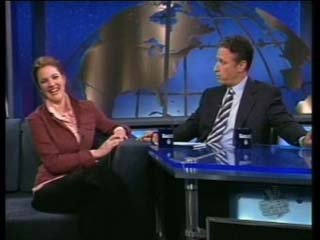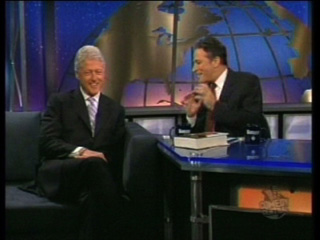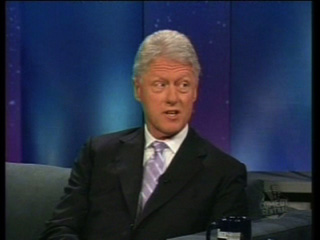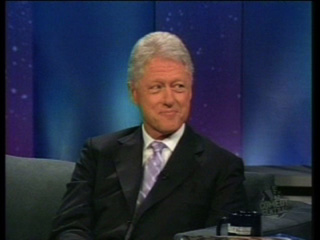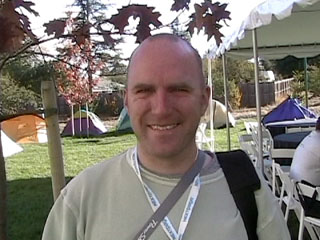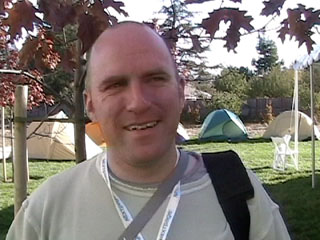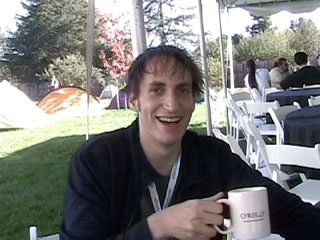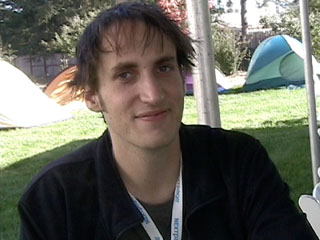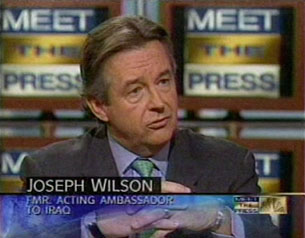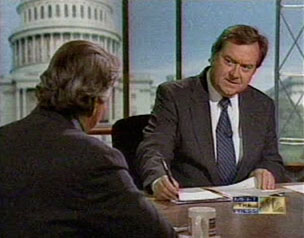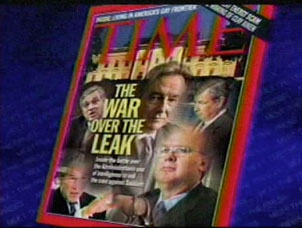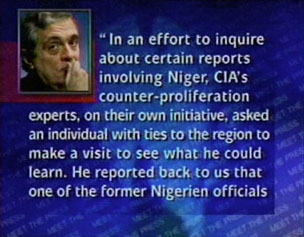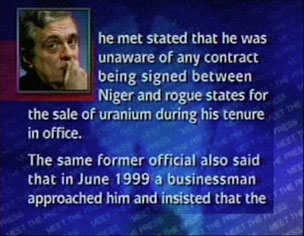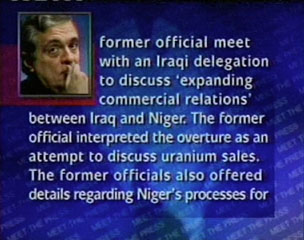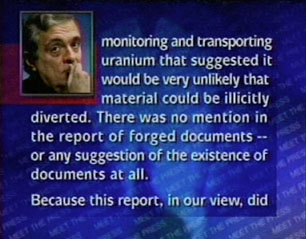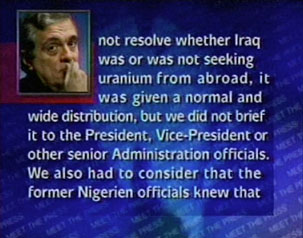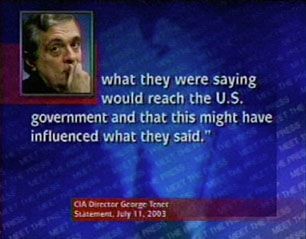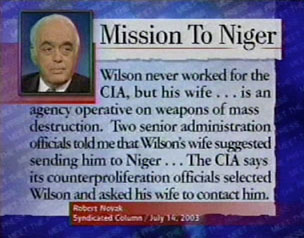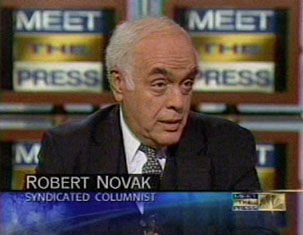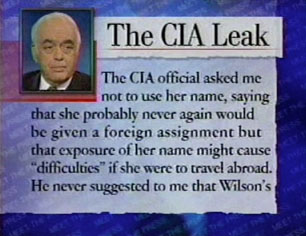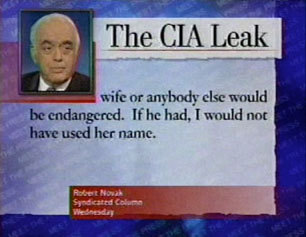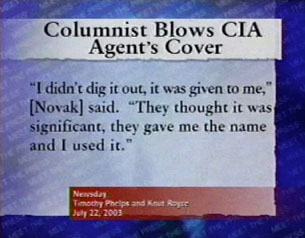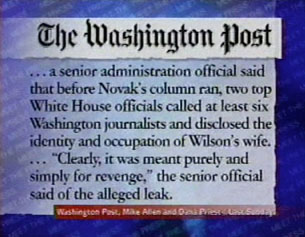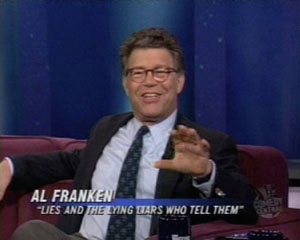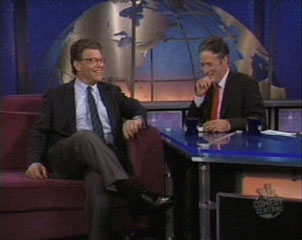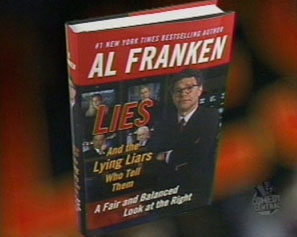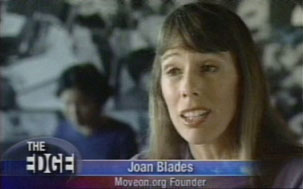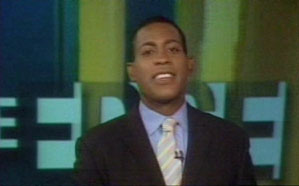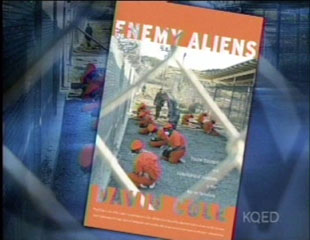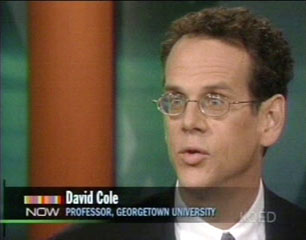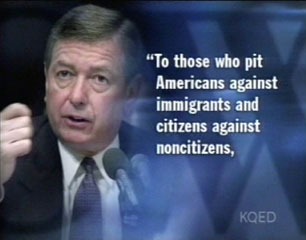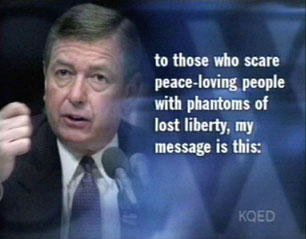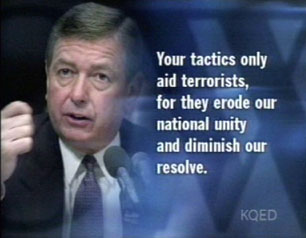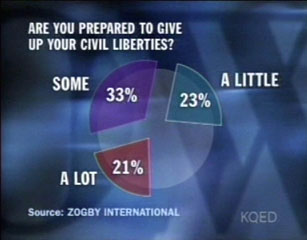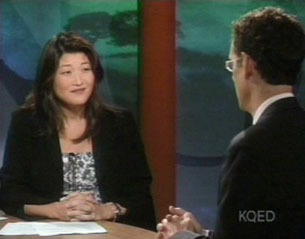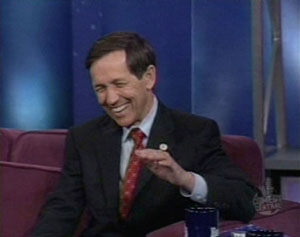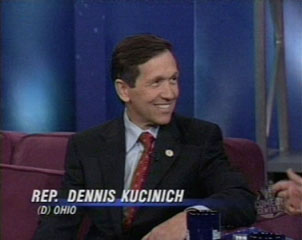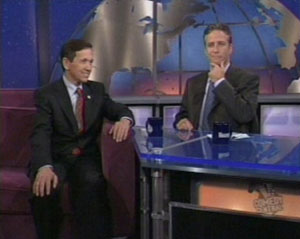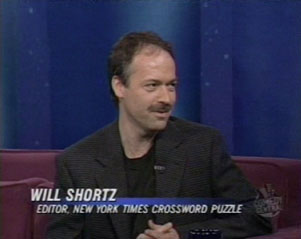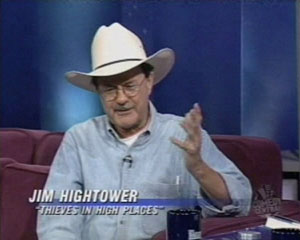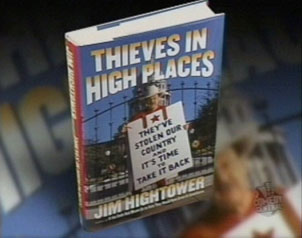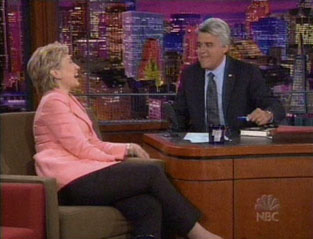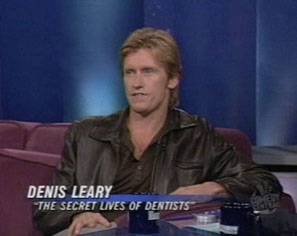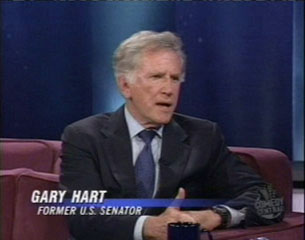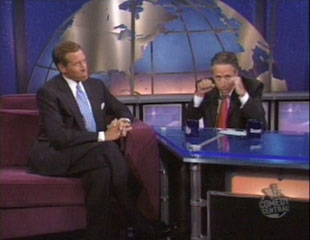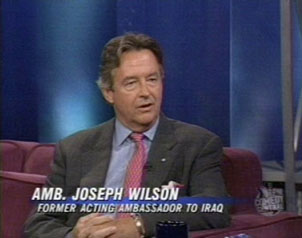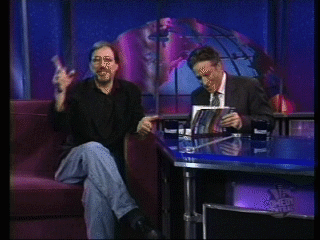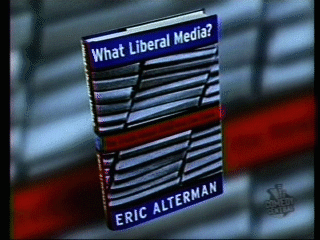Jay and Ryanne came over to my place and interviewed Jamais a couple months ago.
Here's the end result:
 |
|
The exhibit features Spot Draves, Georg Janick, Feathers Boa, Bryn Oh, Adam Ramona, Aiyas Aya, Ub Yifu, and Crash Perfect.
(Sponsored by The Wishfarmers.)
Keep an eye on my Node Zero Gallery Category for more interviews with artists all month long.
The interview below is the first of several parts. It took place on January 30, 2008.
Spot: I've been programming computers my whole life, and this is the distillation of all of that experience. So yeah, they're not supposed to look like sheep. They're not supposed to look like anything at all. In fact, I don't even really control what they look like specifically, because they are created by this Internet distributed cyborg mind, and they're created by everybody who's watching them.
The reason they are called the "electric sheep" is because it's the computer's dream, and not just your computer, but like THE computer, like the gaian All computers, on the internet, connected, and all the people behind them, as one entity.
What I did was, I wrote the software, and developed the algorithm. And it's based on a visual language, which is a space of possible forms. And then, all the computers that are running the software communicate over the internet to form a virtual supercomputer that then realizes the animations. It takes an hour per frame to render.
Now, the one in Menlo park is double the resolution and six times the bandwidth.
Lisa: This is something in RL that people can go in the physical world and see?
Spot: Yes. It's on a flat panel with a frame around it that hangs on the wall. A 65" plasma screen.
Lisa: Where does that live?
Spot: The company is called Willow Garage.
I designed the frame and had it built, and had it installed, and that one has some special electronics so that it shuts down when nobody is watching, to save power.
Lisa: So this running off a computer? (We are watching as he projects on to my livingroom wall.) So it's basically a screen that's hung on a wall that's then attached to a computer that's running the art?
Spot: That's right. And that one has a terabyte database. This one is 100 gigabytes.
Lisa: So it's always generating new art? Or is it sort of recycling through?
Spot: No. What it does is this. See, because it takes an hour to render each frame, and there are 30 frames per second and so this is far from real time. I mean, what is that, a factor of 100,000? So you can't generate it in real time, and that's part of the inspiration for the virtual worldwide supercomputer.
Lisa: Things the "hive mind" has already created.
Spot: Yes.
Lisa: A snapshot, if you will?
Spot: Yes, and then I edit it. Let me tell you more about the process, which is multifarious and complicated. The bottom line is that it all gets stored in a video graph, which is on the computer, and played back. It's in 1000 pieces that play back in a non-repeating sequence. So it's infinitely morphing, and non-repeating, but you do have refrains. So images, sheep, do come back, but then after you see a sheep, it will go and do something else.
So like, watching the video, there's an algorithm that is running live, as you watch it. But the algorithm is like walking in a garden. Ya know, like an english garden with paths? As you walk along the path you see pretty flowers, and then you come to an intersection, and you have your choice of which path to take next. And so, more or less, if you wander at random, you will come back and walk the same path twice, and see the same thing twice, but, then you'll go and you'll do something different. So, that's cool because there are some parts of the garden which are really remote, and the only way to get to them is by a certain sequence of turns, and so there are some sheep which only appear extremely infrequently, like, ya know, the rare, special ones and so, in order to see the whole thing, you'd have to watch continuously for months.
So, this one, in this 100 GB one, there are 1000 clips. If you played those clips/sheep (I'm sort of switching back and forth on what they are called), if you played them all end to end, it would be like 18 hours. So as far as a human's concerned, it's infinite.
Lisa: You went to Carnegie Mellon right?
Spot: Oh yeah - It really affected me. That's Hans Morovec's Homeland. I was really immersed in those ideas when I was a student.
Lisa: You were a student in Artificial Intelligence there?
Spot: Well, I studied metaprogramming and the theory of programming langugages. So, what I did was I created languages for creating visual languages for doing multimedia. Basically, a special programming technique for doing multimedia processing -- like real time video 3-D computer graphics, with audio, and in particular, in a feedback loop with a human being.
And so, I didn't create a language. I created a language for creating languages, because I wanted to make it easier for everybody to create their own language. And so you'll get these towers of languages, and it's almost, basically like virtual reality, where you have realities within realities, where you can have languages within languages.
Lisa: And they all fit into the same architecture?
Spot: Yeah. So you can analyze these things coherently, and you can create programs which process and optimize these structures.
The genetic code is now in XML. The language, was the key innovation.
Lisa: Wow. What did you use before the XML? What else were you doing that with?
Spot: Before XML, for this genetic code, I just had some stupid text format which I made up myself.
Lisa: Ah. I see. But it was hard to do the kind of architecture you described, without having XML right?
Spot: Oh well that stuff I did more with LISP. Scheme in particular. Scheme is just a version of LISP.
Lisa: Interesting...
Spot: So the visual language is the genetic code. It's the mapping from the genotype to the phenotype. And so each of the sheeps has virtual DNA that controls how it looks and how it moves. And everything you see is an expression in that language. And then, it's a continuous language. It has a lot of special properties, because it was designed to be able to do this. It's made with floating point numbers, and part of the idea behind this whole thing is that life and its existence is continuous.
To be continued...
This post and all the art in it is under the same Creative Commons Attribution 2.5 Generic license, as is all of Spot's art.
Wow my worlds collide again. I just met Aubrey last October.
Now, he's on the Colbert Report.
(sidenote: I have an 45 minute interview of my own with him that I'll be putting up soon, but I really wanted to present it just the right way. I told him I wanted the "homer simpson version" of what the hell he was talking about, and by golly, I think he gave it to me :-)
Stephen's skepticism actually does a really nice job of framing Aubrey arguments too! Nice work Stephen!
You can find out more by picking up a copy of Aubrey's book too.

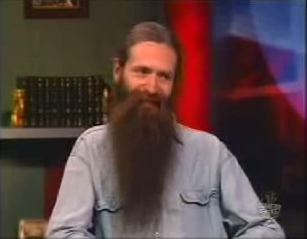

Learn more about Aubrey's SENS platform.
All hail The Colbert Report.
 |
I tracked Ben Goertzel down at the Virtual Worlds conference on October 11, 2007. Ben's company, Biomind, attempts to address the current disconnect between three different scientific communities that really need to work together in order to find answers: biologists, bioinformaticists and the artificial intelligence community. As a result of this disconnect, biologists are not making the most out of their research data. |
After talking to him an hour about the Novamente Cognition Engine that will soon be used in conjunction with Second Life avatars and an HTTP proxy created by the Electric Sheep Company to train dogs in Second Life, Ben casually mentioned a couple of examples of the technology of his other company, Biomind, that "blew my little (bio)mind" when I learned about what its software has been learning.
We'll get to training dogs in Second Life soon, I promise. But this, arguably, is a little more time sensitive, so I wanted to tell you about it first.
Ben: Well here's my vision - the vision I had in 2001 and 2002 when I got the idea to start Biomind. I could see that experimental biology technology was advancing like crazy, but biologists' ability to understand the data produced by their machines just wasn't keeping up. To put it simply, "What if we could feed all this data into an AI and have the AI really understand it, and produce the biological and medical answers we need?"
By this time, biologists have discovered an incredible amount of data that's barely understood, and a decent fraction of it is online. Talking just about the data that's already there online, right now - my feeling is that if you were to feed it all into a big database, and let the AI analyze it, and see what discoveries it comes up with, you could discover all sorts of cures to diseases. - Ben Goertzel, Biomind/Novamente
Biologists are great at running experiments, but typically they'll gather a huge mass of data from an experiment and then analyze it in a fairly simplistic way, one that only mines 1% of the information available within the data they've gathered. Then they'll take this 1% of information and use it to design another experiment. What they're doing works, but not as fast as would be possible with more intelligence applied to interpreting the data the machines spit out.
There are also some specific shortcomings in the standard data analysis procedures they use - especially in regard to the understanding of biological systems as whole systems. The standard data analysis methods biologists use are biased toward zooming in on one gene, one protein, one mutation that makes a difference. AI methods have a lot more capability to understand the interactions between different parts of a biological systems - and it is these interactions that really make life LIFE!
But these interactions are complicated to understand - if I look at the spreadsheet of data coming out of some modern biological equipment (say a microarrayer) I can't see the biological system dynamics in all those numbers ... and conventional data analysis methods can't usually see them either. But AI methods can look at the reams of messy, noisy data and pick out some really important glimmers of the holistic biological system underneath.
Lisa: Isn't this the same problem that bioinformatics is trying solve?
Ben: Yeah, bioinformatics is the discipline that deals with crunching bio data. And it has obviously made huge advances in the last decade. But when you really get into it, almost everyone trained in bioinformatics recently is really trained in very specific stuff - for instance, gene sequence analysis. However, bioinformatics training doesn't include much about data mining, mathematics, or advanced statistics. So the bioinformaticists' training isn't much more advanced than that of the biologists, by and large, in terms of mining the complex interactions and dynamics out of reams of experimental data.
I mean, at Biomind we've been doing specific work along these lines for a while. In a recent experiment, we took three data sets off the web, which are about mice under calorie restriction diets, fed those three data sets into our AI system, and then analyzed them to find out what genes are most important for distinguishing calorie restriction from control. We were able to pinpoint a couple of genes that no one has ever thought were important for calorie restriction before, but I'm quite certain they are. And this is just from three data sets! I mean, if you could feed in tens of thousands of data sets. Even those related to varios aspects of aging and aging-related diseases...
Now, if Biomind was richer, we'd follow this analytic work up with some wet lab work. Mutate those genes in mice. Make some mutant mice. Give some of them a calorie restriction diet, and see what happens. As it is, Biomind is not rich. So we'll just publish a paper and hope that somebody else picks up on it, or maybe partners with us in the future.
On another note, when we worked with the CDC a couple years ago, our AI crunched some of their mutation data gathered from people with Chronic Fatigue Syndrome, and what came out of it was the first-ever evidence that there is some sort of basis for CFS. That paper made a pretty big hit in the CFS community.
And we've done some great work with Davis Parker from the University of Virginia, on understanding Parkinsons and Alzheimer's disease based on heteroplasmic mutations in mitochondrial DNA..
Lisa: When did you do that work?
Ben: The Parkinson's work was in 2004. The Alzheimer's work is current research, but the preliminary results are pretty exciting, and the preliminary indications are that Alzheimers works basically the same way as Parkinsons, but with different genes and mutations involved.
Part One of Two
References for Ben Goertzel Articles and Interviews
This is just cool:
Frank Zappa on David Letterman.

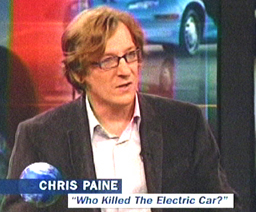
| I knew Chris Paine way back in 1993, when I was working with him on Telemorphix's 21st Century Vaudeville. He was a really sweet, smart, and very creative guy with big ideas about everything. Nice to see him pull it all together to create his little masterpiece, Who Killed the Electric Car?. |
Chris Paine On The Daily Show (Quicktime, 15 MB)
Dabble Record for this interview
Daily Kos dude Markos Moulitsas Zuniga cruised through the Colbert Report last week. (April 6, 2006, I think)
Video-Markos Moulitsas Zuniga on the Colbert Report (12 MB)
Audio-Markos Moulitsas Zuniga on the Colbert Report (MP3 - 8 MB)

He's got new book out called
Crashing the Gate

It's my first new post for O'Reilly's Digital Media website:
How To Shoot Broadcast Quality Music Videos On A Camera Phone
This is a pretty neat story from beginning to end -- a lesson in what can be accomplished when someone sticks to a vision and sees it through to the end. Right on to Blast Records and The Presidents of the United States of America (P.U.S.A.) for taking a chance too!
Check out the Making Of video that Grant let me host, too.
This development is more than a novelty. It's a working demonstration of the natural artistic progression towards the integration of new mobile video technology within existing art forms.I predict that it will soon be commonplace for bands to shoot mobile phone-based video of interviews, practices, performances, songs-in-progress, or whatever, and post it to their websites...
Mobile phone cameras can only record at 1/3000 of standard broadcast quality, and don't capture movement very well. In addition these phones only recorded at 10 frames per second, even though the manufacturer had promised that they'd record at 15 fps.
During the shoot, the phones were so temperamental that they'd just turn off at any point without warning, so Grant had the band play the song 24 times at half speed in order to provide enough footage to edit together one good take of the song.
This is from May 22, 2005.
Video - Howard Dean On Meet The Press - Parts 1-6
Audio - Howard Dean On Meet The Press - Parts 1-6
This is from September 22, 2005. I was interviewed on
Junket 415 -- another of Mondoglobo.net's cool podcast shows.
Here's a
direct link to the show. (My interview starts at 14:23.)
Prozack Turner and Marc Stretch

Here's a short clip (5 MB) explaining how Foreign Legion is anything but dissolved, and the complete interview (22 MB) from last week's SCOUT at the Red Devil Lounge in San Francisco.
I had some interesting conversations with these guys off camera, and I must say, they were mighty real - whether talking about the pros and cons of being signed to a big label (Turner) or comparing the social networking architectures of Friendster and MySpace (Stretch).
Both Zack and Stretch are plannnig to drop back by in on either June 22 or June 29, but nothing is confirmed yet.
These last two shows are going to be special like that -- in addition to the announced performers, there will be a lot of past peeps dropping back by to rekindle...
Here's an interesting article about one of tomorrow night's headliners:
Prozack Turner's Sound Click page.
There are some samples too from his record there.
According to this article, Foreign Legion has parted ways. I didn't know that -- I know both Prozack Turner and Marc Stretch are performing at
tomorrow night's SCOUT!
Taxation Without Representation: When DreamWorks' music division was cannibalized, Prozack Turner had a record but no label. So he released it himself...THE DOMINANT image on the cover of Prozack Turner's solo debut, Death, Taxes & Prozack, is a baseball cap emblazoned with a San Jose logo. Flip the CD over and scan the production credits: Pete Rock, Alchemist, Supa Dave West, Organized Noize, Jake One, Madlib, DJ Design, Jay Dilla. In the corner, a tiny, out-of-focus insignia that resembles the DreamWorks logo teases the eye.
From the packaging, one can infer that Prozack Turner is a San Jose emcee who recorded an album with DreamWorks and hooked up with hotshot producers. That's half the story. The reality? Zack "Prozack" Turner is from San Jose. He was in the local hip-hop group Foreign Legion (with DJ Design and Marc Stretch) that released the excellent Kidnapper Van and Play Tight full-lengths. Prozack was courted by Virgin and Grand Royal but signed to DreamWorks for a four-record deal.
In 2003, he assembled his dream production unit and recorded Death, Taxes & Prozack, with a $450,000 budget. In October of 2003, UMG bought out DreamWorks' music division. Turner's record, due to drop five months ago, was shelved. He got out of his contract, bootlegged Death, Taxes & Prozack and is selling it independently. If you look closer at the DreamWorks logo on the CD, it's jacked up to say, "Out of Work."
"It's totally illegal the way I'm putting it out," Turner admits. "They're like, 'We own this album.' But I created this! It came out of my brain. Technically, on paper, they own the rights, but I held up my end of the bargain. I recorded the record thinking they were going to put it out."
Here's the full text of the entire article in case the link goes bad:
http://www.soundclick.com/bands/5/idcprozackturner.htm
PROZACK TURNER "DEATH, TAXES & PROZACK"
IDC cat# 0010 / DTPO1
Taxation Without Representation: When DreamWorks' music division was cannibalized, Prozack Turner had a record but no label. So he released it himself.
Flow Pro
San Jose rapper Prozack Turner contemplates the music business, his next move and why eating cats isn't racist
By Todd Inoue
THE DOMINANT image on the cover of Prozack Turner's solo debut, Death, Taxes & Prozack, is a baseball cap emblazoned with a San Jose logo. Flip the CD over and scan the production credits: Pete Rock, Alchemist, Supa Dave West, Organized Noize, Jake One, Madlib, DJ Design, Jay Dilla. In the corner, a tiny, out-of-focus insignia that resembles the DreamWorks logo teases the eye.
From the packaging, one can infer that Prozack Turner is a San Jose emcee who recorded an album with DreamWorks and hooked up with hotshot producers. That's half the story. The reality? Zack "Prozack" Turner is from San Jose. He was in the local hip-hop group Foreign Legion (with DJ Design and Marc Stretch) that released the excellent Kidnapper Van and Play Tight full-lengths. Prozack was courted by Virgin and Grand Royal but signed to DreamWorks for a four-record deal.
In 2003, he assembled his dream production unit and recorded Death, Taxes & Prozack, with a $450,000 budget. In October of 2003, UMG bought out DreamWorks' music division. Turner's record, due to drop five months ago, was shelved. He got out of his contract, bootlegged Death, Taxes & Prozack and is selling it independently. If you look closer at the DreamWorks logo on the CD, it's jacked up to say, "Out of Work."
"It's totally illegal the way I'm putting it out," Turner admits. "They're like, 'We own this album.' But I created this! It came out of my brain. Technically, on paper, they own the rights, but I held up my end of the bargain. I recorded the record thinking they were going to put it out."
The major-label experience, piled onto many others, soured him on the music industry. To say that Prozack is going through a transition is an understatement.
"Every independent label [Foreign Legion] ever messed with has stole from us," he says. "Every person who had been my manager has fucked me over. I got sued for 10 grand by some manager. It's such a dirty business. I'm a real honest guy. It's a hard, hard business to be in, especially when you get so close to succeeding. I'm having meetings talking about Spike Jonze directing my music video. Six months later, I'm looking for a bartending job.
"I feel a little jaded. Even on my album, I put all my homies on, breaded everybody up. People got paid more than they ever did in their career. Man, I don't know if I want to be around this any more. It's destroying relationships, too. It's like the music business is a girlfriend I'm in love with, but I know we're not right for each other, and it doesn't work out, and we're fighting and treating each other awful."
It's a shame because Death, Taxes & Prozack is one of the tightest-sounding rap albums ever to emerge from the 408. His flair for bragging and his metaphors ("Wonderful Life," "Feelin My Steelo") have all the subtlety of a steel-toed boot. It's a supremely entertaining record with Prozack using skills, not anger, as his prime motivational tool. And with producer royalty like Pete Rock, Organized Noize and the Alchemist, Turner is sitting on a potential gold mine.
"I'm in New York, standing in the glass booth, and Pete Rock is on the other side about to record me," he remembers. "Even if the album never comes out, I made it. All the people who told me not to do it--'You're not going to make it; you're white; you're from San Jose, the suburbs'--here I am with one of the illest cats. That was an emotional moment in my career."
Along with the label and legal drama, he and Foreign Legion recently parted ways. Just last week, Turner contemplated quitting music altogether and getting a straight job to pay his bills. Then he got a check from one of his Death, Taxes & Prozack distributors for a thousand bucks. And then he got an order from Japan for 400 CDs--an extra 3 grand. The record is also selling in Germany and Australia. This boost, plus working with San Jose production team the Buckle Brothers on new tracks, improved morale and given him incentive to make music.
"I don't know if I'd do another major-label deal again, because I'm pretty bitter," he says. "Things get shelved all the time: Rass Kass, Planet Asia. The music business is in disarray. I'm not mad because they were trying to market me to alternative radio. I know they wouldn't have done that if I were black. I didn't do a rock rap album. It wasn't an angry album. I don't know what they were looking for. But a lot had to do with race."
Race is something Prozack's been examining within the past two weeks, he says. Prozack, who is white, feels labels have a set feeling about him before hearing him rap. "I've been oblivious to [race issues] my whole life. I'm good enough; I'm cool; I do my thing. Every now and then, you get people who hate. I never got that much of it. I listen to my album--it's good. I think if I weren't white, people would take it more seriously. I honestly do. People automatically compare it to Eminem because I'm white, and I don't think it sounds anything like it."
While on the topic of race, I bring up a line in "My Favorite Song": "I'm not Vietnamese, but dog, I be eating cats." When I mention that it might offend people, he says he understands that people might get mad, but he defends his right to mix metaphors.
"It's a play on words," he says. "'I battled this cat.' What culture eats cats? Vietnam eats cats. There's nothing negative about what I said. It's a complete play on words. I have another line where I say, 'I get more pussy than a cat box,' too. But it's a play on words; I don't get any pussy--I got a girlfriend."
He laughs hard at the line. Don't dismiss the fight in this dog, even if he's eating cats.
"I believe in good, and I believe I deserve to win," he says. "If they shut the door, I'm going in the window. If they shut the window, I'll go in the basement. I'm getting in. I'm not going to stop. I'm just as good as a lot of cats."
Here's an interview from the SCOUT show on May 11:
Variable Unit keyboardist Jacob Elijah Aginsky.
Here's a video clip and mp3.

Here's another video and mp3 of an interview with SCOUT guest MC Jaw Prophetic.
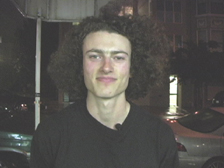
This is from May 4, 2005.
I'm starting to post video and mp3 clips of my interviews with the SCOUT performers over on the Wide Hive Blog.
The first is of Each the Beatboxer. He's really incredible. I've got a clip of his performance around here somewhere...
Each will be performing with Cubik and Origami from 9-10 pm at this week's SCOUT, and he might even jump in a bit with Variable Unit during the night's main set.
Ed note: I'm really having a blast documenting hip hop subculture. I mean, I'm a part of it, I suppose, running a record label and all, but there's a part of me, perhaps the media researcher part of me, that will always feel more like an observer, and an archivist of, this very unique time in our history.
This is from the January 24, 2005 program of Fresh Air with Terry Gross.
It's pretty cool. Colbert discusses his ideology and protocol for comedy. Specifically, what he considers fair comedy, and what kinds of comedy aren't allowed. He has rules. Neat interview. Check it out.
Stephen Colbert On Fresh Air - Part 1 of 2 (MP3 - 26 MB)
Stephen Colbert On Fresh Air - Part 2 of 2 (MP3 - 22 MB)
This is from the February 3, 2005 program.
In this clip, Time magazine's Joe Klein talks about the State of the Union address and the truth behind the Shrub's Social Security overhaul: it's all about benefit cuts, not increased payments due to shrewd investment of private accounts.
Joe Klein On The Daily Show (Small - 12 MB)
Audio of Joe Klein On The Daily Show (MP3 - 8 MB)
Joe Klein:Here's the cool thing about Social Security. Yesterday, before the speech, the White House explains it the "torters," the private investment accounts, and here's the way it works:
You put your money in your own private investment account. And then, when it's time for you to retire, you give a whole lot of it back to the government so that they can dribble out little benefits to you that are the equivalent of Social Security as it now stands.
Jon Stewart:
That's really what this plan is?
Joe Klein:
If you make more than a designated amount, you might get a little bit extra. Yes.
Jon Stewart:
That's it?
Joe Klein:
It's an annuity.
Jon Stewart:
But here's what I don't understand...
Joe Klein:
It's really remarkable.
Jon Stewart:
But how does that save Social Security? Because the government still has to dish out the same amount of money, no?
Joe Klein:
Well, they're going to lower our benefits it was they're gonna actually do, and the President said he would last night.
The strangest thing about this interview with Triad Employee Michael Barbian is that the only damning part of his words is the below quote, where he admits that a recount didn't actually take place in any of the counties Triad services:
Interviewer 1: Did any of your counties have to do the full recount?Michael Barbian: Not that I am aware of.
Otherwise, there isn't a lot there. Apparently, Barbian said a lot more when he testified in Ohio at Conyers' investigative hearings. (More on this coming up.)
This was originally distributed via Truthout. I've copied the videos to my own server, generated and MP3 from them, and transcribed the interview myself (see "more" below).
Video Of Interview With Michael Barbian (6 MB)
Video Of Interview With Michael Barbian (3 MB)
MP3 Of Interview With Michael Barbian (5 MB)
Here is a full transcription of the video located at:
http://video.lisarein.com/election2004/ohioreport/triadtech_100k.mov
Interview with Michael Barbain, Triad Systems Technician.
Words I can't make out denoted with (can't make out) or (?). Periods denote pauses only.
Interviewer 1: Could you ID yourself? I didn't get your ID earlier.
Michael Barbian: My name's Michael Barbian, and I'm the reason we're all here today. I work for Triad Governmental Systems.
Interviewer 1: When you were telling them about the under and over votes, it seems to me, now that I've heard what you've said, that you were just trying to help them so that they wouldn't have to do a full recount of the counties.
Michael Barbian: As much information as possible is what I was trying to provide them with. And that's all it amounts to. It's for elections people to do the best job that they can, and they do a very thorough job. The more information you give someone, the better job they can do.
Interviewer 1: And the information, it sounded to me, unless I've got the wrong piece there. It sounds like the under and over votes per precinct should be information that they had anyway on their computer.
Michael Barbian: It was there.
Interviewer 1: It was on their computer. And then there was that one copy there that was taken back for backup.
Michael Barbian: It's normally not run off. In the last Presidential Election it became an issue in Florida and in this election. It just provides more information. It doesn't affect the outcome of the race, but it's information some counties like to have.
Interviewer 1: So you work quickly with the Board of Elections, trying to help them I mean. You guys are trying to work on this election together.
Michael Barbian: Year round support of elections.
Interviewer 1: So when you heard there was a recount, what did you think your job was gonna be? I mean, did you know you were gonna have to...
Michael Barbian: Same job it always is.
Interviewer 1: Have you done a recount before?
Michael Barbian: Yes ma'am.
Interviewer 1: So...
Michael Barbian: It's just a normal day at the office.
Interviewer 1: How many counties did you go through personally?
Michael Barbian: Probably six. For the recount you mean?
Interviewer 1: Yeah.
Michael Barbian: Six.
Interviewer 1: And which counties. Do you know?
Michael Barbian: Bright (wright?) county, Harrison, (?), Muskingom, and Clark county. I'm not sure...(can't make it out) (Note: I realize that "Bright, Muskingom and Clark aren't counties :-)
Note: Here's a map of the Ohio counties Triad Services.
(PDF, JPEG.)
Interviewer 1: We certainly know more about Ohio counties than we did before, don't we?
Michael Barbian: We always knew. The Board of Elections did a good job.
Interviewer 1: Were you able to help them out at all? Try to help out the other counties -- give them as much information as you could?
Michael Barbian: To answer every question and try to help the witnesses with answering questions for them and educating them on the whole overall process.
Interviewer 1: Did any of your counties have to do the full recount?
Michael Barbian: Not that I am aware of.
Interviewer 1: Thank you very much. (to another person) Do you have any questions?
Interviewer 2: Sure.
Interviewer 2: How long have you been working at Triad?
Michael Barbian: A little over 8 years now.
Interviewer 2: Did Triad do a background check on you when they hired you?
Michael Barbian: I don't know.
Interviewer 2: Okay. How many technicians work for Triad?
Michael Barbian: There are, let's see, we have five.
Interviewer 2: And are you involved in any kind of programming? Or just maintenance?
Michael Barbian: I'm on the technical support side. I don't know how to program. I do tech support for voter registration and ballot counting.
Interviewer 2: And how long to you have to be working there, and how much training do you have to go through before you can start doing what you do now?
Michael Barbian: We work closely. When we bring on a new employee, we don't really turn them loose for about a year or a year and a half...because there are so many things that you have to watch closely. Anytime a new employee comes on, they are watched closely and double checked. All of our work is double checked by Boards of Elections. So they test very thoroughly (can't make it out)...bring anything from our office.
Interviewer 2: So what does that process involve? Does the person just basically tail somebody for a year and a half? And observe what somebody else is doing? How do they earn their money while they're not...
Michael Barbian: They're paid like a regular employee. We put them to work. Normally, once they've watched the process a couple times, then we put them more involved (skip in tape) in overseeing every step of the process.
Back to Interviewer 1: You seem like a senior guy. Have you trained anybody? Have you had anybody tail you?
Michael Barbian: Yes ma'am.
Interviewer 1: Who was that?
Michael Barbian: I worked with one of our current technicians, Brandon, and Jose, one of our other technicians. So they..everyone goes through training. I go through training (can't make it out) something pops up. It's a learning process. Everytime (?) changes or the Board of Elections asks for something new. So every day we always learn something new, and try to help out.
Interviewer 1: Great. Can you give me Brandon and Jose's last names?
Michael Barbian: It's Brandon Sandham (sp?) and Jose Trejo (sp?)
Interviewer 2: How many technicans total did you say you have right now?
Michael Barbian: Five.
Interviewer 2: And you've been with them for how long?
Michael Barbian: Over 8 years. It was eight years I think last week or the week before actually.
Interviewer 2: How long had Triad been in the election business when you joined the company?
Michael Barbian: I'd have to do the math.
Interviewer 2: They started in 1985?
Michael Barbian: 84, 85. (nods head)
Interviewer 2: It is my understanding that some of the software that's used to count the votes now was purchased in 2001? Is that accurate in any way? or...
Michael Barbian: Um. It could of been, but it was the same versions of the program that was used in all of our counties. Some of the counties came on board after, and it's possible. I'd have to look and see which counties...
Interviewer 2: What I mean is that, the software that you guys use was actually purchased in full from a previously existing company?
Michael Barbian: Oh. Not our tabulation. It was from (?) our company wrote it and it's our program. We did not purchase it.
Interviewer 2: So your tabulation program, you guys programmed in-house?
Michael Barbian: Yes sir.
Interviewer 2: And when was that program written?
Michael Barbian: Early 80's. That's when it first got started.
Interviewer 2: So there was no...
Michael Barbian: As far as some of the dates, and when some of the different revisions...I don't know. Before I got there.
Tape ends.
This is from the November 30, 2004 program of "Countdown with Keith Olbermann."
It's available in one big 18 MB file and two smaller files.
Report On Ohio Election and Interview with Jesse Jackson
This is the second of a series of programs covering the Jesse Jackson vs. Kenneth Blackwell developments. Kenneth Blackwell's interview available here.
This transcript is word for word and unabridged.
11-30-04 - Transcript
It is four weeks to the day since the general election here turned George W. Bush to the White House for a second term. Tomorrow will be four weeks since John Kerry conceded. Tomorrow could also be, although the odds may be approximated at a billion to one, the day an Ohio Supreme Court Justice could change all that.
As he concluded his trip through Ohio, Jesse Jackson said its Supreme Court should consider setting aside the outcome there. Tomorrow, a political advocacy group plans to make a similar request directly to that Supreme Court. The Boston-based Alliance For Democracy is planning to file a "Contest of Election" tomorrow. The request requires a single Ohio Supreme Court Justice to either let the election stand, declare another winner, or throw the whole thing out.
The loser of any such decision can appeal to the full court, which, in Ohio, consists of five Republicans and two Democrats.
The appeal and recount process in Ohio was going along without too many people noticing until Reverend Jesse Jackson arrived in Colombus on Sunday. He called for a Federal Investigation of the vote count. He used the word "fraud." Today, he wrote that the election was "marred by intolerable and often partisan irregularities and discrepancies." And last night he was blasted, on this program, by Ohio's Secretary of State Kenneth Blackwell, who insulted him on eight separate occasions although I only asked Secretary Blackwell about Reverend Jackson once.
Reverend Jackson joins us now from Philadelphia.
Olbermann: Good evening sir. Thank you for your time.
Jackson: How are you?
Olbermann: Well, I'm interested in your answers to a series of questions on this subject. There had literally been no official response to the possibility of a recount from any major Republican organization until you went to Ohio. And then yesterday there's a press release calling you a professional publicity hound, and Secretary Blackwell on this show calling you a professional provocateur for hire. And you "ran around the block and tried to get in front of a parade that was already on the march." What exactly did you do in Ohio that stirred all this up?
Jackson: Well, this is November the 30th, and the election in Ohio has not been certified yet. Why has it not been certified? We know that even before the election started, Mr. Blackwell sought to nullify 30,000 votes, saying that they were on the wrong weight of paper. We know that last spring, people could vote in the state, a provisional vote, in their county. He changed that process to voting by precinct. In the middle of the..the balloting places changed and, at the time, it led to much confusion. So you have 155,000 provisional ballots that are in confusion. You have 92,000 votes that are yet to be counted. You have an interesting case in Warren, Ohio, (sp?) where they actually used Homeland Security to lock the press out and to lock independent observers out.
Another thing that also I found striking, was that Ellen Connally, an african-american running for Supreme Court in Cayahoga County, where Cleveland is, carried 120,000 more votes than she had down around Hamilton county and Claremont county (sp?) in the other part of Ohio, she had 190,000 more votes than Kerry in 15 counties.
And you had electronic machines where there are questions about their authenticity. We need a thorough, federal investigation, and then, if the information warrants it, we should then have a recount. And those who ran this election should be recused from managing their own investigation.
Olbermann: The Republicans did make seemingly one unanswerable point on this, and you and others may be critical of the Ohio count, but as the Baltimore Sun quoted John Kerry's chief election lawyer in Ohio as saying "Our eyes have been wide open, and, to this date, we have found no evidence of confirmed election fraud." If there has been fraud, where are the Democrats in response to it?
Jackson: Well, I'm amazed frankly at the silence, really, of Senator Kerry and the Democratic Party. They promised that we would stay in the fight until every vote was counted. They appear not to have been acting aggressively, demanding that real questions be answered. For example, electronic machines. In this case, we have private machines where there is no audit trail. We deserve an open, fair process. Why would we allow them to shift the rules in provisional balloting from county to precinct. The reality is that in Cayahoga county Cleveland and Cincinatti, they've eliminated almost a third of the voters on technicalities. Like 50,000 voters. The 130,000 vote margin of Mr. Bush over Mr. Kerry -- we need to know, through forensic computer analysts, in fact, was there tampering. We need to know. And right now, we do not know.
Olbermann: You said that last Friday night you spoke to John Kerry, and you quoted him as telling you that he was in favor of the investigations of the Ohio vote. Where is he? Why did he concede when he did? And why does the Democratic Party appear to be trying to fly under the radar in terms of Ohio?
Jackson: He conceded in my judgement much, much to quickly, because he conceded before a count was in. And now he says he has some lawyers on the ground, but his lawyers ought to be challenging. Were it not for the Green party and the Libertarians, we would not even have standing in the court of finding out what happened. You look how they have 155,000 provisional ballots uncounted. Look at 92,000 ballots unprocessed. Look at what happened in Warren, Ohio. You look at the electronic voting process where there may have been tampering. We do not know. These numbers are beginning to move real fast. Again, I repeat, when I begin to think about Ellen Connally, and the gap where Kerry got 120,000 more votes than she got in Cayahoga county, then in 15 other counties, she got 190,000 votes less. To me, that's very suggestive. It deserves a thorough investigation.
Olbermann: There are degrees of what could have caused that and the other irregularities that you refer to. On one end of the spectrum, as Secretary Blackwell put it last night, "It's a free and fair election" without significant problems. In the middle, a lot of human and technical mistakes, but they are mostly errors of omission, not errors of comission. At the other end, would be out and out electoral fraud. Where do you stand on that spectrum? Which one of those things do you think happened?
Jackson: It's interesting that Mr. Blackwell is the co-chair of the Bush-Cheney campaign, yet he is the chief person in charge of the process. Now, it seems to me to be unfair for the man who owns the team to also be the chief umpire at game seven of the world series. That somehow that taints the process.
But this matter has not been approached. This Mr. Blackwell in Ohio. Katherine Harris in Florida -- those who run the process should not in fact be an advocate for one party or the other. Which raises another question: We really do need a constitutionally federally protected right to vote. We should in fact have federal supervision over federal elections. We do not have, although people think we have, the constitutional federally protected right to vote. We deserve to move beyond just states rights on national elections.
Olbermann: Well let me see if I can pin you down now on just that part of the question. Do you think there was fraud in Ohio?
Jackson: Well I think so. But we will only know if there is a thorough investigation. There are some huge number gaps here. Why is it that 28 days after the election it has not yet been certified? That's a long time to wait.
Olbermann: Reverend Jesse Jackson, Founder and President of the Rainbow Push Coalition, twice candidate for the Democratic nomination for President. Thanks for your time tonight sir. We appreciate it.
Jackson: Thank you sir.
This is from the November 29, 2004 program of "Countdown with Keith Olbermann."
It's available in one big 23 MB file and two smaller files.
Report On Ohio Election and Interview with Kenneth Blackwell
(Mirror)
This is the first of a series of programs covering the Jesse Jackson vs. Kenneth Blackwell developments. Jesse's interview w/Olbermann the following just went up too.
This transcript is word for word and unabridged.
11-29-04 - Transcript
The Ohio recount now has cousins out west. The Green and Libertarian parties today filed for recounts in Nevada and New Mexico. The complaints are based largely on the absence of paper trails for electronic voting in each state.
Back at the ranch, the word "fraud" has been used on the record by a former democratic presidential candidate about the voting four weeks ago, tomorrow, in Ohio. In turn, the man who used the word was described by local republican leaders as a "professional publicity hound."
Reverend Jesse Jackson spoke this morning in Cincinatti. He had addressed a rally in Columbus yesterday, saying voting irregularities disenfranchised many of Ohio's citizens. He also told reporters "The playing field is uneven. The rules are not public. The goals are not clear."
Cut to live footage of Jesse Jackson:
"We want everybody to vote. And for their vote to count. We can live with winning and losing. We cannot live with fraud and stealing...
Most Americans must know the election in Ohio has not been certified. This is the 28th of November. Twenty-six days later, the election has not been certified because there are patterns of irregularities that are impeding the process."
Back to Olbermann:
While Jackson reiterated the Democratic party line that a different outcome is, at best, an unlikely result of a recount, Jackson had earlier told reporters that he spoke with Senator John Kerry on Friday, and that Kerry "supports the investigation. His lawyers are observing it closely." But the Baltimore Sun quoted Kerry's chief Ohio attorney, Daniel Hoffheimer, as saying "Our eyes are wide open and, to this date, we have found no evidence of confirmed fraud."
Asked why, if Ohio had problems meriting the recount, Senator Kerry had conceded on November 3rd, Jackson was quoted by the Cincinatti Enquirer as saying "Kerry was inclined to believe what he was told. And he was told the election was over. But now we are unearthing information that did not surface at first. I suppose the more information Kerry gets, the more you will hear from him."
Republicans today responded with a news release headlined "Democrats struggle to jusify unneccessary recount." Noting it will cost Ohio tax payers 1 1/2 million dollars and quoting state GOP chairman Bob Bennett as saying "Jackson has a stellar reputation for ignoring the facts and distorting the truth."
The focus of criticism for the Ohio count and legal actions about it, and a recount, is the state's top election official, its Secretary of State, Kenneth Blackwell, who joins us now from Cincinatti.
Olbermann: Secretary Blackwell, thank you for your time tonight.
Blackwell: Thanks for having me Keith.
Olbermann: When the Green and Libertarian parties filed for the recount, I didn't hear anybody in Ohio's government jumping up and down and applauding, but I also didn't hear anybody accusing them of being profession publicity hounds or of ignoring facts. Why the harsh reaction towards the Reverend Jackson?
Blackwell: Keith, I think what happened is that Jesse Jackson ran around the block and tried to get out in front of a parade that was already on the march. We had indicated that Ohio law allows for a recount once the vote has been certified. So the recount is already a determination. You know, so, for him to get out and run around the block and get out in front of the parade probably gives credibility to the charge that, you know, he is a provocateur for hire.
Olbermann: One of his suggestions, and that of some of your critics, has been that there is an attempt to make the window for a recount in Ohio so narrow as to make a recount meaningless. How do respond to that criticism sir?
Blackwell: We are, in fact, abiding by the law, which basically says that once there's a certification, you have five days to ask for a recount. I would anticipate that they will ask for a recount, the two minor party candidates, and they will get it. The fact of the matter is that they are entitled to request a recount. We're entitled to give them a recount. Even though the cost to the taxpayers far exceeds the $120,000 dollars that it will cost the two candidates to ask for one to this count. These are two gentlemen that between them got less than..just a tad more than a quarter of one percent of the vote. They know, the courts know, the people know that they have no way of changing the results as it affects them. They have the standing, not Jesse Jackson, and because Senator Kerry has conceded and has not asked for a recount, he has no standing. I would anticipate that the Electoral College will be held on the 13th of December, and our 20 electorate votes will go to the certified winner.
Olbermann: Then again, as your law gives you the right to certify under the conditions that you mentioned, your laws also say how much a candidate is charged per precinct. It's not like these are the prices being set by candidates.
Blackwell: Oh absolutely. And that's what I said. They are entitled to it under the law. I think the legislature will probably have some work to do. This was a rule that was established in 1956, and the price of ten dollars per precinct was established, you know, back then. They are going to have to make a determination as to whether or not they want to keep at 1956 dollars, or if they really want to have the recount charge reflect the real cost of doing business in the 21st century.
Look Keith, here's the deal. I just heard Jesse Jackson complain about the unfairness and the unevenness of the field. Ohio has a delicately balanced, bi-partisan that counts votes at the local level. I have nothing to do with counting the votes. They're done by the 88 county Boards of Elections. And let me give you a point here to show the duplicity of Jesse Jackson's criticism.
In Franklin county, where Colombus is located, the head of the Board of Elections is an african-american Democrat. Not just any democrat, but the head of the Franklin County Democratic Party. He is overseeing. You know what he said last week? He told Jesse Jackson to stop it. He said "what makes Jesse Jackson think that he would sit quietly and watch the african-american vote be suppressed? Or watch democrat votes be suppressed?
You know, Jesse Jackson is just trying to stir up a hornet's nest. And what I've told people today is that Elvis is dead, and I'm not gonna fret over Jesse Jackson's misinformation and confusion.
Olbermann: As it plays into the recount though sir, are you saying that your office does not anticipate taking any steps to try to prevent a recount in Ohio?
Blackwell: No. We haven't! We've told the two officials..candidates that once we certify on December 6th, they have five days to certify. I mean, to ask for a recount. Once they ask for a recount, we will provide them with a recount. And that's what I've said from the very first indication that they were interested in a recount. Once it was established that they were statewide candidates with standing, our law says that they can ask for a recount. We will regard this as yet another audit of the voting process. The reason it takes us from November the second to December the sixth to certify is because we have a very tedious, very comprehensive process where we audit by precinct, across the state, every vote that was cast to make sure that every vote that was legally cast is counted.
Look, Keith. We have 45,000 square miles of geography in Ohio. 88 counties, and on election day dealing and leading 50,000 poll workers and election officials. They did a great job, and what we are planning to do, in February, in March, is to take a look at how we can improve our system. They reality is that we have 70% of our voters use a punch card system that I tried to change and that bipartisan resistance in the legislature stopped. And so we had the punch card system. We have a system that allows us to manage a free and fair election, free of fraud, free of intimidation, and that's what we delivered on election day, and we're very very proud of it. And we have the most scrutinized election system in the United States, and we have met every test. Every test we have made. And I'm very proud of the 50,000 poll workers and election officials who delivered a free and fair election.
Olbermann: As part of that scrutiny. one of the criticisms regarding the campaign and the election in Ohio that was directed at you personally, that as the state's top election official, it is a conflict of interest, or, minimally, it has the appearance of a conflict of interest for you to have also been the honorary co-chairman of the Bush-Cheney re-election campaign. As Reverend Jackson put it, you may or may not agree with his presence there, but the phrase is certainly interesting: "Mr. Blackwell cannot be both the owner of the team and the umpire." Could those two jobs not be mixed?
Blackwell: Let me tell you. I just told you Keith. We have a bi-partisan system in Ohio where the Hallinan county chairman of the Board of Elections, Tim Berk (Berg?) is also the Democratic chairman of the Democratic Party in that county. The same for Dayton. The Democratic Chairman is the chairman for the Board of Elections in Montgomery county. So I've just given you three counties where Democrat chairmen who were pushing for John Kerry are the chairpersons of the Boards of Elections over our 88 counties. We have a checks and balances system that allows for a bipartisan review, a very transparent system, and Jesse Jackson, let me just tell you, he would like to be the co-Secretary of State for the state of Ohio, but Jesse Jackson has not had the courage or the credibility to run and get elected to "Dog Catcher."
Olbermann: Last question sir. Can you refute or confirm one of the Internet's favorite stories that no one seems to have gotten an answer, that you had a meeting with President Bush on the day of the election in Ohio?
Blackwell: That's just hogwash. Absolutely zero. Not true. And it's the sort of mythology that grows out of, you know, a lot of people with a lot of time on their hands and the imaginations of Jonathan Swift. But it goes with the territory. Like I said, we had 45,000 square miles of geography, 88 counties, board of elections, 50,000 folks that ran a great election on election day. We had a record turnout of voters in Ohio. We had record registration, and I think the facts speak for themselves. Thank you for having me and giving me the opportunity to speak to the truth of the matter.
Olbermann: Kenneth Blackwell. Secretary of State in Ohio. Our thanks for your time tonight sir.
Blackwell: Thank you sir.
This is from the November 9, 2004 program.
Daily Show Interview With Richard Branson (14 MB)
This interview gets really interesting when Jon asks Branson to sponsor a contest to invent something to "get us off the internal combustion engine."
BTW: Branson said he would do it! He also seemed rather preoccupied with the prospect for the rest of the interview. Let's try to hold him to it!
Here's a partial transcript:
Stewart: "What about this: putting up a prize for somebody to invent something to get us off the internal combustion engine? What do you think of that? Get uh, like an X prize type of thing like they did with space travel."Branson: "Hmmm."
Stewart: "What do you think of that?"
Branson: "That makes a lot of sense."
Stewart: "It does?"
Branson laughs.
Stewart: "How 'bout giving me some seed money?"
Branson: (leans back...) "Um. Okay."
Stewart: "What do you think of that? You could set this thing up, and people could..it'd be like a private industry thing. There's gotta be a way. I mean, we can fake diamonds."
Branson: "Um hmmm."
Stewart: "There's gotta be a way we can make fake oil or something. You know what I'm saying? It's just carbon for god's sakes."
Branson: "Water."
Stewart: "Water? An engine that runs on water? Set up a prize!"
Branson: "Well I've just given you the answer. So I want the money."
Stewart: "Or you're gonna do it?"
Branson: "No..WATER?"
Stewart: "Cars run on water?"
Branson: "Yeah. They could do."
Stewart: "What on hydroelectric cells or something?"
Branson: "Something like that. I don't know. I'm trying to get my money back."
Stewart: "I'm telling you something. This could be a great thing."
Branson: "Okay."
Stewart: "Seed money."
Branson: "Alright. Would everybody chip in here?"
Stewart: "YOUR the billionaire!"
Branson: "Alright."
Link to zip file of all November 9, 2004 clips. (39 MB)
The Daily Show (The best news on television.)
This is from the November 4, 2004 program.
Kristol is always a great guest.
Bill Kristol On The Daily Show
This is from the November 3, 2004 program.
Interview with Chuck Schumer - Part 1 of 2 (9 MB)
Interview with Chuck Schumer - Part 2 of 2 (7 MB)
The Daily Show (The best news on television.)
These clips are from the November 1, 2004 program.
Daily Show Comedy Clips and Interviews For November 1, 2004
Included in these (6) clips:
Jon Stewart Telling Us To Get out there and VOTE!
A two part interview with Fox News' Chris Wallace
(where he explains that Fox has a four person panel now that has to decide unanimously before a winner can be declared.)
Kerry and Bush respond to Bin Laden's new tape
Cheney, Chelsea, Bruce and Arnold On The Campaign Trail
A voting report from Ed Helms and Stephen Colbert
The Daily Show (The best news on television.)
These clips are from the October 28, 2004 program.
Daily Show Clips and Interviews from October 28, 2004
Mirror of these clips
(Thanks to Internet Veterans For Truth)
Included in these (6) clips:
-Arafat's fall
-A Red Sox Moment For Rob
-An Interview with poll taker John Zogby (with some good news :-)
-AN EXCELLENT PIECE where Stewart skillfully uses the Shrub's own words against him (shrubisms.mov)
-A film documenting attitudes toward the election in a small town
-Stephen Colbert's "This Week In God"
The Daily Show (The best news on television.)
These clips are from the October 27, 2004 program.
Daily Show Clips and Interviews from October 27, 2004
Mirror of these clips
(Thanks to Internet Veterans For Truth)
Included in these (3) clips:
-Lewis Black on "the undecideds" (a.k.a. "the idiots")
-Another voting fiasco preview highlighting the Repubs strategy on voter fraud
(The Mary Poppins' etc. I mentioned in an earlier post.)
-An interview with Jesse Jackson
The Daily Show (The best news on television.)
This is from the October 26, 2004 program of the Daily Show.
Daily Show Clips and Interviews from October 26, 2004
Mirror of these clips
(Thanks to Internet Veterans For Truth.)
In these (4) clips:
-Interview with Bob Kerrey of the 911 Commission
-The first of several "Fiasco Previews" of the Upcoming Election
-Another Messopotamia episode
-A bit featuring The Shrub and Kerry have pandering to the minority vote
The Daily Show (The best news on television.)
These clips are from the October 25, 2004 program.
Daily Show October 25, 2004
Mirror of these clips
(Thanks to Internet Veterans For Truth)
Included in these (4) clips:
-Coverage of The Shrub and Kerry on morning talk shows
-A little movie on the tax burden of winning one of Oprah's free cars
-A 2 part interview with Madeline Albright
The Daily Show (The best news on television.)
This is from the September 13, 2004 program.
Drew Barrymore On The Daily Show (Small - 17 MB)
I was really impressed with Drew and the movie she made (that she ended up selling to MTV). She's trying to educate youth about voting and make politics hip and sexy. Right on Drew!
If anyone knows where her movie may be online, please let me know.
The Daily Show (The best news on television.)
This is from the October 7, 2004 program.
These files are too damn big. I'm having trouble doing anything with the DV files I'm ripping from .VOB files using MPEG stream. The 4GB files wouldn't import into Imovie. So I had import the DV file into Premiere and then generate these from there.
The result is that they're too damn big. Sorry. Maybe one of you can generate smaller versions from these.
Bill Oreilly On The Daily Show - Part 1 of 2 (51 MB)
Bill Oreilly On The Daily Show - Part 2 of 2 (30 MB)
Daily Show September 2, 2004 Coverage of the Republican National Convention. (mirror)
Includes an interview with John McCain.
The Daily Show (The best news on television.)
Okay I don't have the time I had hoped to present these properly (with lots of commentary and photos and all). But here's another day of RNC coverage...including an interview with whitehouse communications director Dan Bartlett.
Daily Show September 1, 2004 Coverage of the Republican National Convention.
(mirror)
The Daily Show (The best news on television.)
This is from the
August 31, 2004 program.
Ted Koppel On The Daily Show (Small - 10 MB)
mirror of the above clip
The Daily Show (The best news on television.)
Update 7:08 am 9/30/04 - just got boingboinged -- now's the time for those mirrors peeps -- just download from here, upload to your server, and email me with a link) Thanks!
Just wanted to make sure you guys knew these were here.
I never got around to blogging more than a couple of them individually...
Highlights include:
The Shrub Killing Time On A TV Fishing Show
An Interview With Maureen Dowd
Robert Novak Being a "Douchebag For Liberty (Again) Freedom"
(my mistake. no mistake about the douchebag part though :-)
And a really important report from Ed Helms about the organization making calls on behalf of Ralph Nader in order to re-elect George Bush.
(CSE - Citizens for a Sound Economy)
This is from the week of August 23, 2004.
Thanks to Norm Jenson for grabbing this for me. (Due to either TIVO error or user error, I missed most of last week's shows.)
Norm's provided a hi resolution and low res version:
Kerry On The Daily Show (50 MB)
Kerry On The Daily Show (13 MB)
The Daily Show (The best news on television.)
This is from the August 9, 2004 program.
Clinton said a lot of inspirational words in this interview. Namely:
"When you're a democrat, you win when people think."
They also talked about the debunking of the debunking of Kerry's purple hearts, and how it was the exact same disinformation group that attacked McCain in 2000.
Thanks to
Sean Bonner for mirroring these clips for me.
Clinton Part 1 of 2 15 MB (mirror)
Clinton Part 2 of 2 10 MB (mirror)
The Daily Show (The best news on television.)
This is from the June 24, 2004 program.
Michael Moore On The Daily Show
The Daily Show (The best news on television.)
This is from the June 21, 2004 program.
These should be up by 1pm CA time today. (Uploading now.) I've got to run.
Here's the interview with Stephen F. Hayes, the guy who wrote The Connection, the new book claiming that there's a connection between 911 and Saddam.
Turns out that his book is based on a single report by none other than Douglas Feith -- the Shrub's Undersecretary of defense, and one of the most notorious members within the Administration known for helping companies he used to work for to cash in on the Iraqi Gold Rush. (See the Bill Moyers Story all about it.
Bill Moyers On The Insider Business Deals Between Shrub Administration Officials And Iraqi Reconstruction CompaniesSpecifically, between Douglas Feith, the Undersecretary of Defense and several companies (many related to his "former" business associate Marc Zell), including: Zell, Goldberg and Company, Diligence, New Bridge Strategies, Barber, Griffith and Rogers, SAIC (courtesy of current Shrub Administration Official and former SAIC Senior Vice President Ryan Henry), and The Iraqi International Law Group.
Anyway,
Here's the interview in two parts.
The Daily Show (The best news on television.)
This is from the May 10, 2004 program.
McCain On The Daily Show - Complete (Small - 19 MB)
McCain On The Daily Show - Part 1 of 2 (Small - 12 MB)
McCain On The Daily Show - Part 2 of 2 (Small - 7 MB)
The Daily Show (The best news on television.)
This is from the March 30, 2004 program.
Richard Clarke On The Daily Show - Part 1 of 2 (Small - 15 MB)
Richard Clarke On The Daily Show - Part 2 of 2 (Small - 9 MB)
The Daily Show (The best news on television.)
Here's
an interview that was published last month in OpenP2P.com with Brewster Khale.
"Universal Access To All Human Knowledge" is a motto of Raj Reddy from Carnegie Mellon. I found that if you really actually come to understand that statement, then that statement is possible; technologically possible to take, say, all published materials -- all books, music, video, software, web sites -- that it's actually possible to have universal access to all of that. Some for a fee, and some for free. I found that was a life-changing event for me. That is just an inspiring goal. It's the dream of the Greeks, which they embodied, with the Egyptians, in the Library of Alexandria. The idea of having all knowledge accessible.But, of course, in the Library of Alexandria's case, you had to actually go to Alexandria. They didn't have the Internet. Well, fortunately, we not only have the storage technology to be able to store all of these materials cost-effectively, but we can make it universally available. So that's been just a fabulous goal that causes me to spring out of bed in the morning.
And it also -- when other people sort of catch on to this idea that we could actually do this -- that it helps straighten the path. You know, life, there're lots of paths that sort of wander around. But I find that having a goal that's that far out, but also doable, it helps me keep my direction, keep our organization's direction. And I'm finding that a lot of other people like that direction, as well.
Here is the full text of the interview in case the link goes bad:
http://www.openp2p.com/pub/a/p2p/2004/01/22/kahle.html
Brewster Kahle on the Internet Archive and People's Technology
by Lisa Rein
01/22/2004
Brewster Kahle is the founder and digital librarian for the Internet Archive (IA). He is also on the board of the Electronic Frontier Foundation.
The IA started out as just that -- a non-profit organization dedicated to taking snap shots of the entire Web every six months, in order to create a searchable archive.
One of the main goals of the Internet Archive is to provide "Universal Access to All Human Knowledge." It sounds like a lofty task, but Brewster is firmly committed to it, and truly believes that it is achievable. Anyone in his presence for five minutes or more is likely to feel the same way, because his enthusiasm is quite contagious.
Brewster started the IA in 1996 with his own money, which he earned from the sale of two separate Internet search programs: WAIS, which was bought by AOL, and Alexa Internet, which was bought by Amazon. He has been spending his own money to keep the institution going for the last six years. Recently, in the summer of 2003, he was fortunate enough to receive some grants and corporate sponsorship.
Newer IA projects include creating an open source movie archive, creating a rooftop-based WiFi network across San Francisco, creating an archive of the 2004 presidential candidates (offering every candidate unlimited storage and bandwidth to serve up video), and creating a non-profit documentary archive.
Let's Start with the Internet Archive
Lisa Rein: What's the story behind the birth of the Internet Archive? How did it start?
Brewster Kahle: The Internet Archive started in 1996, when the Internet had reached critical mass. By 1996, there was enough material on the Internet to show that this thing was the cornerstone for how people are going to be publishing. It is the people's library. People were using the Internet in a major way towards making things available, as well as for finding answers to things. And, of course, the Internet is quite fleeting. The average life of a web page is about 100 days. So if you want to have culture you can count on, you need to be able to refer to things. And if things change out from underneath you all the time, then you're in trouble. So what traditionally has happened is that there are libraries, and libraries collect up out-of-print materials and try to preserve and make open access to materials that aren't necessarily commercially viable at the moment. The Internet Archive is just a library. It just happens to be a library that mostly is composed of bits.
LR: How did you get the funding for it?
BK: The funding for the Internet Archive came originally from the success of selling a couple of Internet companies on the path towards building a library. So the original funding was from me, based on selling one company, WAIS, Inc. which was the first Internet publishing system, to America Online. And then Alexa Internet, which was a company short for "the Library of Alexandria," to try to catalog the Web. So all of these were trying to build towards the library, and these companies were sold to successful companies and so that gave me enough money to kick start the Internet Archive. At this point, it's funded by private foundations, government grants, and in-kind donations from corporations.
LR: So AOL bought WAIS and who bought Alexa?
BK: Amazon bought Alexa.
LR: What are some of the grants? Didn't you get some good grants lately, during the past year?
BK: Oh yes, we've been very fortunate in this phase of the Internet Archive's life. The Sloan Foundation gave us a significant grant towards helping get the materials up and able to be used by researchers all over the world, and the Hewlett Foundation also gave us a sizable grant to bring more digital materials from a lot of non-profit institutions to give them permanent access.
For instance, a lot of organizations create documentaries that maybe are shown once or twice, but they're not permanently available. But their general approach was to have things to be available. So by having a library be able to digitize and host these materials, we hope to bring a lot of non-profit materials up and out onto the Internet so they can be leveraged and used by people all over the world.
Brewster Kahle speaking at the O'Reilly 2003 Emerging Technology Conference in Santa Clara, CA
LR: How many people work here at the Internet Archive right now?
BK: There are 12 people full-time here at the Internet Archive -- probably 20 if you count, all told. There are a lot of people that come through. We've got a programmer from Norway and a programmer from Iceland here now. We had a programmer from Japan that sort of came through and helped intern and shared the technology that they know and also what we know.
LR: What would you tell somebody that was interested in participating somehow? You're always looking for people to work on projects, right?
BK: We're always looking for help. People are helping in many, many different ways. By curating collections. By keeping good web sites. By making sure that web sites can be archived -- is how thousands of people are helping. But people are also helping curate some of the collections that are here. We have volunteers that are helping with, oh, things like SFLan and some of the technical work that we do. But also, we are growing slowly and we are hiring a few more people -- mostly very technical.
LR: Talk about SFLan a bit.
BK: SFLan is a wireless project that is based around San Francisco. The idea is to experiment using the wireless network to do a rooftop network, to use to use commodity wireless 802.11 WiFi stuff to hop from roof to roof to roof to provide an alternative to DSL and cable for the last mile.
If we can make that both be open and have distributed ownership, then people would own the roadways and they would basically control their network, which is what the Internet really is.
LR: What do you mean by "the last mile," exactly?
BK: Trying to get the last piece from getting from a central location where there might be a fiber that comes to a city, and try to get that distributed so that people in their homes can not only get materials at video speeds, 3-5 megabits per second -- DVD-like speeds -- but also act as servers to make things available to others over the Internet at high speeds.
These are some of the things that are very difficult to do, if not impossible, with the current commercial DSL and cable providers. And we're looking to see how we can not only establish that baseline of video-ready Internet and make it so people can serve video over the Internet, but then, every year, make it better by a factor of two. So the technology follows Moore's Law just like the computer guys do, as opposed to how the telecoms tend to work, which is "here's the same thing, and you'll buy the same thing, and maybe we'll raise the price slightly ..."
LR: And keep paying more for it.
BK: Right.
LR: So you're looking for people with rooftops?
BK: We're looking for people with rooftops. And especially people that can buy a node. A node costs $1,000, and that's a little Linux box with a directional antenna.
LR: Is that a node right there?
BK: This is a node right here (gestures). So this is an SFLan box. This is a directional antenna that points upstream back to a node that's closer to the Net. This is an omni antenna. So anyone who can see this can be on the Internet for free.
And this is a Linux machine that's got a CompactFlash card as its hard drive, and two radios. And you get a wire that comes down into your house, which is the way that power is brought up to this machine. And also, you get bandwidth within your house or office.
There are about 23 of these around San Francisco on rooftops now, and we're actively deploying new software. Cliff Cox up in Oregon is doing a lot of the software development and also hardware development. He's actually the guy that sells these things for $1,000. So Internet Archive's participation is to help fund the project to get it kick-started, and to try to get some active roofs up and running.
LR: How does the Internet Archive decide about implementing new technologies? What's your philosophy about implementing new technologies?
BK: The Internet Archive is extremely pragmatic about new technologies. What we tend to do is look at the least costly, both in the short term and long term. So we are frugal to the core.
We run currently about 700 computers. They're all running Linux. We don't have any dedicated routers. We just use Linux machines. We use the same Linux machine over and over and over and over and over again. Jim Gray's model -- he calls it the "brick model." So we just use Linux machines stacked up, and even though they might be storage machines, or CPU machines, or running as a router, or running as a load balancer, or a database machine -- they're all just the same machine. What we've found is that it allows us to only have one or maybe just two systems administrators being able to scale to many hundreds and, we hope, a few thousand, machines, by having such a simple underlying hardware architecture.
Because we operate on these machines stacked up, we tend to do everything based on clusters. Because our amounts of data are fairly large. We have, oh, several hundred terabytes at this point -- three, four hundred terabytes of materials, and it's growing a lot. So it's difficult to process these if you have to go through just one machine, and a lot of proprietary software is licensed to just be on one machine, or it costs per each.
Open source has the ability that you can go and run it on as many machines as you want. Because we run things and we do data processing and conversions on ten machines or a hundred machines at once, we find that open source is often the most pragmatic, least costly way to roll. We also find that it's easiest for other people to copy our model if we use open source software, so we tend towards using open source software, because we'd like anything that we develop to be actively used by others readily and easily.
LR: How much do you test before going live with new services and things? Do you do a lot of testing?
BK: Do we do a lot of testing? I'd say we do a lot of progressive rollouts. We do testing in-house, but you can only go so far, and then you bring on some number of your users and bring things out. I'd say we're less testing-oriented. We're less service-quality oriented than a lot of places, because we're researching. We're trying to push the edge. So we try to make sure our data is safe, but if there happens to be a hiccup, we are very public about that, and we're looking for help from others to help us resolve these and find them. So I'd say we're not like a commercial company doing lots of in-house testing and rounds and rounds of beta testing, because we only have 12 people to run all of this.
LR: Can you remember a specific situation where the technology could have gone one way or the other, and you decided on a certain way over another way, and why? When there's a fork in the road, what process do you go through to decide which way to go?
BK: Boy, when there're different choices of which way to go, you find that one of the lead motivators in terms of how we decide which way to go is which way people believe it should go. People are always open to testing and pushing back and saying, "Why do you think that's true?" Especially if we've tried going down that road before.
Let's take RAID -- Redundant Arrays of Independent Disks. The idea is to run, say, four disks or eight disks as a cluster of disks so that if one fails, it has the information on the other ones, so that it doesn't fail, so you can replace the disk and be able to keep going. Every few years we think that this is the right thing to do, and every few years, we find, unfortunately, that it is the wrong thing to do.
But it doesn't seem to keep us from trying again. Every so often we think, "Okay, they must have fixed the bugs," and that the software must be more reliable, or the controllers must be more reliable, and we'll go and put some number of machines into this new structure and then watch them for six months to a year to sort of see, "Does it work better or worse than what we were using before?" With RAID, we've found with two major tests of RAID that it's been a loser.
LR: Why? What goes wrong?
BK: We're not exactly sure, but it looks like the RAID controllers are just not debugged very well. The software isn't debugged. The hardware isn't debugged. There are failure modes that fall outside of there. "Oh," (supposedly) "if one disk just goes completely corrupt, then you can replace it and everything's fine." Well, we've found out in the latest Linux release that if two disks just hiccup slightly, then it gives it up for lost and it says, "You lose all your data," and so we've had to spend months then going back and decrypting all of the Linux RAID controller file system to be able to recover all of the data that you can actually recover. So I think it's just bad implementations based on not being able to get the reliability up, based on not having enough test cases.
We go along with Hillis' Law. Danny Hillis was one of the great computer designers of all time, and his approach was to have large numbers of commodity components; that basically, price follows volume. So if things are made in more volume, the price is lower. You can say, "Duh. Obviously." But it's amazing that most people don't follow this. Particularly that the price goes down when there's more of it made. You want to use things that cost less, because you might get more gigabytes per hard drive if you're using commodity components, as opposed to specialty components.
But another corollary of this is that "reliability follows volume." That things that are made in large volume have to be more reliable, at least in the long haul, otherwise the company that's making them would go out of business because they'd have too many failures. Another way of saying that is that Toyotas are more reliable than Ferraris. Even though a Toyota might cost one-tenth as much as a Ferrari, they are probably on the road more often. The coupling of this is that if you want a reliable system, and you want one that doesn't cost that much, go for high volume, if you want it available, reliable, etc. And so we find that technologies that are commodity and made in high volumes work better.
Tomas Krag
Wireless Networks as a Low-Cost, Decentralized Alternative for the Developing World
Informal and wire.less.dk are working to promote the use of wireless technologies (mainly 802.11) in the developing world. We are planning a Wireless Roadshow to teach local technology NGOs how wireless technologies can be used to bring Internet and intranet connectivity to those parts of the world not included in the plans of the commercial telecommunications companies.
O'Reilly Emerging Technology Conference
February 9-12, 2004
San Diego, CA
LR: When you say "commodity," you mean "off the shelf," or COTS products, right?
BK: Yes.
LR: Let's talk a little bit about your philosophy now. Could you discuss what you mean when you talk about "Universal Access To All Human Knowledge?"
BK: "Universal Access To All Human Knowledge" is a motto of Raj Reddy from Carnegie Mellon. I found that if you really actually come to understand that statement, then that statement is possible; technologically possible to take, say, all published materials -- all books, music, video, software, web sites -- that it's actually possible to have universal access to all of that. Some for a fee, and some for free. I found that was a life-changing event for me. That is just an inspiring goal. It's the dream of the Greeks, which they embodied, with the Egyptians, in the Library of Alexandria. The idea of having all knowledge accessible.
But, of course, in the Library of Alexandria's case, you had to actually go to Alexandria. They didn't have the Internet. Well, fortunately, we not only have the storage technology to be able to store all of these materials cost-effectively, but we can make it universally available. So that's been just a fabulous goal that causes me to spring out of bed in the morning.
And it also -- when other people sort of catch on to this idea that we could actually do this -- that it helps straighten the path. You know, life, there're lots of paths that sort of wander around. But I find that having a goal that's that far out, but also doable, it helps me keep my direction, keep our organization's direction. And I'm finding that a lot of other people like that direction, as well.
LR: Do you have an overall philosophy about technology and the direction in which you'd like to see it go?
BK: I don't really have a philosophy about technology. I have a philosophy of what future I want to live in, which is probably more of a social and cultural issue than it really is a technological issue. And socially and culturally, what I want to grow up in -- and have my kids grow up in -- is a wonderful flowering of all sorts of really wild ideas coming from all sorts of people doing diverse and interesting things.
What I'd really like to see is a world where there's no limitations on getting your creative ideas out there. That people have a platform to find their natural audience. Whether their natural audience is one person, themselves, or a hundred people, or a thousand people. Try to make it so the technologies that we develop, and the institutions we develop, make it so that people have an opportunity to flower. To live a satisfying life by providing things to others that they appreciate.
And I think our technologies right now are well-suited to doing this in the information domain. In the information domain, we can go and offer people an ability to publish without the traditional restrictions that came before, and to help, with these search engine technologies, to help them find their natural audiences. And so people out there aren't surrounded by stuff they don't want. That they find that the music recordings they want and the video recordings they want, even though they're made a half a continent away, and there are only a hundred other people that also really like that genre.
LR: What kind of projects are you working on with the Library of Congress?
BK: We've been working with the Library of Congress over the last three or four years to help archive web sites. They've got a mission to record the cultural heritage of the United States -- actually also, Thomas Jefferson gave them, more broadly, "the world." And now that publishing is moving, or a large section of publishing, is moving on to the Internet, we've been working with them as a technology partner. They do the curation, and we do some special crawls.
Our first project with them was the election in the year 2000. The presidential election. And they selected a set of web sites, and we crawled them every day to try to get a historical record, and then the Internet Archive made them available to the world to see and use, to see if it was useful to people.
The Library of Congress is trying to move into the digital realm, and they just got a hundred million dollars from Congress to help do digital preservation, and we hope to be participants as that unfolds. We'll see. But the Library of Congress has got a lot of money -- a 450-to-500-million-dollars-a-year budget. We hope that a growing percentage of that goes towards digital materials, whether working with us or others, than currently, which is I think probably less than one percent.
LR: Earlier you said that one way that people could help was to make their web sites "more archivable," basically. What does that really mean? How would you make your web site easily archivable?
BK: Boy. By being straightforward. I think by keeping things fairly simple. If web sites have sort of straightforward links, then that makes things a lot easier.
LR: What do you mean "straightforward?"
BK: Straightforward URLs. JavaScript that's fairly clear-cut or reused from other places. What we have been really stumped on is sites that need a lot of JavaScript or a lot of programs that are needed to even render the site at all.
Probably one way of finding out is going to archive.org and seeing, "Did we get it right?" the last time. We're continuously updating our tools and trying to make things better. But for instance, we've been having trouble with .swf files, Shockwave and Flash files, from Macromedia. If those files have links to other pages inside of them, we're just not able to find those links, so we can't follow them. We also have trouble rewriting those .swf files so that they point to the Archive's version of the links and not the live Web's. So we're having trouble with certain complicated web sites. What we'd like to see is more straightforward use of pointers, because the hyperlink is one of the great ideas of the Internet.
Lisa Rein is a co-founder of Creative Commons, a video blogger at On Lisa Rein's Radar, and a singer-songwriter-musican at lisarein.com.
I interviewed Craig Newmark for a project in one of my graduate classes.
Here's an excerpt (complete transcription below):
A: Craigslist, as I think about it more and more. What I've done, not consciously, but just implemented what I could of the philosophy that I guess I've adopted, not consciously, and that seems to be happening by many people on the Net. The deal is that, in the early 90's, a lot of people, including myself, somehow figured that eventually the Net would change the way we do everything. That includes business, it includes socializing -- the way we connect to people, plus online and in real life, and it might also change the world in terms of the way we govern ourselves, the way we get help when a country's in trouble. I even felt that a little bit when I saw the ArpaNet in the early 70's when I was at CASE tech. And this was pretty good.
And nowadays, after the bubble is over, we now see that the Net has started to change everything. It's changing the way we do business in a number of areas. It's changing the way we socialize in a number of ways, particularly dating and so on. The ubiquity of digital cameras has also accelerated online dating, and we're now seeing, or beginning to see, the Internet changing the way we govern ourselves, at least in the U.S. The Net has strongly influenced the way the Dean people are doing their thing... another way to look at it is, in the early 90's we had this technology we think is going to change the world. We had this bubble, which distracted a lot of people with a lot of money and, on the down side, the bursting of that bubble lost a lot of people jobs and lost a lot of people their retirement money. On the positive side, this world-changing, democratizing technology got developed a lot faster than otherwise. It got deployed a lot faster than otherwise. A lot of people go trained in that technology throughout the world who are, in my fantasy at least, now going around the world changing it. That's not bad.
Q: Do you purposefully use technology to change the world?
A: That wasn't my vision originally. I just wanted to connect better with people. To let them know what's going on. To hear about what's going on, and that worked pretty well. Doing this has helped me realize that we don't save the world with big deal social activism normally. We change the world through many, many little acts of good will, and I just provided a platform where people can in fact implement many thousands or millions acts of good will. We're not the only ones, but, you know, we do a good job of it, and we're growing.
Here's the complete interview:
Q: How did Craigslist first get started? It was an event list, right?
Craig: 1994. I was at Charles Schwab. Evangelizing the Net and saying that the brokerage business would work that way someday. I saw a lot of people helping each other out, particularly on the Well and Usenet news groups, and figured "well, I should do some of that." So, early '95, I decided that I would start sending people notices about cool events, usually ones that involved arts and technology. And from there, via word of mouth, the news of the list spread. People wanted to be added. People wanted more stuff like jobs or stuff to sell posted there. And then I said "how 'bout apartments?" and it just grew like that. People wanted more, had suggestions. We did it. And that's the pattern to this day.
Q: What technology did you originally use for Craigslist?
A: Originally, it was borrowed kind of stuff. Simple cc: lists for email. That broke in the middle of '95. Started using majordomo by virtue of a friend's donation. Then I realized I could write code to turn the email logs into web pages. Used Perl for that. Ran on friend's machines. Linux servers usually. At one point we actually got a cheap Sun/Solaris machine, but that lasted less than a year. And from there just went on to Linux systems. Now using all sorts of open source. Apache, MySql, Squidcache, Qmail, and lots of Perl.
Q: That was what you used then? Or what you use now? Don't you have more sophisticated filtering and things?
A: Nowadays, we use all open source stuff. Everything we do is custom made beyond that. But we only switched over to a real database in late '99. Prior to that, I actually used a simple old email tool called "Pine" to manage the contents of those log files. They were effectively our database then, which is crude but effective in a very deep sense. Pine as a mail tool is really good. It's a text kind of tool, but it operates for me better than anything point and click.
Q: What made you decide to go to a real database from the Pine system you were using?
A: We figured that using Pine to manage email logs was going to break down fairly quickly as volume grew. It's just not a very efficient tool for anything but a very tiny database. And it was still kind of tiny in '99. Now we have going on about 1.5 million postings every month.
Q: And how many did you have in '99 before you made the switch? Like at what number did you decide "we can't do this anymore?"
A: I'm honestly not sure, but it would be I think in the thousands -- something like that. That was just one city back then, and now we have 23 cities with an expansion scheduled very soon, and that may add, depending on, well our guess of what we can take, we might add anywhere from 4 to 20 new cities.
Q: In the United States?
A: United States and maybe a few beyond. Maybe Canada. Maybe a little Europe. We're in London now, which has stabilized at about 800,000 page views a month.
Q: And what database do you use?
A: MySql.
Q: How do you feel in general about implementing new technologies?
A: Some of the new software technologies, particularly Java-based, are exciting. Some of the possibilities intrinsic in social software, reputation management, are pretty exciting, but first we got to do basics, and we got to do basics right. We have to do what people need from us, and we have to keep it really fast. That's more important.
Q: Than implementing a new technology just cause it's neat?
A: Right. We're not interested in technology just because it's cool.
Q: Can you think of a situation in the past where you implemented a new technology and thought it was going to help, and then it ended up creating more obstacles, and you ended up going back to whatever you were originally using?
A: Well, since we have introduced new function, new technology, carefully and gingerly, we've only had one setback. In the middle of 2000, we anonymized all postings. That is that we implemented an email relay system and applied it to everything where it said "anon-number@craigslist.org," like "anon-6073@craigslist.org." Again, that helped preserve people's anonymity in personals, plus, if a spammer gets a hold of that, well, it will expire soon.
So as a mechanism for minimizing spamming, that worked pretty well. But, a lot of people liked seeing other email addresses there, so we backed out of implementing that for everything. And now, that's an option. I think that's the closest we've ever come to backing out of something....Oh, also, at one point, I did use some Java servlets for some things, like subscription management, but the big problem back then was that the Linux libraries for Java, specifically involving networking, were flaky. But this was in 1997, when servlets were just in alpha mode.
Q: So you ended up...?
A: Everything's in Perl now. In fact, most of it's migrating to be ModPerl.
Q: So when you did that Java servlet thing, you just went back to Perl, because of the Linux libraries?
A: Yes.
Q: Can you think of a specific situation, again, where things kind of forked? I'm looking for a situation where there were a number of different options, and you ended up choosing one of the others and why?
A: Very little of that actually happened. The only such choice that comes to me is when I decided on a directory structure where postings would go after I generated them, even for different parts of the bay area, now doing parts of New York City. And I made a decision then, which, well, looks wrong now, though we're still not sure, but we're sticking with it just because it's not worth changing.
Q: Could you elaborate?
A: It just has to do with using separate directories for each sub area, rather than just relying on posting identifiers to differentiate postings in much bigger directories. And this gets into the arcana of Unix and Linux systems, and it's just a detail which no one else, you know, no one sees, but I've agonized over in the past.
Q: What have you been agonizing over?
A: Well, it's just the use of an extra level of subdirectory in path names for postings in the Bay Area or New York now, and it just goes down a level deeper than I might have chosen otherwise.
Q: So what are the pros and the cons of doing the subdirectory thing?
A: In the subdirectory case, I thought it might be faster since Linux systems, Unix systems are to be better at more directories with smaller numbers of files, as I recall. I could be wrong about that, and the tech people talk about it, but I haven't thought about the issue for a long time.
Q: So that's the pro. What would be the con of doing that?
A: Don't know offhand. I've forgotten most of the issues.
Q: How involved are other people in your decisions at Craigslist? And again, we've been talking about the technology, but include the social aspects too in your answer.
A: For the most part, day-to-day decisions are made by the people who have to implement them, which is to say the tech people, the billing people, and the customer service people. So we've driven decision-making power down to the line workers. Jim and I will still make overall directional decisions, but often only after soliciting feedback from the team and from the community.
Q: How many people do you have working for you now?
A: There are a total of 13 of us right now, and I'm pretty much positive that we'll have one more tech person rejoining us in a couple weeks.
Q: Now is that less than you used to have?
A: Yes. I think we've had 18, maybe 19 at most.
Q: So you had to scale down from before?
A: We did scale down, especially as we entered the recession after the bubble burst.
Q: Do you have any kind of overall philosophy? We touched on it a little bit before when we talked about new technologies and how it's better to keep things going and maintained well than to implement new stuff kind of for the sake of itself...
A: Do you mean the philosophy of Craig's list? What would you like?
Q: I guess social philosophy...
A: I just realized that I have a number of books that pertain...Like, there's a number of books on networking theory, like there's 6 degrees there, "Linked" by Barobasi..there's Smart Mobs...a book called Sync...
Q: I'm more interested in your philosophy...
A: Those have influenced me though.
Q: Oh okay.
A: Craigslist, as I think about it more and more. What I've done, not consciously, but just implemented what I could of the philosophy that I guess I've adopted, not consciously, and that seems to be happening by many people on the Net. The deal is that, in the early 90's, a lot of people, including myself, somehow figured that eventually the Net would change the way we do everything. That includes business, it includes socializing -- the way we connect to people, plus online and in real life, and it might also change the world in terms of the way we govern ourselves, the way we get help when a country's in trouble. I even felt that a little bit when I saw the ArpaNet in the early 70's when I was at CASE tech. And this was pretty good.
And nowadays, after the bubble is over, we now see that the Net has started to change everything. It's changing the way we do business in a number of areas. It's changing the way we socialize in a number of ways, particularly dating and so on. The ubiquity of digital cameras has also accelerated online dating, and we're now seeing, or beginning to see, the Internet changing the way we govern ourselves, at least in the U.S. The Net has strongly influenced the way the Dean people are doing their thing. Possibly Clark and Kerry. In addition, it's started to influence the passage of law. For example, the Financial Privacy Law passed in California was influenced this way. Same is true of in California of the anti-spam law. And I may end up working more with Consumer's Union on this because they're starting to put a lot of energy into this. Maybe I'll have to give AARP a call too, since I'm a card-carrying member. AARP being the American Association of Retired People.
Q: You're not going to retire anytime soon, are you?
A: You can join as early as 50. And I wanted to be a card-carrying senior citizen.
Philosophy -- another way to look at it is, in the early 90's we had this technology we think is going to change the world. We had this bubble, which distracted a lot of people with a lot of money and, on the down side, the bursting of that bubble lost a lot of people jobs and lost a lot of people their retirement money. On the positive side, this world-changing, democratizing technology got developed a lot faster than otherwise. It got deployed a lot faster than otherwise. A lot of people go trained in that technology throughout the world who are, in my fantasy at least, now going around the world changing it. That's not bad.
Q: Do you purposefully use technology to change the world?
A: That wasn't my vision originally. I just wanted to connect better with people. To let them know what's going on. To hear about what's going on, and that worked pretty well. Doing this has helped me realize that we don't save the world with big deal social activism normally. We change the world through many, many little acts of good will, and I just provided a platform where people can in fact implement many thousands or millions acts of good will. We're not the only ones, but, you know, we do a good job of it, and we're growing.
Walter Isaacson is a former chairman and CEO of CNN, the President of the Aspen Institute, and the author of A Benjamin Franklin Reader.
Franklin worshippers such as myself will get a lot of mileage out of this interview. There are some lovely descriptions of my man Ben hanging out and doing cool things up until the day he died.
It made me want to read the book.
This is from the October 22, 2003 program.
Interview with Walter Isaacson (Small - 15 MB)



The Daily Show (The best news on television.)
This interview ran in the May 2003 issue of Japan's
Internet Magazine. (The translation is a little choppy...)
Q: What kind of work was that you did in the CreativeCommons project?
LR: My official title was 'Techinical Architect.' Basically I was the first CTO of CreativeCommons. I did basic reserach and designed architecture with development team. Larry (Lessig) already had an idea of building machine readable licenses, so my role there was to lead to accomplish (the project of) buiding XML licenses using RDF, that is based on right ideologies and is compatible and interoperable with many different systems.
Q: How did you get inerested in XML?
LR: It was in 1997. I was an editor of Netscape World magazine at that time. At a conference in April I met Chris Lilly of the W3C and asked him many questions. He happily answered me, and gave me the draft of XML standard, which was still under development. I had no idea what it was at the time, but got excited about the fact that a standard that everyone could use was getting realized.
Q: What was the situation surrounding XML?
LR: "The Web needs XML" was understood by everyone of the first XML WG, and they guided me. Tim Bray and the older generation who made HTML were very worried about the future of the web. But they also thought that if we can build a legitimate standard as quickly as possible, the web would keep going for a while.
Q: So are you self-taught in XML?
LR: No, not by myself. The whole world was a teacher to me. When I sent out questions in emails to experts all around the world for different themes, most of them replied to me with wonderful answers! I thougt that they felt happy to be asked by a person who really wants to learn that had a serious interest in the subject. Then, as I learned more about the subject more, I became more interested in getting actively involved.
Q: How did you start teaching XML?
LR: Since I was involved deeply, to spread XML to the world became my role. My teaching started in my local community college in Bellevue, WA, and then I also did consulting for corporations. But it wasn't fun to teach students who were told to study by their bosses. Or, I should say, it sucked, and could not wait to go home every day. After that, I started teaching at UC Berkeley extension's online seminars. In 2001, I had more teaching gigs as XML get into main stream, but several gigs were canceled in the middle of the course affected by ecconomic down turn.
Q: How did corporations and universities find you?
LR: UC Berkeley, via Craig's List. Corporations, well, probably they searched on the web. They only wanted some big names. and around that time there were some people calling me the "XML Queen". It was kind of like "hey everyone, here comes the queen to teach you XML" kind of thing...
This interview with Quinn Norton is from October 12, 2003.
Quinn Norton and Ada Norton (Small - 9 MB)
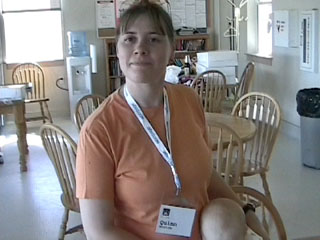
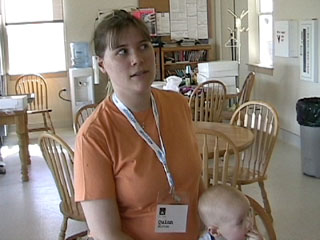
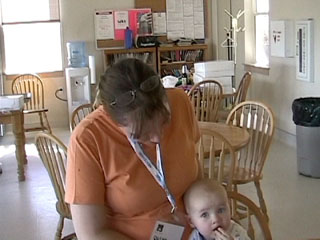
This is from October 12, 2003.
Mark Hedlund (Small - 15 MB)
Sara Winge is the one responsible for a lot of the organizing of the Foo Camp Conference/Party. Tim gave her all of the credit in his interview (not posted yet -- will be linked to from here when I post it).
So you can blame the whole wonderful event on her! Thanks Sara!
This is from October 12, 2003.
Foo A-Z
Sara Winge (Small - 9 MB)

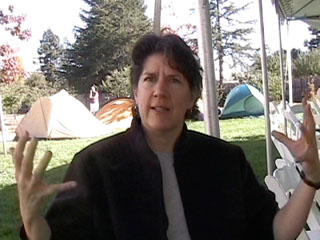
Cameron Marlow is "the Blogdex guy."
This is from October 12, 2003.
Cameron Marlow - Complete (Small - 20 MB)
Cameron Marlow - Part 1 of 2 (Small - 11 MB)
Cameron Marlow - Part 2 of 2 (Small - 9 MB)
This interview with Brian Behlendorf is from October 12, 2003.
Foo A-Z
Brian Behlendorf (Small - 14 MB)
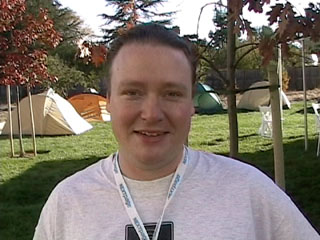
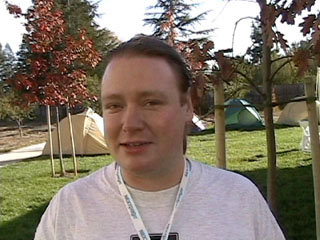
Henry Kissinger was a guest on
The Daily Show Monday night.
Pretty good interview. Henry was actually a funny guy. Jon had fun with him.
Hard to believe this is the same guy who ordered the assasination of a democratically-elected President in Chile in 1973 and secretly bombed Cambodia that same year (and got a Nobel Peace Prize for it).
But hey, life is strange.
Here's another Daily Show clip on Kissenger from last December.
This is from the October 20, 2003 program.
Note that these videos aren't using my new format strategy yet as I'm still learning the ropes of it and I have a ton of footage to put up that I generated before learning about it.
Kissinger On Daily Show - Part 1 of 2 (Small - 11 MB)
Kissinger On Daily Show - Part 2 of 2 (Small - 7 MB)
Kissinger On Daily Show - All (Small - 18 MB)

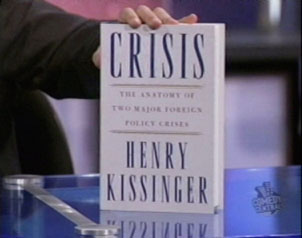

The Daily Show. (The best news on television.)
Remember that there's also a Foo Camp A-Z page where the interviews go up before I have a chance to blog them...
Bob Fleck is working on BlueTooth security.
This is from October 12, 2003.
Foo A-Z
Bob Fleck (Small - 7 MB)
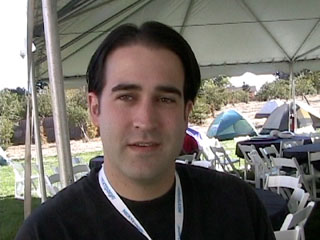
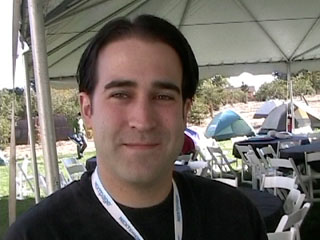
Brandon is creating a P2P gaming engine for serverless mass multiplayer online role playing games called "Gnosis." He's also creating a streaming webcast server called Alluvium that he'll be releasing at CodeCon next year. (Hey kids, it's time for the
CodeCon Call For Papers!)
He's also quite busy working at the Foundation for Decentralization Research.
Foo A-Z
Brandon Wiley (Small - 6 MB)
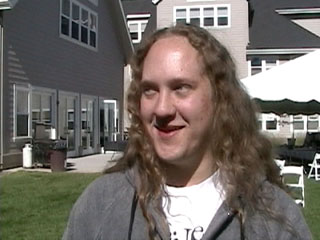
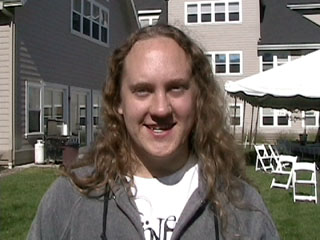
Nat Torkington turned the tables on me (or the cameras on me, as the case may be) and simply would not leave alone for several minutes. I've edited out some of the boring part in the middle (hope it's not all boring :-)
Thanks for doing this Nat. Most of the time, when I'm in historical archivist mode, I forget to capture myself for the time capsule reel.
Towards the lend of the interview, I was viciously attacked by Paul "Shmoo" Holman (Jack of All, Wireless, and Often Other Top Secret Trades). Glad I have the photographic evidence so I can make my case during the trial :-) Photos below of me getting roughed up below.
In all seriousness, this "shmoo" fella is one violent guy. I've got video of him beating up Jeremy Borenstein. And he even brags that he's planning to do it in another clip. (Making it a premeditated attack!)
Anyway, this is from October 12, 2003.
Foo A-Z
Lisa Rein - Complete (Small - 27 MB)
Lisa Rein - Part 1 of 2 (15 MB)
Lisa Rein - Part 2 of 2 (13 MB)
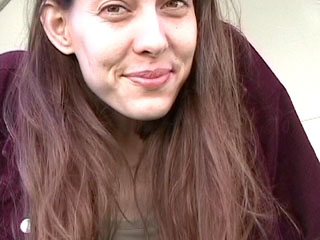
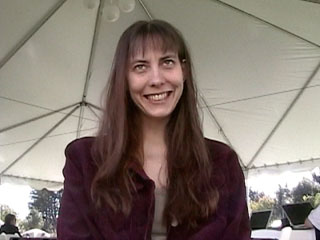
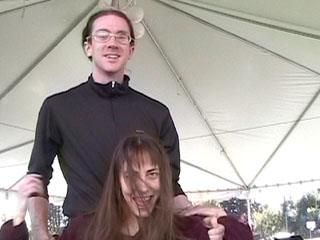
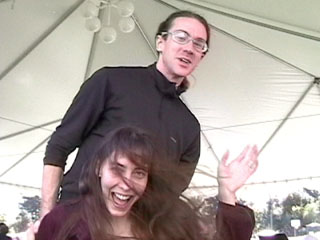
This is from October 12, 2003.
Foo A-Z
Ben and Mena Trott (Small - 11 MB)
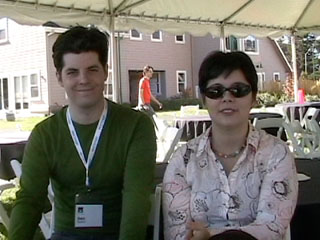
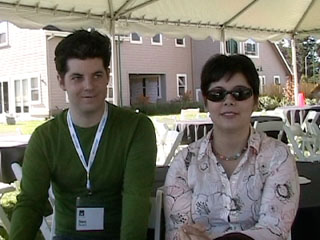
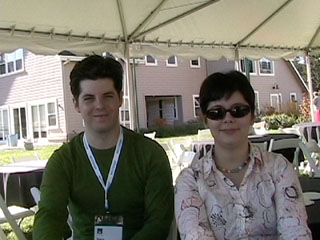
Anselm is working on "a mobile, location aware, many player game" called "Mites."
This is from October 12, 2003.
Foo A-Z
Anselm Hook (Small - 4 MB)
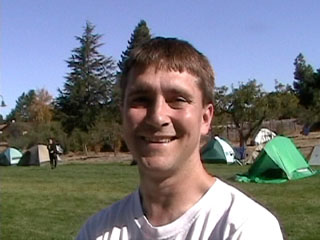
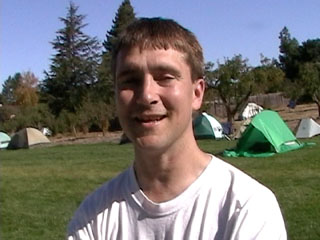
Dav is translating his Globe Applet, which allows you to put pinpoints on a globe, to J2ME, so he can put it on cellphones.
This is from October 12, 2003.
Foo A-Z
Dav Coleman (Small - 6 MB)
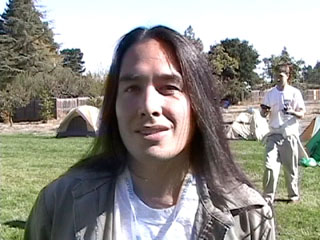
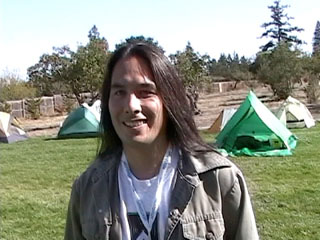
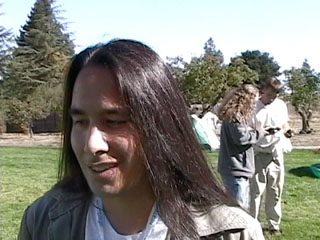
This is from October 12, 2003.
Foo A-Z
Rob Flickenger (Small - 8 MB)
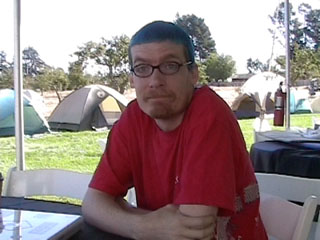
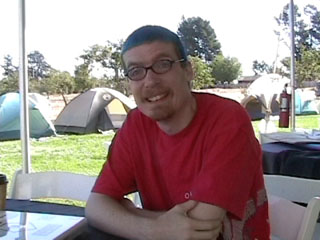
This is from October 12, 2003.
Foo A-Z
Doc Searls (Small - 9 MB)
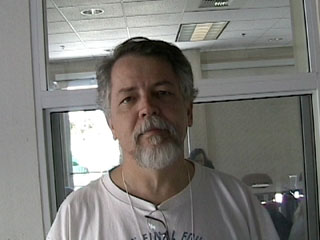
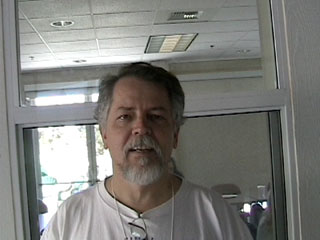
This is from October 12, 2003.
Foo A-Z
Mike Liebhold (Small - 9 MB)
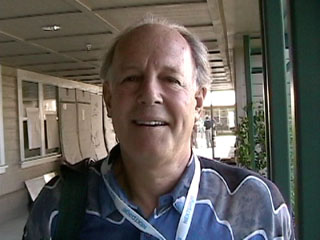

Okay so Danny did most of the talking :-)
This is from October 12, 2003.
(Here's a blog entry Danny wrote about Foo Camp.)
Foo A-Z
Danny O'Brien and Ada Norton (Small - 9 MB)
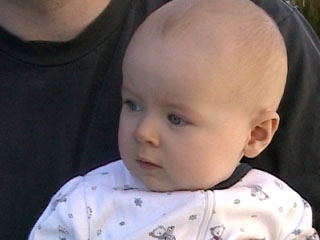
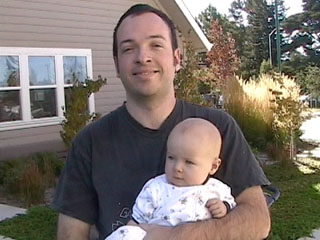
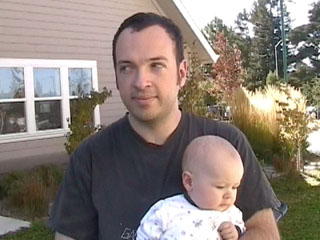
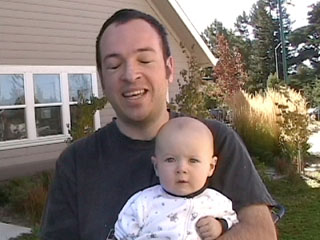
This is from Foo Camp on Sunday, October 12, 2003.
Foo A-Z
Dave Mathews (Small - 5 MB)
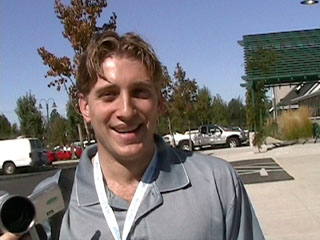
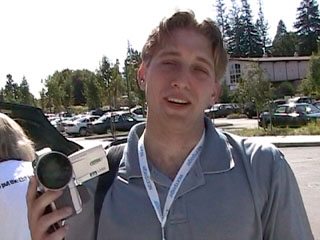
This is from Foo Camp on Sunday, October 12, 2003.
Foo A-Z
Dave Levitt (Small - 8 MB)
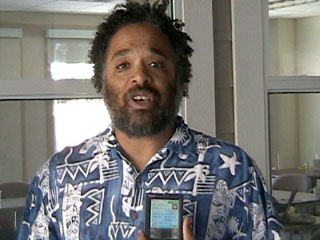
This is from Foo Camp on Sunday, October 12, 2003.
Eric Hatcher (Small - 4 MB)
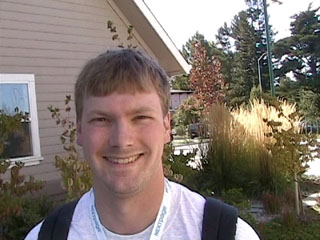
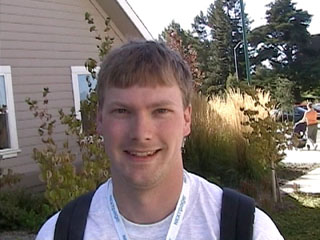
This is from Foo Camp on Sunday, October 12, 2003.
The "Geolocation" connection is the Blogmapper app mentioned in the interview.
Here's Jason's Blog.
Foo A-Z
Jason Harlan (Small - 8 MB)
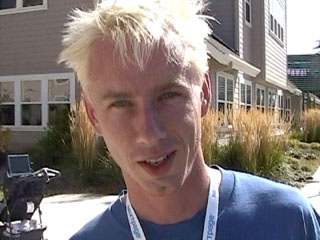
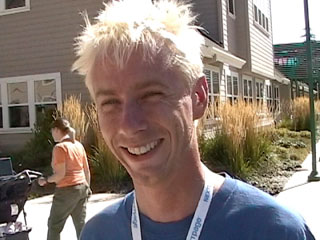
This is from Foo Camp on Sunday, October 12, 2003.
Foo A-Z
Esther Dyson (Small - 9 MB)

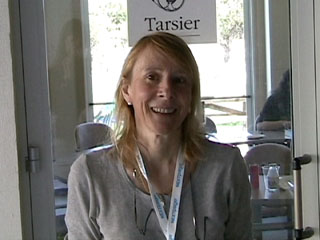
This is from Foo Camp on Sunday, October 12, 2003.
Foo A-Z
Bram Cohen (Small - 17 MB)
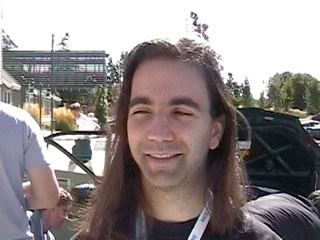

Ambassador Joseph Wilson was on
Meet The Press (hosted by Tim Russert) last Sunday to discuss the leak from an unnamed top official of the Shrub Administration that ended up blowing the cover of his CIA-employed wife.
The interview with Robert Novak from the same show is also available.
Wilson clarifies some of his own comments over the last week, while Tim Russert takes advantage of the opportunity to clarify some of the facts of the situation in more detail. (Tim is the man!)
I've made the clip available in its entirety, in two pieces, and in four smaller pieces to make it easier to download and circulate the parts of interest to you. This is good stuff.
This is from the October 5, 2003 program.
Complete:
Joseph Wilson On Meet The Press - Complete (Small - 39 MB)
In Two Parts:
Joseph Wilson On Meet The Press - Part 1 of 2 (Small - 18 MB)
Joseph Wilson On Meet The Press - Part 2 of 2 (Small - 21 MB)
In Four Parts:
Joseph Wilson On Meet The Press - Part 1 of 4 (Small - 10 MB)
Joseph Wilson On Meet The Press - Part 2 of 4 (Small - 9 MB)
Joseph Wilson On Meet The Press - Part 3 of 4 (Small - 9 MB)
Joseph Wilson On Meet The Press - Part 4 of 4 (Small - 11 MB)
Well I certainly understand why he can't reveal the source. There's no reason to throw journalistic ethics out the window completely.
This entire situation provides a perfect demonstration of how backstabbing this Administration can be. Novak is one of the few journalists that has stood by the Shrub and his cronies and consistently defended them through all of their folly. Now he has been chosen as the sacrifical lamb to "leak" a story that could potentially land him in jail. This Administration even screws over their "friends."
It sure seems like the "senior official" interviewed by Novack knew exactly what he was doing. He gave Novak classified information and then sort of half-heartedly asked him not to print it. This is a classic example of a premeditated "leak." Novak says that he tried to downplay the information by burying it in the sixth paragraph of the article. He also claims that he uses (or "misuses," by his own admission) the word "operative" all the time, and that "oops" this time he was referring to a "real" CIA operative. (Not sure what he "really" means when he uses the word "operative" incorrectly.)
You can check it out for yourself. Sorry I couldn't bring you the entire thing. My camera would not cooperate. (I really have to send it in for servicing!) I kept letting it cool down before I tried again, and did this enough times so I could get the important part at the beginning.)
This is from the October 5, 2003 program of
Meet The Press (hosted by Tim Russert).
I've made it available in its entirety and as two smaller clips.
Note: the interview with Joseph Wilson from the same program is also available.
Complete:
Robert Novack On Meet The Press - Complete (Small - 28 MB)
In Two Parts:
Robert Novack On Meet The Press - Part 1 of 2 (Small - 14 MB)
Robert Novack On Meet The Press - Part 2 of 2 (Small - 14 MB)
Hillary was great last night. She isn't optimistic about our future with Arnie though.
She wishes us well because we "have a lot of problems." (No shit. And we just elected a big fat new problem.)
She skillfully dodges Stewart's question about whether or not she'll run for president at the last minute. How about Vice President, Hillary? A Dean/Clinton ticket would sure be a beautiful thing indeed.
This is from the October 8, 2003 program.
Hillary On The Daily Show - Complete (Small - 20 MB)
Hillary On The Daily Show - Part 1 of 2 (Small - 12 MB)
Hillary On The Daily Show - Part 2 of 2 (Small - 8 MB)
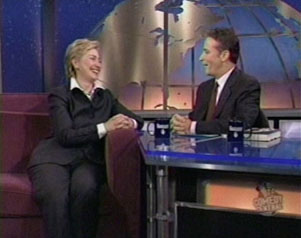
The Daily Show. (The best news on television.)
This is from the September 16, 2003 program.
This is pretty interesting. Madeline talks about facilitating Middle East Peace talks and how they won't even talk to each other during meetings. Over the years, I have always had mixed feelings about Madeline and her policies (although I must admit, she's been quite on-target lately), but she's always damn fascinating.
Madeline Albright On The Daily Show - Part 1 of 2 (Small - 9 MB)
Madeline Albright On The Daily Show - Part 2 of 2 (Small - 4 MB)
Madeline Albright On The Daily Show - Complete (Small - 14 MB)
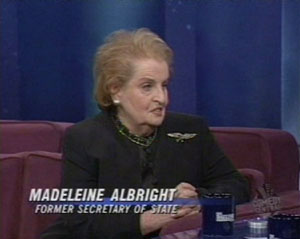
The Daily Show (The best news on television.)
I had a chance to speak briefly with Jesse Jackson after his speech today.
This took place in Sproul Plaza on Tuesday, September 16, 2003.
Jesse Jackson On Whether Or Not The 9th Circuit Decision On The Recall Will Hold (Small - 3 MB)
Jesse Jackson On Whether Or Not The 9th Circuit Decision On The Recall Will Hold (Hi-res - 35 MB)
Lisa Rein: "Do you think the 9th Circuit Court of Appeals Decision about the Recall election is gonna hold?"
Jesse Jackson: "It's difficult to say, only because this Supreme Court did an extrodinary thing in 2000. They stopped the vote determining the outcome of the presidency. So if they would do it for a President, they might do it for a Governor. You just don't know. So we must be prepared."
"I feel that momentum is building. People are finally beginning to see the danger of this act of disenfranchisement and destabilization. Whether it's Prop 54 or the Recall. Both are of the same ideology. They seek to disenfranchise and to destablize and people must fight back. If we fight back, we'll win."
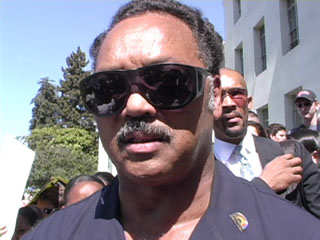
The Prince of Fair and Balanced was on the
The Daily Show last night.
Al took the liberty of pointing out the hypocrisy of the Shrub wearing a flight suit and performing in his little aircraft carrier escapade when, in reality, he not only let his daddy pull strings for him to get into the National Guard so he wouldn't have to go to Vietnam, but then, he didn't even show up for duty, and went AWOL for a year!
I might have to break this up into highlights. But here's the whole thing for now.
Be sure to buy Al's Book too. I'm just starting it, and I already love it. Everybody I've talked to couldn't put the thing down till they were done.
Enjoy!
Al Franken On The Daily Show - Complete (Small - 13 MB)
Al Franken On The Daily Show - Part 1 of 2 (Small - 8 MB)
Al Franken On The Daily Show - Part 2 of 2 (Small - 6 MB)
The Daily Show (The best news on television.)
Here's an interview by Carlos Watson with MoveOn.org co-founder Joan Blades.
This is from the September 1, 2003 program.
(I tried to find a website for CNBC's The Edge, but I couldn't find one.)
Interview With Joan Blades On CNBC's The Edge - Complete
(Small - 13 MB)
Here's an interview from the August 22, 2003 program
NOW With Bill Moyers with Georgetown University Professor David Cole about the subject of his new book Enemy Aliens. Cole discusses Ashcroft and what's wrong with the Patriot Act and imposing restrictions on immigrants as a result of 911. Host Ju Ju Chang goes out of her way to play Devil's advocate, if you ask me. (Not that anyone did :-)
David Cole On Bill Moyers NOW - Complete (Small - 27 MB)
David Cole On Bill Moyers NOW - Part 1 of 2 (Small - 14 MB)
David Cole On Bill Moyers NOW - Part 2 of 2 (Small - 13 MB)
This is from the August 21, 2003 program.
This is the mellowest I've ever seen Kucinich! He came across very well, I think.
Check it out and decide for yourself.
Dennis Kucinich On The Daily Show (Small - 13 MB)
The Daily Show (The best news on television.)
This is from early February 2003 sometime. (Sorry I can't be more exact!)
I forgot to link to this before, but with Arianna running for Governor in the CA Recall, it seemed relevant to make this available to you.
Arianna Huffington On The Daily Show - Part 1 of 3 (Lres - 26 MB)
Arianna Huffington On The Daily Show - Part 2 of 3 (Lres - 29 MB)
Arianna Huffington On The Daily Show - Part 3 of 3 (Lres - 26 MB)
Lisa is voting NO on the recall and YES on Cruz Bustamante.
The Daily Show (The best news on television.)
This is from the August 20, 2003 program.
Will Shortz On The Daily Show (Small - 11 MB)
The Daily Show (The best news on television.)
This from the August 18, 2003 program.
Jim Hightower is the author of a new book:
Thieves In High Places.
Jim Hightower On Texas Democrats Voting With Their Feet (Excerpt)
(Small - 4 MB)
Jim Hightower On The Daily Show - Complete (Small - 13 MB)
The Daily Show (The best news on television.)
From mild mannered student at University of Illinois, to self-proclaimed hacker for dean, Zack Rosen is now headed to Vermont to work on the Dean campaign.
I first met Zack online on his "Hack4Dean" list, when we both realized we were headed for ILAW in Stanford at the end of June. While at ILAW, we were both on a panel about "Blogging and Democracy," where Zack gave a rather detailed explanation of how his Americans for Deans system works.
By the end of the week, Zack had arranged for Howard to blog on Larry's blog while he went on vacation.
In the weeks that past, Zack has gotten even more involved with the Dean campaign, and has decided to take a break from school and move to Vermont to work on the campaign.
I asked Zack to answer a few questions about the work he's been doing and the work he's going to do in Vermont -- and to maybe let myself and other's know how to get more involved in what AmericansForDean has metamorphized into: DeanSpace.
So Zack -- How did the Dean on Lessig's blog arrangement come about?
Well, I can hardly take much credit for that enthralling piece of history, but it sure was fun watching it unfold. Here is what happened....
During my magnificent week at iLaw, I was CC'ed into an ad-hoc mailing-list conversing and brainstorming about the AmericansForDean / DeanSpace project. One night I mentioned in a mail to the list that I had given a mini-speech about it at an iLaw seminar, and that Lawrence seemed to be enthused afterwards. I also mentioned that "everyone wants to get Lessig and Dean together". I of course had no authority to declare this to be so, but in my mind I could not imagine anyone who would not want to get Lessig and Dean together so it seemed justified enough to include in the 3AM list-mail. In any case, shortly there-after, one of the recipients decided to act upon my made-up truism, and invited Lawrence to get together with Dean. Of course nobody really could imagine what this "event" would entail, but after a bit of discussion, Dean's camp and Lessig agreed upon a guest-blogging bonanza much to my delight.
So was that how you connected with Zephyr Teachout? How did you get involved with the "official" folks to the degree where they offered you a job?
Zephyr was one of the members of the ad-hoc mailinglist that made the Lessig-Dean thing happen, so I had been exchanging emails with her for a bit. But, later that week I was interviewed by a Wired News reporter who also interviewed Zephyr as well for the story. That is what put us in direct contact. Since then she started getting involved with the development community and a few weeks later I told her I wanted to work on the project full time rather than go back to school. In another few weeks after sending over a resume and meeting with Zephyr I was offered a job.
So it was you who proactively wanted to go work on the campaign? They didn't lure you away from school?
I think it was a pretty mutual thing, but I offered to move down to Burlington before they offered to pay me.
So what are you going to be working on in Vermont?
While I am not to sure where exactly I will be put to task, I do know there is way more work to be done than I will ever be able to do. I will probably be spending most of my time helping and coordinating with the DeanSpace project, showing campaign offices how use the software, and helping them figure out how to run an open-source meta-mesh web-community powered grassroots Presidentical campaign.
Wow. That's a mouthful. What's an "open-source meta-mesh web-community powered grassroots Presidentical campaign?"
I think the two kludgy words that people will get hung up on in that description of the software the DeanSpace community is building are: "meta-mesh". Open-source means the tools are liscensed under GPL and created by a community that resembles typical open-source development communitities ala sourceforge.net. Web-communities are pretty well understood, and have been around for a while: kuro5shinorg, slashdot.org, yahoo-groups etc.
So what the hell does "meta-mesh" mean? It is intended to describe the magic twist we are building into the web-community software we are assembling. We are making very robost RSS feed content importing and exporting tools into the DeanSpace web community "kits". The idea being that all the different Dean community sites running our code will then have the ability to share and syndicate content and users easily across the network of Dean web-communities. We are attempting to construct a grassroots campaign network from the numerous deployed sites running our code. The goal is to have all content and users on the network wrapped in metadata, so the different sites act as two way filters to the campaign network with communities built around them, rather than as isolated independant communities.
So let's talk more about these community "kits." What will they include?
Well the feature spec hasn't been completly worked out yet, but here is what is to be expected. * News / blog system * Personal blog utility for individual users * Threaded / peer-moderated forum tool * Mailing list integration * Media posting / download utility * Calendar / event system (i.e. meeting wednesday at 9 at Smiths house..) * Project / action ticketing system (i.e. help me make flyers, sign up here...) * Dean Endorser - lets users make endorsements that show up on the page and can be emailed to friends / family * Presence system - shows users who are currently online and allows users to find other users with similiar interests / affiliations.
When will the kits become available?
Don't quite know yet. We have some early code up now you can download on DeanSpace.org, but it is missing quite a bit of functionality. I think a realistic goal would be two more weeks for the first complete 1.0 release, but we will see.
So walk me through the process of downloading and setting up one of these systems. I go to the Deanspace website, and download X and do Y....
One of our members, Alison - alison@bankofknowledge.net - just made a walk through wizard for the setup process.
http://www.bankofknowledge.net/wizard/
It is is pretty early and not very formalized, but it should help neophytes through the install / setup process. Experienced geeks knowledgeable with PHP / mySQL web backends will find the install and setup process a cynch. There is some pretty decent documentation up on DeanSpace.org in the "manual" book as well.
One of our immediate goals is to create comprehensive walkthroughs of the setup process. The manuals / wizard is the beginnings of that.
How can people become more involved with DeanSpace if they are so inclined?
Oh this ones easy. Head over to DeanSpace, make an account, join the mailing lists, read the documentation on the site, and pitch in. The development community is very open. We have bi-weekly IRC meetings and rowdy design debates. Help is very much appreciated; there is absolutely way too much work to get done.
I missed the first part of this because I just got lucky coming across it when I was clicking through the channels. Looks like I got most of it though.
This was aired on August 4, 2003 on The Tonight Show With Jay Leno.
Hillary On Jay - Complete (Small - 27 MB)
Hillary On Jay - Part 1 of 2 (Small - 14 MB)
Hillary On Jay - Part 2 of 2 (Small - 14 MB)
This is from the August 4, 2003 program.
Dennis Leary On The Daily Show - Complete (Small - 15 MB)
Dennis Leary On The Daily Show - Part 1 of 2 (Small - 9 MB)
Dennis Leary On The Daily Show - Part 2 of 2 (Small - 6 MB)
The Daily Show (The best news on television.)
Exact date unknown -- July is all I know...
(sorry! things slip through the cracks!)
Gary Hart On The Daily Show (Small - 20 MB)
Gary was on a commission that all but predicted a 911-type disaster in its Sept 15, 1999 report. Lots of interesting stuff about security and the Shrub's "inept" strategies to date.
The Daily Show (The best news on television.)
Here's an interview with NBC News Anchor Brian Williams - The guy in line to replace Tom Brokaw on the NBC Nightly News after the 2004 Presidential Election Coverage.
Brian and Jon have a pretty interesting discussion about journalists and whether or not they "should" let people know about their own biases.
Brian says that he is a registered Independent and claims that he doesn't even tell his kids or his wife how he votes so that they all have plausible deniability when they say they don't know how he votes. He claims the Washington Post tells their reporters not to vote. I'm not sure how he knows this or how this could be verified, but I certainly wouldn't work for a paper who told me not to vote, and I kind of doubt many of the journalists I read in the Washington Post would either. So I'm not really sure what he actually meant by all of that.
Anyway it's an interesting interview.
Brian Williams On The Daily Show (Small - 15 MB)
The Daily Show (The best news on television.)
Here's an interview with Ambassador Joseph Wilson -- the guy that's been touring the circuit explaining how he discovered the Niger Uranium WMD situation couldn't have happened as originally reported.
This is from the July 24, 2003 show.
This is a long interview, so I've made it available in its entirety and in two parts.
Joseph Wilson On Daily Show - Part 1 of 2 (Small - 12 MB)
Joseph Wilson On Daily Show - Part 2 of 2 (Small - 10 MB)
Joseph Wilson On Daily Show (Complete) (Small - 21 MB)
The Daily Show (The best news on television.)
Here's a great interview with Jerry Goldman, Professor of Political Science at Northwestern on the Creative Commons site.
Jerry Goldman is determined to archive every recorded oral argument and bench statement in the Supreme Court since 1955, when the Court began to tape-record its public proceedings. Goldman, a professor of political science at Northwestern, founded the OYEZ Project in 1989 "to create and share a complete and authoritative archive of Supreme Court audio." This month the OYEZ mission takes a new step forward with the release of hundreds of hours of MP3 versions of their archived audio under a Creative Commons license.
Here is the full text of the interview in case the link goes bad:
http://creativecommons.org/learn/features/oyez
Jerry Goldman
Interview by Laura Lynch
Photo by Dennis Glenn
June 2003
Jerry Goldman is determined to archive every recorded oral argument and bench statement in the Supreme Court since 1955, when the Court began to tape-record its public proceedings. Goldman, a professor of political science at Northwestern, founded the OYEZ Project in 1989 "to create and share a complete and authoritative archive of Supreme Court audio." This month the OYEZ mission takes a new step forward with the release of hundreds of hours of MP3 versions of their archived audio under a Creative Commons license.
We spoke with Jerry recently about The OYEZ Project, their use of Creative Commons licenses, and the impact of their new MP3 release.
CC: What inspired you to create The OYEZ Project?
Jerry Goldman: In the late 1980s Professor Linda Kerber gave a talk at Northwestern University on her project dealing with gender discrimination in the law. Kerber played a few audio excerpts from the oral arguments in Hoyt v. Florida, a case that upheld the exemption of women from jury service. The audio was enlightening because it opened up a new way of thinking about the Court and grasping its work. It was my view that technology could enable a better use of these materials.
A later demonstration of such technology was equally inspiring. Two English professors visited Northwestern to discuss their Shakespeare project. Using an early Mac, a video-laser disc player, a color monitor, and some speakers, they demonstrated how one could highlight, say, Act II Scene 3 from Macbeth and then instantly play back the corresponding video. The ability to integrate text, audio, and video lay the groundwork for future OYEZ projects involving audio and annotation tools.
CC: After you became interested in the Court's audio recordings, how did The OYEZ Project begin?
JG: The earliest version of The OYEZ Project dates back to 1989. I came up with the idea of presenting our Supreme Court data and archives like a baseball card collection while sitting at a Chicago Cubs game at Wrigley Field. The idea materialized into a pre-web version consisting of complex HyperCard stacks. The stacks contained an elementary demonstration of video and audio linked to background information on the individual justices and the cases they decided. As a tribute to OYEZ's origin we created the "Law-Baseball Quiz," an idea from the creative mind of the late law professor, Robert Cover.
The transition to downloadable MP3s is a result of working with Chris Karr, a creative and forward-thinking computer scientist and web architect. Chris made me wake up to the need for wider sharing of our materials. I'm greatly indebted to him and quite pleased to acknowledge his contribution to the Creative Commons effort and to the entire re-conceptualization of The OYEZ Project.
CC: How did you obtain the Supreme Court audio materials? Why have you decided to release them?
JG: We purchased and collected the audio from the National Archives and Records Administration in College Park, Maryland. The audio materials — principally in the form of oral arguments — are the core of The OYEZ Project.
We released the public proceedings because they are some of the greatest intellectual and legal debates of our era. Transcripts — even with the justices identified — lack the emotive qualities of humor, irony and anger, which audio conveys. The first Roe v. Wade argument (the case was reargued) stands out in my mind. When Jay Floyd, representing the state of Texas, began his argument, he tried a bit of good-ole-boy humor, which was met by the Court's silence. (Remember that the bench was all men in the early 1970s.) His argument headed downhill from there. Sarah Weddington, representing Jane Roe, made a kitchen-sink argument, throwing every thing she could imagine at the Court. That struck me as pointless, though some of the justices were very gentle about it. Among the announcements of opinions, the Regents v. Bakke audio stands out. In a rare exercise, the justices spoke at length about their disagreements in the case, and the emotions are palpable.
CC: Government works are essentially uncopyrightable. How did you obtain the copyright for these works?
JG: The OYEZ audio is a derivative work because we've made technical and editorial judgments that depart from the original source. The raw audio we obtain from the National Archives often needs to be edited. Sometimes, the first part of an argument will exist on one reel and the remainder is on a second. We dub both reels and then match them up, removing any overlap. We have voice corrected many hours of audio because of timbre and pitch problems.
CC: How does this MP3 release add to what OYEZ is offering currently? What good might come of this for OYEZ in the future?
JG: It offers new independence to users by permitting downloads of OYEZ audio and promoting the sharing of those materials — subject to our Creative Commons license — on peer-to-peer networks. While we enjoy our popularity in academic and educational circles, we can reach more listeners by enabling downloadable versions. With the development of Creative Commons, we have, for the first time, a way to license our content that assures use consistent with our objectives.
The more I listen to the recordings the more I realize that the true value is not in the audio itself but in a community of dedicated listeners and scholars who could add to the audio. The original Court transcripts do not identify the justices, only the attorneys. Adding transcripts and voices to the audio would help create a searchable audio archive. For instance, you could search and listen to any audio where Scalia used the expression "strict scrutiny." Listeners could annotate audio by pinpointing selections that illustrate good and bad advocacy, or particularly interesting views on an issue, and then share their annotation findings with others in a shared community. Encouraging a community to select and identify audio clips will increase awareness of OYEZ audio as a primary source for scholarship and teaching.
CC: Why did you decide to use Creative Commons licenses? Why do you think this project is important?
JG: Creative Commons has a good solution to the nagging problem of commercialization and is based on a solid theory regarding the power of creativity. We want to contribute to that creative enterprise. It doesn't make sense to maintain the high transaction costs associated with acquiring these materials. Having made this investment — with the help of many institutions —it is our responsibility to freely share this treasure.
Peer-to-peer networking is getting a bad name as a result of the enormous amount of unlicensed music file-sharing. By making our collection available we are emphasizing a good use of P2P and hopefully inspiring other content creators to recognize that there is more to be gained by sharing than by withholding their work from the public.
We hope OYEZ audio will be used by law students, Supreme Court junkies, practicing attorneys, teachers, and the general public. To borrow from the immortal Yogi Berra: "You can hear a lot by listening." The experience is daunting and thrilling, and my hope is that by listening and learning, the quality of advocacy and communication will improve.
Here's a Daily Show interview with Lewis Lapham, Senior Editor for Harper's Magazine.
This interview was broadcast on June 17, 2003.
Lewis Lapham On The Daily Show
The Daily Show (The best news on television.)
Here's a cool interview with Penelope that explains more about who they are and what happened to them.
Note: Penelope Houston, formerly of The Avengers will be performing at 8:00pm. (Yes, the punk rock group that opened for the Sex Pistols in San Francisco in 1978, although she's got a mellower sound now, she has promised to "rock" :)
Here is the full text of the interview in case the link goes bad:
http://www.richieunterberger.com/houston.html
PENELOPE HOUSTON
Penelope Houston is still known to many punk fans only for her stint in the Avengers, one of the first California punk bands, in the late 1970s. Actually, by now her career as a solo folk-rock-influenced singer-songwriter has lasted far longer than the Avengers did. With a voice now more given to soft, wistful sweetness than harsh wailing, she would by the 1990s enjoy a large following in Germany, getting dubbed "the Queen of Neo-Folk." She talked about all phases of her career in her Oakland home on Halloween 1996.
What Avengers releases have there been, besides the album compilations?
There's a three-song EP seven-inch, four-song EP 12-inch. There are a huge number of bootlegs, most of them being singles. And one really horrendous CD that I heard, that I swear it sounded like somebody taped the show with a regular transistor radio, and then they played it on the air somewhere, and somebody else taped it with a little hand-held thing. Off of a radio, and it wasn't tuned in right, I swear. You can hear it sort of tuning in and tuning out, and the first half of it kind of sounds fast. So you're listening to 25 minutes of Avengers songs played really fast from a live show, through a radio show, recorded by somebody, put on a CD. Then they have some other stuff that was recorded that sounds slow from a live show, and it's really godawful. And somehow they got their hands on some actual recorded stuff that was done at rehearsals or at some studio or something. This thing has come out in Europe, and says it's limited to 500. But if it's a bootleg, who's to believe anything like that at all? Most of them are live, and they're just godawful.
One of them was really funny. Somebody wrote down the lyrics as they heard them, and I saw them. It's in one of the seven-inch bootlegs. All wrong! Really funny. It was kind of a gruesome lyric that didn't actually exist, having two heads or something like that.
Why didn't the band put out more while they existed?
We were actually together for two years, but there was no independent music industry. There were hardly any labels. Our first record came out on Dangerhouse, and the second on White Noise. Now it's hard to imagine there not being somebody who lives right down the street who's got a record company. Or me, I've got a record company, I put out my own tapes. But back then, there just wasn't. There were more tiny English labels that were putting stuff out. But there wasn't that whole sense of, we'll just go in and record something ourselves and do it. It was kind of like waiting for somebody to recognize that we're this hot little punk band, and that somebody should pay to have us record it.
The first three songs that came out were paid for by Dangerhouse. White Noise, I guess, paid for the four songs we did with Steve Jones, which we remixed. Everything else that's on the Avengers album is from a couple different studios saying, well, we'll give you some spec time, and see if we can do something with it in the future.
Were there any original songs that were never recorded?
There might be some. I tend to just forget things that don't get recorded. I would say that if you had a live tape of our last five shows, you'd find a bunch of songs that never came out. Some of the bootleg stuff was of that.
How did the CD Presents compilation album happen?
I moved to England, and before I left the country--this was in '81, '82--Danny [Furious], who was the drummer, was living in San Francisco trying to ask me for any tapes I had or photos. Because he wanted to get an album together. I think I sent him some stuff. The album originally came out on Go! Records, which were partners with David Ferguson [of CD Presents]. They had some falling out. He ended up suing them, and preventing them from releasing that record when they had already printed up 1000 record covers. Every now and then you can see those in collections. But I was in Europe, and basically he was dealing with Danny. So he had Danny's permission to put it out on his label.
At some point, I think that the other guys said hey, what about us? Because Danny was getting these producer advances. So then Jimmy came on board, Jimmy Wilsey, and he was doing something with it. Because he felt that Danny was not handling it. When I came back to San Francisco, I called up Ferguson's. I said, "You've put all this stuff [out], you haven't even asked me. And you haven't given me money, you haven't sent me any contract." He said, "Oh, yeah, come on in." I was visiting, actually, I hadn't moved back. I called and called and called. I tried to contact him from the U.K., where I was living. I went to his house, and as soon as I was there on his door, somebody said, "Oh, I have some contracts for you to sign now!" So he gave me a small advance. That was the last money that I ever saw from him. It came out as a CD after that. Of all the CDs that have sold of that record, I've seen zero royalties.
It would have been great if somebody might take it upon themselves to wrest the rights from CD Presents, because they really don't exist as a lab3el anymore. They can sell the rights. Since he hasn't paid the band their royalties or their publishing...at one point I got together with Jimmy and Greg [Westermark], and we went and saw a lawyer. Danny was living in Sweden. To see what we could do to get back the publishing. The contract that was signed was so horribly written that not only did we get nothing, not only that we didn't get the pittance that was accorded to us on the contract, but you couldn't take it to court, it had to be settled in arbitration or something like that. The lawyers just looked at it and said, "This is fucked." We didn't have the money to throw at it. I keep hoping that someday some label will decide to write them a letter and see what they're willing to do. In the meantime, we haven't gotten anything. The last time we saw any money from them was over ten years ago. I don't know what it really sold.
You were one of the first few punk bands in the San Francisco area, or even in California.
There were very few bands that came before us. I'd say Crime and the Nuns came before us. The Nuns were influenced more by the Dictators, and Crime was...It's funny. It seemed to me that at the beginning of the whole punk rock thing or new wave thing, all the bands were really distinct. You wouldn't confuse Devo with Crime or the Nuns. It was like everybody had their own thing. It was really more original. We were kind of more English-influenced than the Nuns and Crime. From L.A., X and the Dils--the Dils were probably a little more political than the Avengers. But then, they had those cool harmonies, the kin and bro harmony thing. I don't think there really were that many bands that were...there weren't many bands with female leads that were doing the same thing that we were at the time. X was around, but they had their own kind of L.A. thrift store kind of thing going on.
It's hard to say who we would have sounded like. You could say we sounded like the Weirdos, but the Weirdos had John Denney, and their subject matter was always clowns painted on velvet or something (laughs). We were sort of straightahead classic punk before punk turned into its really boring 1980 version, which it continued to be forever and forever.
How was it that Steve Jones ended up producing some of the Avengers stuff?
We played with the Sex Pistols. They had a publishing company, Glitterhouse, that Malcolm McLaren owned. They opened an office in L.A. And we'd play L.A. a lot of the time, we were pretty popular there. The guy that was running it in L.A., Rory, was also their tour manager for the U.S. He always wanted to manage us. He was really interested in signing us to the publishing company. That was around the time everything just blew up for the Sex Pistols. We did get to play that show [with the Sex Pistols in San Francisco], and we did meet them. I guess Steve Jones fancied himself a producer, and went after that. That was kind of arranged.
Actually, I think when we went in, we recorded that stuff with him without having a label. Nobody was paying for it. Actually, maybe we did do it for a label. I can't remember (laughs). It did end up coming out, but it came out after we broke up. I say things about him in interviews, and he says things about me in interviews--that's the contact we have. I re-recorded all my vocals that I'd recorded with Steve Jones later. The interesting thing about the four-song EP that he worked on was that nobody was there the day that he recorded the guitars with our guitar player, and he got a real Steve Jonesish sound. To this day, I don't know if he actually did any of the guitar playing on that. He did some piano playing on it, that was funny. You won't really know it from listening to it. It's more the thumb going down the keyboard.
I actually recorded some stuff there that's never seen the light of day. It was kind of an odd pop style. I think Steve Berlin played on it. Kind of poppy, kind of like new wave, and poppier than the Avengers. But it had electric guitars and stuff. One of the songs had strings on it. It's really funny stuff. I never listen to it. I never ever play it for anyone either.
I was working with this guy who was actually a film director from Holland. He was putting together this film for the Screamers that was going to be like a big...I don't know what it was going to be. But it was a musical and a film, and all this stuff was going on with the Screamers. He just got the people together that we played with. Interestingly enough, one of the people that arranged all the strings on this one song, and may have played violin, is Beck's father, who Beck never talks about, who is a big Scientologist and a big string arranger. Beck makes it sound like his Dad was some kind of street musician or something, and he was being carried around in a backpack by a bunch of hippies. But his dad was actually a big-time string arranger in L.A., David Campbell. Besides Steve Berlin, I don't remember who else played on it. I guess they were people I didn't know.
That happened in 1980, '81, and then I moved to England. I did kind of a backing track on one of songs that's on...it's a song called "Taking Over Heaven" that's on "Jerky Versions of a Dream." Once I did an interview with some fanzine, and they called that album "Turkey Versions of a Dream." That was his first solo album.
How was it that you made the transition from punk rock to much more acoustic-flavored folk-rock?
I just started getting interested in different instruments, from listening to Tom Waits's Swordfishtrombones, the Violent Femmes, a bunch of people that were coming up at the beginning of the 1980s with weird sounds. And I was sick of electric guitar. I'd basically had it with electric guitar. I thought, if I have a band without an electric guitar in it, that would be great! Just have some different instruments.
In '84, my husband and I had come to San Francisco, actually to look up Ferguson, and we ended up staying; September '84. I ran into Greg from the Avengers. He'd been writing all this music, and he wrote the music to "Summers of War" and "Harry Dean." I started working with him on this music. Actually writing music--he wasn't playing in a band. Somehow a year went by.
You did a single under the name -30-. What was the history of that group?
I started recording some stuff in the middle of '86. -30- was a name that only existed for the record. We never actually played in a group called -30-, because the guitar player quit. It always seemed like the person who named the group would be the next person to quit, so after a while we just, okay, it's Penelope Houston.
I was playing with different people under the name Treehouse, actually. Club Nine, they had the art motel. It was where the Stud is now. They had a couple big rooms where they had bars and bands and would play and stuff. And then upstairs, they had the art motel, which was maybe five rooms of installation art. And we did a treehouse in one of the rooms. People had to climb in the window, and there were leaves everywhere and stuff, glued all over the ceiling, and little films showing on the wall. We played up there. We played a bunch of places around town. I think we switched guitar players, and by the time we finished recording, he talked me into calling it -30- because he was a journalist. [He's] a journalist in New York now. He was really into the poppy end. He co-wrote "Full of Wonder" with me.
I guess I just decided to put that out myself as a single just for fun. But I didn't have a solid group around me to be working with, and was just trying to write my own songs. I think at the time we did that, we had half an album's worth of songs or maybe more. But I hadn't found the wonderful autoharp, so I was still in the stage where I would write lyrics and maybe a melody, and try to find somebody who could find the chords for me. At some point I discovered that "oh, I can do that myself. And fuck all these people." (laughs)
That period, I was going through different band members and having different lineups and stuff. Right when the record came out, I think Eric had just moved to New York, and we got Pat Johnson, who was--his nickname was "Birdboy." He was one of the mainstays of Penelope Houston and the Birdboys. From there, we started to have a more solid kind of band. Birdboys was recorded in '87. Then that band broke up. And then the record came out in '88.
That record had a lot of folk influence, much more folk than punk rock. Was your interest in folk something that arose right before the record, or something you'd had for a long time?
When I was younger, before the Avengers, listened to a lot of Pentangle and Fairport Convention and Incredible String Band. I loved them. I didn't really realize this until maybe six years ago, after I'd recorded Birdboys. I got a copy of the double Pentangle album, Sweet Child. I listened to it and I knew ever song on it. I was like, "Whoa! This is weird." It was before my punk life, I'd heard a lot of English folk-rock. So I think that was a big influence that I'd forgotten about somehow.
What was the reaction among listeners, both in the folk scene and the rock scene?
There's a big folk scene in Berkeley. There's the Freight and Salvage and the traditionalists and stuff, and we weren't really accepted by them. And we weren't accepted by the alternative clubs because we were quiet, so we were kind of in a hard place.
There must have been a lot of surprise among listeners who knew you only for your punk music with the Avengers, though.
Yeah (laughs). In fact, I did an interview with Maximum Rock'n'Roll, and on the air they accused me of selling out. I just thought that was outrageous, because obviously if I wanted to sell out, I'd re-form the Avengers and go touring around. And also, if I'm selling out, where's my big house? Now I've got my big house. Now I have sold out! (laughs)
I was just over at Billy Joe from Green Day's house yesterday, and we're going to write some songs together, amazingly enough. For my next album. We sat around talking about how all these people had accused both of us of selling out. I said, "At least you have a ten million-selling album to prove that you did! (laughs) I sold out, I got nothing. No, I never sold out. I'm true to my punk attitude.
But yeah, they just didn't get it at all. The people that have become Avengers fans since the Avengers had broken up didn't understand it. The people that are my age, that had been around then, obviously--either that was something that you were into for some kind of social world to be in, or that was the beginning of becoming a music fan. I think most people that are music fans that keep it up throughout their life expose themselves to a lot of different kind of genres and can appreciate different things. So I've had lots and lots of people say, "Oh yeah, I was around when the Avengers, I like what you're doing now, I understand the change." So it's not a big confusing thing for me. I've had young people that were Avengers fans also say, "My friends can't understand why I want to play your music, but..." That's something for me. I've had both--people who've just said [in Jewish mother accent], "What are you doing?," and other people who've said, "I like it."
For a long time, there was no attempt at having anything related to rock in our music. It was all these other influences, like jazz and country and folk, and a little punk, but more coming from me I think, but more of a punk attitude. We really fell in the cracks, we didn't fit. There was this point where Michelle Shocked was having airplay and Suzanne Vega, and a bunch of female vocalists were getting signed. There was this kind of a little flurry of excitement around that, but I didn't get signed. I just said, 'Well, I'm just going to go into debut and record this record, The Whole World, at my favorite studio.
Actually, Snakefinger had recorded at Different Fur a lot. So when he died, they told me that they wanted to help me out, because he'd always talked about bringing me in there and stuff. So they were willing to spec me some time. That's where I recorded the last three albums. That was the beginning of the '90s. I just said, after waiting around to find a record deal for several years and putting out cassettes on my own label, "I'm going to make an album, and then I'll shop that. And if it's a small label that wants to put it out, that's okay, let's do it." I'd kind of given up on the waiting around to get signed thing, and made this album which I think was a really good album. Very acoustic and everything, but I had probably my best writing on it. Then Heyday put it out. I licensed it maybe a year later to Normal, and that's when all the exciting stuff started happening.
Why do you think it is you've had more success in Germany than here?
I think that they find the things that are American to be exotic. It's the same as jazz being big in Europe forever and ever and ignored here, or the blues, or country music. You get cult-type fans over there. I think what happened in '93 was that that was a true thing that was going on, this general interest, but also they started it up as this alternative, hip, neo-folk thing, San Francisco neo-folk scene. And it was through the taste of several tastemakers over there. They really pushed it till that was going to sell easily. I think that Heyday and other labels, Normal and other labels, suddenly flooded the market, 'cause there was this big market suddenly for it. And I got to be the queen of neo-folk, which is a title that now I'm ready to lose (laughs). And it got endlessly quoted. That's what I am over there, unfortunately. Ever since Karmal Apple, I've been going in a harder direction than folk and acoustic. I never got an audience in America, so now I'm ready to move on from what I was doing that got me an audience in Germany. So I'm really kind of taking a chance here.
It just took off over there. Part of it was a little bit of hype that was going on. I think maybe people there are more capable of listening to more complex music or something. They have MTV over there, and they have VH1. So there's more to choose from, as far as how music is being presented to the public. Here [in the San Francisco Bay Area] it's kind of like Live 105 and MTV. There's also VH1 and the country music channel and billions of different radio stations, but the majority of people get most of their taste from MTV or Rolling Stone. It's been a mystery. A lot of people have asked me, "Why do you think you're popular in Germany?" It's the German-speaking nations--Germany, Austria, and Switzerland. I got signed to WEA Germany.
How were you able to get an album deal with Warner Brothers in the US eventually?
I signed to WEA Germany for the world, so it was up to them to find licensees. The guy that was the manager for Green Day was shopping my tape for America before I signed a deal with WEA Germany for the whole world. So he was over there talking to them and he knew Howie. When Howie became the president in January, the people from WEA Germany were quite close to him and said, "What about Penelope Houston?" He said, "Oh yeah, I love Penelope. What's she doing now?" (laughs) He liked the Avengers, and he liked the whole punk thing. He actually did know that I was doing a more acoustic thing, and he said, "Well, you're our first signee." I wasn't actually a signing--a licensing. Reprise was one of the labels that I was offered to in America from the German WEA. They did send it out to different people and say, "and she's an American, obviously." For an American label to license an American from a European label is just, "We either really fucked up and else we didn't want her in the first place. We're not gonna admit that we really fucked up." But since Howie knew me, he just said, "Yeah, that'd be great."
Do you have any regrets about working with a major label after being with indies?
No, it seemed like the right thing to do. The thing about European major labels is that they're, especially WEA Germany, the deal they write is much more artist-oriented. They're gonna go out and get some big producer for this next album, and it's all out of their pocket. My recording budget's all out of their pocket. So I don't owe them--they might spend a quarter of a million dollars on my record, and I don't owe them a quarter of a million dollars. I owe them like $30,000 or something like that. So it's a deal that you don't see in America. It's a much better deal. So when that happened, I thought that was great. And I also knew that I'd hit the glass ceiling of my independent labels' abilities. Normal, they're all great people. I really like 'em, I still like 'em. But it's just like, they knew they could only take my records so far.
Is your next album going to be different from the ones over the last few years?
The next record is completely all-new stuff. It's not gonna be as acoustic as things in the past. I actually fired my band when I got back from my tour, pretty much. I might have them play on a couple tracks. I'm just gonna record with different people, and not have it be a band thing. The whole reason I decided I didn't want to work as a band anymore--most people see me as an individual singer-songwriter anyway, but I've been working with the same people for the last three albums. They know that the direction that I've been pushing, I sort of fell like I'm dragging them along in a harder direction, a more electric direction. It's just too much stress to a bandleader to be playing with people and trying to get them to do stuff musically that they don't really enjoy doing. They're really great musicians and the level of musicianship has been amazing on the tours and on the recordings, but when you want the down and dirty stupid drumbeat, and your drummer is like this amazing jazz drummer who studied Indian drumming, it's just kind of like torturing you to get this sound. I thought I would just go ahead and record the next album without--just have people come in and do the parts that they're really good at.
Are the songs much different in nature than ones on your last few albums?
They're not. They're still--a lot of them are based on relationships between men and women, and my general attitude about being alive in the world. That hasn't changed that much. I still have the general attitude, which is cynical but also hopeful. I think it's probably changed a little bit since I was in the Avengers.
A lot of people would hear the music I was doing and say, "oh, this music sounded really nice and pretty and lovely and stuff. And then I started listening to your lyrics and I just thought, these lyrics are twisted and warped and weird! Or angry, or whatever. They would either like that aspect of it, or they would feel like--some people feel like the music isn't representing the lyric. Other people feel like, the lyric is ruining it for them for the music. But I think that there are many many people in the world who listen to music and don't even hear the lyrics. And for me, the lyrics have to be there. If I don't like the lyrics, I can't stand listening to the song.
What I'm trying to do is free myself up to be in a position where the music's gonna serve the gist of the song more directly and more obviously. That way, each song will be more extreme, whatever the feeling of it is.
What do you see as the continuity between what you were doing in the Avengers, and what you've done in the late 1980s and late 1990s on your own?
I guess the continuity is me. The thing that's similar about what I do now without the Avengers is just me. When I was in the Avengers, other people came up with the music, and I came up with the lyrics and the melodies. Now I come up with a lot more. But writing melodies and lyrics to music that is like your basic punk rock formulas, you're gonna tend to write things that you can shout, in a way. I didn't write very many complex melodies back then. It was more shouting. But I think if you take a song like "Glad I'm a Girl," which is on the last album, but it was written maybe five, six years ago, when I was in the throes of the acoustic thing. "Glad I'm a Girl" could be done by a punk band, and it would sound exactly like punk rock. There's nothing about it that would be in any way indicative of being a folk song, or anything like that. If you take the trappings of the music and change it, people think that somehow there's a big change. But actually, good songwriting will lend itself to different interpretations.
I think that myself and my attitude towards life and my willingness to express it is the same as it was then. I don't feel like a different person, really. The music's different, but like, big deal (laughs). For people that are really musically based, or like to listen to the music and don't even hear the lyrics, that would be like, it's totally different. But for me, it's more the feeling of what the person is saying. I can't see the huge difference. It's said differently, but I feel like I'm the same person.
I remember I used to tell people that we were a folk band when I was in the Avengers. What I meant was that we were just playing music that we made up for friends, the way the original of folk is just music of the people. It's the folk music of Mexico, or the folk music of whatever. It's music that's played by regular people. It's not played by the court entertainers for the king. It's just the music that people go out on their porch and start strumming, and the neighbors come around. When I said the Avengers were a folk band, I just meant that we were making it up ourselves, that we'd taken it out of the realm of arena rock and the gigantic showplaces, and taken it back to the garage.
I never really thought, oh, I want to do a cover version of "Wild Mountain Thyme." But there wasn't any...the loudness of the Avengers was so much of the expression. There wasn't really a chance to actually sing. I don't remember ever having monitors. I know we must've had monitors, but I don't remember looking at them and thinking, "I'm not getting enough of myself on the monitor." Everything was really loud and you just screamed at the top of your voice to be heard in live shows. I didn't think our live shows were anything...they were so different than our recorded output.
I guess it was 1984 that I did my first show that was acoustic. The idea of having these big holes in the music, where there was no sound and then my voice would come out, was the most terrifying thing to me. I thought it was much more frightening than getting up in front of a Marshall stack three-piece band and screaming your lungs out. It was like stepping on a tightrope over this huge hole that was left in the music.
And I was never a big fan of rock. I was never a rock'n'roller before I was a punk rocker. I was just a punk. I was just doing it because it was the most exciting thing that was happening. It was different, it was new, and we were creating it ourselves, and I felt the same way when I started doing this music with different instruments that had big holes in it. I didn't think, I'm going to start playing folk music. I just thought, we're doing something new and it's exciting and it's scary. The whole thing became more musical after that. But the way we started it was more like the Violent Femmes. It was more like kind of a punk attitude towards really quiet music. Since then, I think I've become a lot more musical. I guess in that way, I've changed.
This interview was aired on Late Show With David Letterman on Monday, June 16, 2003.
Hillary On David Letterman - Part 1 of 2 (Small - 17 MB)
Hillary On David Letterman - Part 2 of 2 (Small - 20 MB)
Hillary On David Letterman - Complete (Small - 37 MB)
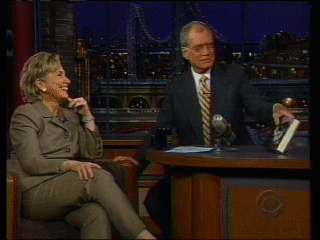
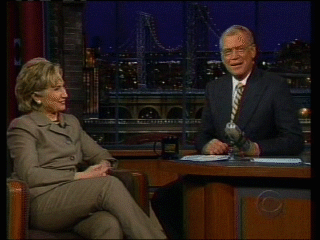
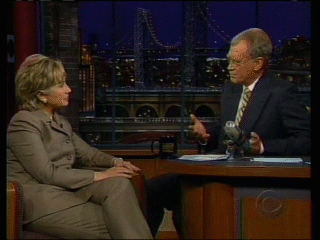
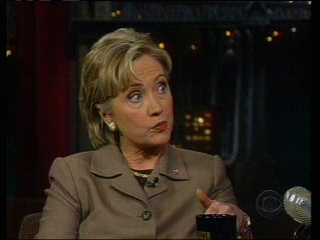

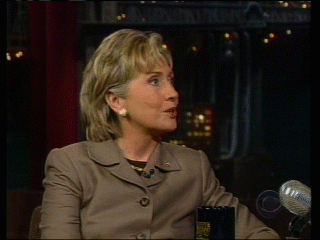
Here is last night's interview with former Secretary of State Madeleine Albright.
Fascinating stuff. They talk about North Korea and what's really going on over there (not what we're told here -- that the country's leader is just a looney tune) -- and how the United States is pretty much hated and feared by the rest of the world at this point. (How sad.)
Hi-res versions will go up later today.
Madeleine Albright On The Daily Show - Part 1 of 2 (Small - 12 MB)
Madeleine Albright On The Daily Show - Part 2 of 2 (Small - 8 MB)
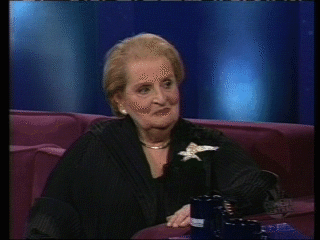
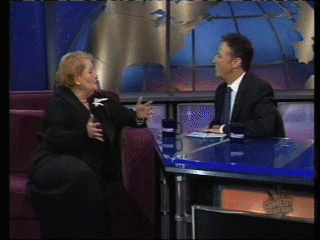
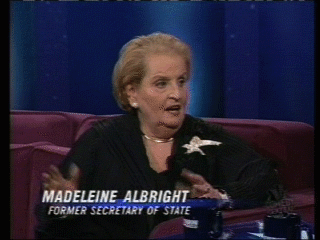
The Daily Show (the best news on television).
Martha Burk, chair of the National Council Of Women's Organizations, was on the Daily Show a few weeks ago. Martha has been protesting and speaking out against the
Male-only policy at the Augusta Golf Club (owned by Augusta National, Inc.).
According to Burk, Augusta members such as Bill Gates and the CEOs of General Electric and Bank of America won't stand up for women's rights because they don't want to cross "Hootie", the President of the Club.
Burk also explains how the Klu Klux Klan have stepped up to support the Club's discriminatory poilcy, saying "This civil rights stuff has gone too far. We support the club. Keep the women out."
She also explains why this battle is one worth fighting.
Audio - Martha Burk On The Daily Show - All (MP3 - 10 MB)
Martha Burk On The Daily Show Part 1 of 2 (Small - 7 MB)
Martha Burk On The Daily Show Part 2 of 2 (Small - 8 MB)
Martha Burk On The Daily Show Part 1 of 2 (Hi-res - 93 MB)
Martha Burk On The Daily Show Part 2 of 2 (Hi-res - 113 MB)
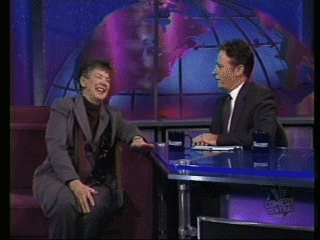
The Daily Show -- the best news on television.
Chris Rock On The Daily Show (Small - 3 MB)
Chris Rock On The Daily Show (Hi-res - 36 MB)
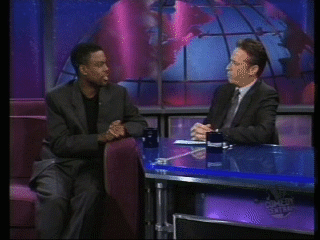
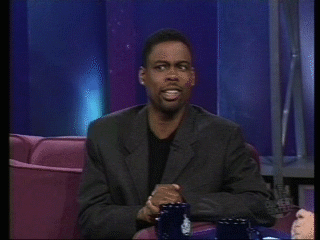
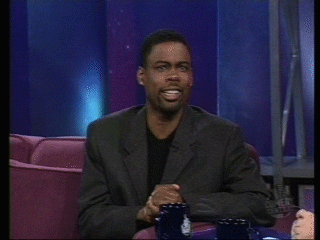
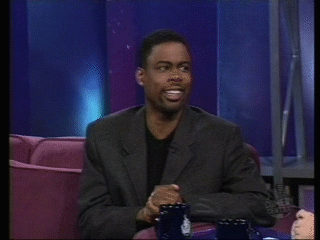
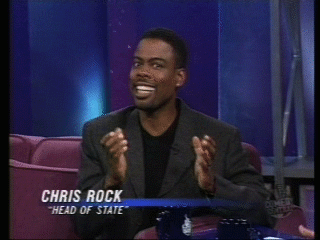
She doesn't mince too many words, either.
I always thought a lot about Lisa Marie when I was a little girl growing up because she had (partly) the same name as me and was born the same year as me and I was told we looked a little alike (at the time).
(At least my relatives thought so :-)
I remember when Elvis died. I was like 5 or 6 years old, but I remember.
I remember that the first thing I thought of was Lisa Marie. I hoped she was going to be okay. Not just right at that moment, but in general.
I've pretty much been worried about her ever since. Some crazy emotional attachments you never outgrow, perhaps.
Anyway, I found this interview pretty interesting. Maybe you will too.
‘Love Makes Me Go Haywire’
Lisa Marie Presley talks frankly about music, marriage—and suspicious minds
By Lorraine Ali for Newsweek.
I was so astounded by the hundreds of thousands of people who were clearly in mourning. They were having these violent reactions in front of me. Thousands of people were coming through my house to look at his body. I remember watching them all and being so confused. I couldn’t really have my own grieving time. It wasn’t until a month later at camp—where my mom sent me to get away from it all—that I lost it...No, it wasn’t mutual. He (Michael Jackson) was in the hospital, and I couldn’t figure out what was wrong with him. I started asking questions, and it was always a different story. He said I was “causing trouble” and “stirring up problems.” He told me, “You’re making my heart rate go up,” and asked me to go home, and I said, “Good. I want out.” This person is one of the biggest entertainers out there. He is not stupid. He’s very charming when he wants to be, and when you go into his world you step into this whole other realm. I could tell you all about the craziness—all these things that were odd, different, evil or not cool—but it still took me two and a half years to get my head out of it.
Here is the full text of the article in case the link goes bad:
http://www.msnbc.com/news/891807.asp?cp1=1
IMG: Lisa Marie Presley
Four lives in one: Lisa Marie Presley
‘Love Makes Me Go Haywire’
Lisa Marie Presley talks frankly about music, marriage—and suspicious minds
By Lorraine Ali
NEWSWEEK
April 7 issue — Lisa Marie Presley has been a de facto celebrity since she was born to Elvis and Priscilla 35 years ago. But the L.A.-based mom—she had a son and daughter with her first husband, musician Danny Keough—has avoided the spotlight, marriages to Michael Jackson and Nicolas Cage notwithstanding.
NOW THE RELUCTANT pop heiress is set to release a debut CD of bluesy rock, “To Whom It May Concern.” The album is hard-hitting in spots, middle-of-the-road in others, but her lyrics are honest and revealing, and Presley has an appealingly deep, smoky voice. In one of her first solo interviews ever, she talked candidly about life with Michael and living in the shadow of the true king of pop—her father.
Your parents divorced when you were 4, and your father died when you were only 9.
I feel like I’ve lived four lives in one. I dealt with death early on. It wasn’t just my father, it was my grandma, my grandpa, my great-grandfather, my aunts—all in a two-year period. I didn’t have much of a runway into life. I was, like, a deep, dark kid who was always melancholy.
Regardless of what your dad meant to the world, he was still your dad.
I was so astounded by the hundreds of thousands of people who were clearly in mourning. They were having these violent reactions in front of me. Thousands of people were coming through my house to look at his body. I remember watching them all and being so confused. I couldn’t really have my own grieving time. It wasn’t until a month later at camp—where my mom sent me to get away from it all—that I lost it.
Were you there the night that your father died?
I was, but I won’t go into it. I just won’t go there.
You grew up singing at the kitchen table at Graceland. Why did you wait to make an album?
I always avoided singing in public. I just felt I would get crucified. I thought of acting—maybe playing some whacked-out psychopath to shock and scare people, but that lasted, like, two weeks. I got over that and started singing again. There are those who will say, “She’s actually got some of her own talent, or some credibility as an artist,” versus those who will say, “She’s not her father, she never will be—and who the hell does she think she is?” That’s why I named it “To Whom It May Concern.” It’s kind of a sarcastic thing.
It’s an awful lot of pressure for your first album.
It’s intimidating. I hate it. But there must be people who are interested in getting beyond the superficial tabloid bulls—t. Because of no direct communication from me, there is this funnel of b.s. that travels straight to the public. It has a life of its own. When I meet people, I know they’re trying to sift what they’ve heard. But if they listen [to my album], I hope they will hear somebody who’s being pretty damn honest and not throwing up smoke screens.
Your dad’s stardom wreaked such havoc on your family. How did your mom feel about you getting into music?
The one time we talked about it she said, “Those are some serious shoes you are going to have to fill.” I think she was afraid of what I was gonna run into, crucifixion-wise.
Lisa Marie Presley on:
• Jitters about performing live
• Why she chose to become a recording artist
• Her revealing lyrics
You’ve been in plenty of surreal situations by now, like being married to Michael Jackson. You must have known that it was going to be a circus.
I was naive on that front. I was in this constant struggle that went something like this: a man who’s with me who has nothing is gonna be stomped on and have no identity left by the time [the press] get done with him. He’ll be Mr. F—kin’ Presley. I thought, I need to be with someone bigger than I am—or at least comparable—so they don’t get trampled. Michael wanted to meet me earlier in my life, and I said, “No way.” I thought he was a freak, and I had no interest in meeting him. But when I finally did, he immediately dashed any preconceived idea I had about him. We had a perfectly normal conversation, and I completely forgot who he was within 20 minutes. I actually did fall in love with him, but I don’t know what was on his menu.
You married Michael at 26. You seemed miffed that people didn’t believe the marriage was real. Now can you understand why everyone thought it was weird?
Absolutely! But at the time I was like, “What the f—k is the problem? Why am I getting all this bad press? They think I married him because I want to be a singer or I want publicity? All I ever did prior to the marriage was stay the hell away from that!” It took me a while to realize that maybe he manipulated stories or did things for public reasons, and that I was getting dragged into it. I can see that now.
Do you think he was truly invested in the marriage? [Jackson married Presley only months after he was accused of child molestation.]
I can’t say what his intentions were with me, but I can say it was the most real thing I think he’s had. My mother was like, “Timing—hello! Wakey, wakey!” But I rebelled against my mom, of course, and tried really hard not to think like that, not to believe that.
Was it a mutual decision to break it off?
IMG: Weekend
No, it wasn’t mutual. He was in the hospital, and I couldn’t figure out what was wrong with him. I started asking questions, and it was always a different story. He said I was “causing trouble” and “stirring up problems.” He told me, “You’re making my heart rate go up,” and asked me to go home, and I said, “Good. I want out.” This person is one of the biggest entertainers out there. He is not stupid. He’s very charming when he wants to be, and when you go into his world you step into this whole other realm. I could tell you all about the craziness—all these things that were odd, different, evil or not cool—but it still took me two and a half years to get my head out of it.
You say you were naive, but you seem tough and savvy in person.
Well, when it comes to love I’m naive. I’m a noodle. I go haywire. I’m getting better at it, though. I’m getting faster at coming to the conclusion that something’s not right.
What went wrong with you and Nicolas Cage?
With people like me and Nic, it’s difficult because there’s the camps. You’ve got 15 people around. That’s something that contributed—same with Michael. They may be claiming to love you or seemingly happy you’re together, but any minute they can throw a wrench in, they do. They’re so dependent on that person that you may be raining on their parade.
You and Nicolas were only married two months.
We dated for two years before that, but Nic and I were just two pirates, and pirates can’t marry each other. They need to marry someone in another profession—a nice little quiet mermaid. Otherwise they sink the ship. Which is what we did.
Is it difficult doing interviews after avoiding the press so long?
I’ve been so candid, I hope I don’t end up getting grossly misquoted and decide I’m not gonna talk anymore. I don’t want to be one of those people that’s willing to be cool, then gets slammed and has to have the publicist in the room yelling, “No comment!”
Here's comedian David Cross explaining how he was able to sponsor a bomb for Iraq. He explains that it's sort of like sponsoring a star -- you don't know which one you're going to get or where it will hit.
(He's hoping for a schoolyard :-)
Audio - David Cross On Daily Show (MP3 - 2 MB)
David Cross On Daily Show (Lo-res 10 MB)
David Cross On Daily Show (Hi-res 28 MB)
If this clip isn't enough for you, looks like the entire interview is up on the Daily Show site right now too...
BoingBoing's down today so the Radar was called upon to proxy some time-sensitive material. (via Xeni)
Xeni is breaking in her new account at the Internet Archive.
Archived audio stream for Saturday night's "Live at the Blogosphere" event is now available! Download via http or ftp (18.5 mg MP3).
And here are some links to blog coverage. Some of these were posted live during the event by participants, others are post-event musings: artlung (lots of links to other blogs, and news coverage) :: Michael :: filchyboy :: boing boing :: pictures from Co-producer and panelist Susannah "Reverse Cowgirl's Blog" Breslin :: panelist and BoingBoing founder Mark Frauenfelder's pictures :: panelist Evan Williams :: panelist doc searls :: panelist tony pierce :: funktrain (from Jonah of lablogs.com):: errant.org :: ming.tv :: digital tavern :: Jonathan :: kitty bukkake :: boogah (pictures) :: emmanuelle :: john3n :: :: paul's details :: on a clear day :: seliot :: slashdot :: lavoice.org :: turntablemonkey
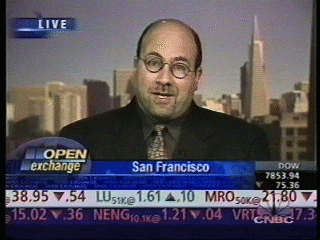
Video and MP3s Of Craig Newmark On CNBC, Friday, February 7, 2003.
Craig talks about trends in job placement etc., as observed on Craig's List.
Here's Ross McGowan Interviewing Democratic Minority Leader Nancy Pelosi last Monday Morning. (January 20, 2003)
Nancy Pelosi Part 1 of 2 (Lo-res 20 MB)
Nancy Pelosi Part 2 of 2 (Lo-res 22 MB)
Audio - Nancy Pelosi (MP3 Lo-res 2 MB)
Audio - Nancy Pelosi (MP3 Hi-res 4 MB)
What perfect timing!
Q&A: Cory Doctorow
Science-fiction novelist on Disney, Whuffie, Napster and what's wrong with San Francisco
By Dylan Tweney, Special to SF Gate.
In your book, you have a sort of alternate currency called Whuffie. The characters are constantly checking one another's Whuffie scores and looking for ways to earn more Whuffie. Can you explain the idea?Well, currency is a way of keeping score today. Whuffie is how much esteem people hold you in. Currency is a really rough approximation of Whuffie. You can't really get a job without esteem. You generally can't get a mortgage with no esteem.
In the book, I have this sort of magical McGuffin technology, which is something that can automatically find out how you feel about everything that you have an opinion on. Then, someone who has a high opinion about me can ask me -- without any kind of conscious intervention -- how I feel about you. They can just ask the network, "How is it that Cory feels about you?" And that gives them some idea of how much time of day they should give you.
It sounds a little like walking around with your bank balance displayed in a box above your head at all times.
Well, it's true. Except, you know, we already do this, in some way. As currency is a rough approximation of your Whuffie, the things that currency affords, like your style of dress, your haircut, all the semiotics of your presentation, are descended from Whuffie. It's just that Whuffie's harder to [fake].
The Internet has made us very socially deviant, in the sense that social norms are enforced by groups. If you have some incredibly strange idea of, for instance, wearing underwear on your head, generally speaking, there is social disapprobation that keeps that factor in check. But on the Internet, you can basically exist in the communication spheres of people who have the same value system as yours, no matter how weird it may be. On the Internet, you don't get that pressure to return to a norm. In some ways, Whuffie is a way to make you more socially normative. It's not necessarily a good thing.
Why did you call it "Whuffie"?
The word is what we used in high school instead of "brownie points." A friend of mine pointed out, given the era that I went to high school in, that it almost certainly came from "The Arsenio Hall Show": "Woof, woof, woof."...
...In the world of "Down and Out in the Magic Kingdom," there's no death, there are unlimited resources, nanotechnology can create any object you desire (including a clone of yourself) and energy is free. What were you trying to accomplish by setting the story in that kind of world?
I wanted to clarify my own thinking about what a non-scarce economics looks like. Keynes and Marx and the great economic thinkers are all concerned with the management of resources that are scarce. If it's valuable, it needs to be managed, because the supply of it will dwindle. You need to avert the tragedy of the commons [the notion that self-interested individuals, such as sheepherders, will always use as much of a common resource as possible, such as a grassy pasture, until that resource is totally depleted].
Today, with things that can be represented digitally, we have the opposite. In the Napster universe, everyone who downloads a file makes a copy of it available. This isn't a tragedy of the commons, this is a commons where the sheep s*** grass -- where the more you graze, the more commons you get.
Here is the full text of the article in case the link goes bad:
http://www.sfgate.com/technology/inquire/
Q&A: Cory Doctorow
Science-fiction novelist on Disney, Whuffie, Napster and what's wrong with San Francisco
Dylan Tweney, Special to SF Gate Thursday, January 23, 2003
San Francisco, California, USA -- Cory Doctorow is a true believer in the power of technology.
His first novel, "Down and Out in the Magic Kingdom," is one of the first works to be published under the Creative Commons license -- an agreement that lets people copy and redistribute the book freely so long as they credit the author -- and is available for download on his Web site. That move puts Doctorow at the forefront of a growing digital rights movement.
Doctorow's novel is like a love letter to Napster, Google and Walt Disney World. It's a rollicking, fast-paced story and is entertainingly inventive without bogging down in the impressive array of future technologies it imagines. "Down and Out in the Magic Kingdom" (also published in hardcover this month by Tor Books) is set in a future where death has been eliminated, energy and raw materials are freely available in limitless quantities (much like MP3 files on KaZaA today) and people's nervous systems are wired directly into the Internet. The protagonist, Julius, works at Disney World, and the novel chronicles his struggles to protect the theme park's Haunted Mansion from being shut down by an ad hoc group of designers who have developed a technology for "flash baking" theme-park experiences directly into parkgoers' brains.
In his day job, Doctorow is outreach coordinator for the Electronic Frontier Foundation (EFF). He's also one of the primary contributors to the popular techie weblog BoingBoing, he co-founded a dot-com, OpenCola, and he has another science-fiction novel and a short-story collection due out later this year.
Like his character Julius, Doctorow is an archetypal geek, from his nerdy Drew Carey-style glasses to the bright yellow cell phone dangling from his cargo pants. I caught up with the prolific (and apparently highly caffeinated) Toronto native in his office at the EFF, where a blueprint of the Haunted Mansion hangs over his desk.
This will make me sound like I'm behind the times, but this is actually the first time I've read an entire novel on screen.
It would make me pretty happy if this book contributed in some way to the idea that reading books on the screen is good. I know that there's a meme that floats around that says, oh, reading off a screen is hard, and no one wants to do it and so on -- despite all the evidence to the contrary. Most of the people I know read off a screen for 12 hours a day.
I won't deny that there's a sentimental frisson of good feeling you get when you pick up a physical, paper book, especially one with your name on it. Books are nice, but they're not as nice as we make out.
I think that, ultimately, the role of books in the world of electronic publishing will be much like the role of live music in the world of recorded-music publishing. We'll still have plenty of paper books, but that will be dwarfed by the enormous size of the electronic-book universe.
You've written several novels, you're at work on two more, you work for the EFF and you've got a popular blog where you post 10 or more items a day. Where do you find the time?
Well, sleep is for the weak. I'll sleep when I'm dead.
The thing about it is that there is synergy. The stuff that I do for BoingBoing is basically research in support of EFF and the writing, and the blog is how I keep track of it. By doing it in public, I get lots of suggestions, and I also get a lot of feedback. BoingBoing is a net time saver because I get more research done with less effort, and I keep track of it better than I would if I were doing it privately.
The research that I do on EFF issues is also feeding the fiction. I published a story last August on Salon called "0wnz0red," about digital rights management and trusted computing. That came straight out of a briefing I got here.
In your book, you have a sort of alternate currency called Whuffie. The characters are constantly checking one another's Whuffie scores and looking for ways to earn more Whuffie. Can you explain the idea?
Well, currency is a way of keeping score today. Whuffie is how much esteem people hold you in. Currency is a really rough approximation of Whuffie. You can't really get a job without esteem. You generally can't get a mortgage with no esteem.
In the book, I have this sort of magical McGuffin technology, which is something that can automatically find out how you feel about everything that you have an opinion on. Then, someone who has a high opinion about me can ask me -- without any kind of conscious intervention -- how I feel about you. They can just ask the network, "How is it that Cory feels about you?" And that gives them some idea of how much time of day they should give you.
It sounds a little like walking around with your bank balance displayed in a box above your head at all times.
Well, it's true. Except, you know, we already do this, in some way. As currency is a rough approximation of your Whuffie, the things that currency affords, like your style of dress, your haircut, all the semiotics of your presentation, are descended from Whuffie. It's just that Whuffie's harder to [fake].
The Internet has made us very socially deviant, in the sense that social norms are enforced by groups. If you have some incredibly strange idea of, for instance, wearing underwear on your head, generally speaking, there is social disapprobation that keeps that factor in check. But on the Internet, you can basically exist in the communication spheres of people who have the same value system as yours, no matter how weird it may be. On the Internet, you don't get that pressure to return to a norm. In some ways, Whuffie is a way to make you more socially normative. It's not necessarily a good thing.
Why did you call it "Whuffie"?
The word is what we used in high school instead of "brownie points." A friend of mine pointed out, given the era that I went to high school in, that it almost certainly came from "The Arsenio Hall Show": "Woof, woof, woof."
Most of the book takes place at Disney World, and the plot centers around various factions' attempts to control the Haunted Mansion there. You seem a little fascinated -- almost obsessed -- with Disney.
(points out a large collection of Disney paraphernalia in his office) Yeah, I'm a little obsessed. There's so much to love and so much to hate about Disney World and about the Disney corporation that it's the perfect obsessive material for someone who wants to mine the cultural space.
I was raised by schoolteachers, and my grandparents were snowbirds. Every winter they would fly south to Fort Lauderdale to a gate-guarded, seniors-only community called Century Village that my dad likes to call "Cemetery Village." We took Christmas breaks in Lauderdale, and it was just about as dull as you can imagine for an eight- or nine-year-old. So we would get in the big, gas-guzzling land yacht that my grandfather drove, and we would go to Disney World for a couple of days. Christmas weekends every year, during my whole adolescence, were spent at Disney World, and I just became completely obsessed with it.
Walt's genius was that he would come up with incredibly novel, innovative things that could only be imitated after a couple of years. Meanwhile, he would have this very healthy margin until his competition figured out what he was doing and drove the price down to a competitive level. Then he would do the next thing. But when Walt died [in 1966], they just stopped doing that. They just started doing the same thing. They basically built a twin of Disneyland in Disney World, but bigger.
There's lots you can say about [Disney chairman and CEO Michael] Eisner that isn't very flattering, but the one thing you can say is that under Eisner's leadership, there has been a definite focus on innovation, at least in Florida. At Disneyland, unfortunately, they brought in these idiot McKinsey consultants, they stopped spending any money on R&D and they bought all these off-the-shelf midway rides, with Ferris wheels, for the California Adventure. They built this incredibly dreary, boring, banal theme park that is like an extremely clean but less fun version of the Santa Monica pier, and, unsurprisingly, it's a ghost town. You could fire a cannon down the main drag without hitting a tourist.
In the world of "Down and Out in the Magic Kingdom," there's no death, there are unlimited resources, nanotechnology can create any object you desire (including a clone of yourself) and energy is free. What were you trying to accomplish by setting the story in that kind of world?
I wanted to clarify my own thinking about what a non-scarce economics looks like. Keynes and Marx and the great economic thinkers are all concerned with the management of resources that are scarce. If it's valuable, it needs to be managed, because the supply of it will dwindle. You need to avert the tragedy of the commons [the notion that self-interested individuals, such as sheepherders, will always use as much of a common resource as possible, such as a grassy pasture, until that resource is totally depleted].
Today, with things that can be represented digitally, we have the opposite. In the Napster universe, everyone who downloads a file makes a copy of it available. This isn't a tragedy of the commons, this is a commons where the sheep s*** grass -- where the more you graze, the more commons you get. So I took the idea of nanotechnology as the means whereby any good can be reproduced infinitely, at zero marginal cost, and tried to use that as a metaphor for the online world we actually live in.
The other side of it is this notion that you never really run out of scarcity. There are always limits on your time and attention, there are only so many people who can fit in a restaurant, only so many people who can converse at once. When you are beset on all sides by entertainment, figuring out which bits are worthwhile requires a level of attention that quickly burns all your idle cycles. When everyone watched Jackie Gleason on Thursdays at 9:30, it was a lot easier -- television watching required a lot less effort than whipping out your TiVo and figuring out which shows you want to prerecord.
What's your approach to writing?
It's really quotidian. I write a page a day, basically. With novels, once I get the first 20 or 25 percent on paper and an outline done, I usually make that semipublic. I have a list of about 200 or 300 first readers, and I e-mail them my page, every day, even before I spell-check it, hot off the word processor. They keep me really honest. When I miss a day, they e-mail me and nudge me.
I had a really successful experience doing that with my second book, "Eastern Standard Tribe" [due out in November 2003]. I wrote that between Aug. 1 and Dec. 12 of 2001, 60,000 words in five months, and actually managed to sell it within a week of my finishing it.
You've lived in San Francisco a while now. How do you like it here?
I've lived here since September of 2000. Right at the height of the boom.
I really miss Toronto. San Francisco's a really dysfunctional place. It has a lot of the downsides of living in a small town and a lot of the downsides of living in a big city, and it misses a lot of the upsides of both of those places. It's very hard to get from one place to another. The mass transit is so-so. Going from the Mission to downtown on foot feels about 10 times as long as it actually is. It's a Jane Jacobs nightmare of freeway overpasses and single-use neighborhoods.
The weather's OK, although it would be nice if the buildings were insulated, because when it's 40 degrees at night and you don't have insulation or central heating, damn, it's cold.
The thing about San Francisco that keeps me here is the people, the technology. This is ground zero for technologists. This is geek mecca, it's nirvana. But I heartily miss the Northeast. You can see the bones of a great city in San Francisco, and there are pockets of it that are like nothing else on Earth, but taken as a whole, it's really dysfunctional.
Also, I can't get my head around the private-medicine thing. I think this explains a lot about the various geek cultures of the U.K., Canada and the U.S. In the U.S., there is tons of venture capital, so everyone went out and started a company. In Canada, there are tons of socialized medicine, so everyone became a freelancer. If you're a freelancer [in the U.S.], and you're in poor health, and you can't get insured, you are embarking on a kind of slow suicide. And then, in the U.K., they had tons of arts grants, so all the geeks became Net artists, and that's why there's all this kind of strange, situationist, British Net art.
I'm told that Canada spends less money per capita giving away health care than the U.S. spends regulating it. So you're spending more money keeping the HMOs honest than it would cost you to give it away. That's a big difference between the American and Canadian mind-sets.
How many downloads of your book have there been so far?
There have been 47,334 from my site. Ninety downloads since we started talking. I hope to break 50,000 today.
That's just moving right along.
Hell, yeah!
Two of my favorite people on the same stage together.

Michael Moore On The Daily Show (Med-res 46 MB)
Michael Moore On The Daily Show (Lo-res 30 MB)
Audio - Michael Moore On The Daily Show (MP3 Hi-res 9 MB)
Audio - Michael Moore On The Daily Show (MP3 Lo-res 5 MB)
For those of you on dial-up lines, I've split the low resolution files into two smaller parts (of the low resolution files).
Michael Moore On The Daily Show - Part 1 of 2 (Lo-res 14 MB)
Audio - Michael Moore On The Daily Show - Part 1 of 2 (MP3 Lo-res 2 MB)
Michael Moore On The Daily Show - Part 2 of 2 (Lo-res 16 MB)
Audio - Michael Moore On The Daily Show - Part 2 of 2 (MP3 Lo-res 3 MB)
Here's a great Daily Show interview from last month with Katrina vanden Heuvel, Editor-in-chief of "The Nation".
I had saved this on my TIVO and sort of forgotten about it until I ran across Katrina's name again reading Michael Moore's latest book. (She's on his dream list of women presidents.)
In the interview, Katrina talks about democracy and freedom of speech and political debate and how there really isn't any anymore.
Jon Stewart is obviously concerned about the state of our country these days. It's so great for him to have important guests like this on television. I only hope that more people will watch.
I think you will find it interesting.
QuickTime video and MP3 audio files below:
Katrina vanden Heuvel on the Daily Show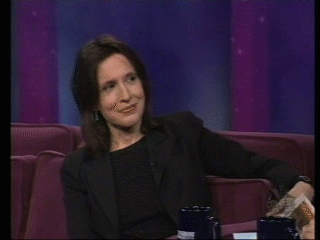
Interview with Katrina vanden Heuvel - Low-res 28 MB
Interview with Katrina vanden Heuvel - Med-res 42 MB
Interview with Katrina vanden Heuvel - Hi-res 55 MB
Audio - Interview with Katrina vanden Heuvel - MP3 6MB
 A Howard Rheingold Trading Card | I went to see Howard Rheingold speak at some bookstore on the Haight a few nights ago -- I've read excerpts from a friend of mine's copy of Smart Mobs: The Next Social Revolution, and I can already highly recommend it. |
This is not to say that smart mobs are wise mobs. Not all groups who use new technologies to organize collective action have socially beneficial ends in mind. Criminals, totalitarian governments, spammers, will all be able to take advantage of new capabilities -- just as the first to take advantage of tribes, nation-states, markets, networks included the malevolent as well as the cooperative.
Here is the full text of the interview in case the link goes bad:
http://engaged.well.com/engaged/engaged.cgi?c=inkwell.vue&f=0&t=166&q=0-
[Goto Topics List]
Conference Banner
Howard Rheingold, Smart Mobs
Topic #166, 83 responses, 0 new, Last post on Mon 25 Nov 2002 at 08:09 AM
inkwell.vue 166: Howard Rheingold, Smart Mobs
#0 of 82: Jon Lebkowsky (jonl) Thu 21 Nov 2002 (07:24 AM)
Howard Rheingold was an early Internet adopter who understood quickly how
computing and 'net-based communication could enhance human capabilities. This
fed into an interest in human potential that led Howard to create or
co-create such works as _Higher Creativity_ (1984), _The Cognitive
Connections_ (1986), and _Excursions to the Far Side of the Mind: A Book of
Memes_ (1988). Howard became involved in the WELL in 1985, and this led to
his authorship of _The Virtual Community_, a book about his life online and
the potential for community in cyberspace. Howard was editor of Whole Earth
Review for several years, and of the Millennium Whole Earth Catalog, which
was published in 1994. Howard was the first Executive Editor at HotWired,
but left to build Electric Minds, which was more of an online community/jam
session than a magazine. Howard continues to explore the human impact of new
technologies in _Smart Mobs: The Next Social Revolution_, which explores the
impact of increasingly ubiquitous wireless communications devices on social
networks, and the evolution of moblike adhocracies that can be either
positive or destructive.
Bruce Umbaugh leads the discussion with Howard. Bruce is a philosopher who
teaches at Webster University's main campus in St. Louis (MO, USA) and via
the Net. His interests include computer ethics, epistemology, philosophy of
science, cognitive science.
Please join me in welcoming Bruce and Howard to inkwell.vue!
inkwell.vue 166: Howard Rheingold, Smart Mobs
#1 of 82: virtual community or butter? (bumbaugh) Thu 21 Nov 2002 (07:44 AM)
Thanks, Jon.
Howard, I've really enjoyed your book. The ideas you're pursuing are as
interesting and engaging as anything I've come across in awhile. So, it's
exciting to have the chance to talk with you here about all this.
I think one of the first things likely to occur to anyone bumping into
*Smart Mobs* is that the title itself is a bit jarring. We usually think of
"mobs" as dumb (and in part for that reason dangerous). We often think of
only individuals as "smart." So a place to start is asking you what smart
mobs are.
inkwell.vue 166: Howard Rheingold, Smart Mobs
#2 of 82: Howard Rheingold (hlr) Thu 21 Nov 2002 (12:01 PM)
The briefest definition is that a smart mob is group of people who use
mobile communications, PCs, and the Internet to organize collective
action. That doesn't mean a whole lot without unpacking it. Maybe it will
help for me to briefly describe the clues that led me to suspect that we
are at the beginning of an important social-technological revolution.
In Tokyo, in early 2000, I couldn't help noticing that so many people were
looking at their telephones rather than listening to them -- and many were
using their thumbs to send text messages to one another. Interesting --
but there are many interesting sights in Tokyo. I recalled this unusual
sight (unusual for American eyes -- elsewhere in the world, around 100
billion text messages are transmitted every month) -- when I found myself
in Helsinki a few months after my Tokyo experience. I was sitting at an
outdoor cafe, drinking a cup of coffee, when three Finnish teenagers
encountered two older adults -- maybe the parents of one of them -- right
next to where I was sitting. I had no idea what they were saying -- they
were speaking Finnish -- but I noted that one of the teenagers glanced at
his mobile phone (all Finns carry their telephones in their hands and
glance at them from time to time) and smiled. Then he showed the telephone
display screen to the other two teenagers, who also smiled -- but he did
not show it to the other, older, adults. And all five of them continued
conversing as if this was normal.
I started asking around, and both my Japanese and Finnish friends told me
that many young adults "flocked" -- showed up at the same mall or
fast-food joint at the same time from eight different directions --
because they had coordinated and negotiated through flurries of text
messages.
Again, this was curious, but not world-shaking. I started doing some more
serious research when I read reports about the "People Power II"
demonstrations in Manila. The Estrada government was accused of
corruption, and everyone in the Philippines was glued to their TV set for
a time, like Americans during the Watergate hearings, as the Philippine
Congress investigated Estrada. When Senators linked to Estrada abruptly
shut down the hearings, tens of thousands of Philippine citizens started
gathering in EDSA -- the same square where the anti-Marcos demonstrations
had taken place. But they showed up within minutes -- almost all of them
wearing black. In hours, millions showed up. It was all summoned and
coordinated by text messages. Telephone trees are old organizing tactics,
but cumbersome compared to texting. Once you get a text message, y ou can
forward it to everyone in your address book.
I realized that the flocking teenagers and the demonstrating Filipinos
were taking advantage of a recently-lowered threshold for collective
action. And when I looked into collective action, I realized that much
more could be in store. It was when I understood that the mobile
telephones so many people carry are becoming miniature computers and
Internet terminals that I began to realize that we are on the verge of the
third great wave of change, following and building upon -- and going far
beyond -- the PC and Internet waves.
inkwell.vue 166: Howard Rheingold, Smart Mobs
#3 of 82: virtual community or butter? (bumbaugh) Thu 21 Nov 2002 (01:28 PM)
So these "mobs" depend on particular technolgies in order to exist as
mobs. (And to be "smart" as well? Or is the smart part human, rather
than technological?) And they differ from what preceded them relying on
the Internet and PCs in being mobile (and relatively ubiquitous).
Anything else that's distinctive about the tech?
And why is this revolutionary, rather than just more of the same?
inkwell.vue 166: Howard Rheingold, Smart Mobs
#4 of 82: Howard Rheingold (hlr) Thu 21 Nov 2002 (01:47 PM)
Let's talk about the big picture for the moment: communication
technologies, social contracts, and collective action.
For a LONG time, humans hunted small game and gathered roots and berries
in small family groups. At some point, not all that long ago in our
evolutionary history, those family groups began to cooperate with others
who weren't directly related to them, organizing big-game hunts -- a form
of collective action that brought in more meat than any one family could
eat before it spoiled, thus creating the first public goods. Whenever a
means of communication, a social contract that enables people to trust one
another on a new scale, and collective action produce new public goods,
human society becomes more complex: agriculture, alphabets, printing
presses, etc. The printing press broke out the secret code of the
alphabet, which had been invented by the accountants for the first great
empires and had been reserved for the ruling elite for millennia. Within a
couple centuries of the emergence of literate populations, the collective
enterprises of self-governance and science emerged.
The Internet enables people to connect with strangers in other parts of
the world, getting together around shared affinities -- the whole virtual
community story. Ebay adds a reputation system, and a new market emerges.
Peer to peer methodologies enabled 70 million people to share their hard
disk space via Napster, and 2 million people to amass 20 trillion floating
point operations per second of CPU power to search for messages from outer
space.
What will happen when billions of people carry devices that are thousands
of times more powerful than today's PCs, linked at speeds thousands of
times faster than today's broadband connections, perhaps with distributed
reputation systems that enable us to find people with whom we have some
common cause -- on the fly, in the real world? That's the essential
question of smart mobs. The flocking teenagers, the Philippine
demonstrators, the Napster and SETI@home and eBay crowds -- they are only
the first outbreaks. After all, the PC I used when I first joined the Well
in 1985 had 640K RAM and communicated at 1200 baud. Now, fifteen years
later, I can access the Well from a handheld device (I use a Treo 300)
that is a thousand times more powerful, and a fifth the price. And the
speed is probably a thousand times faster.
This is not to say that smart mobs are wise mobs. Not all groups who use
new technologies to organize collective action have socially beneficial
ends in mind. Criminals, totalitarian governments, spammers, will all be
able to take advantage of new capabilities -- just as the first to take
advantage of tribes, nation-states, markets, networks included the
malevolent as well as the cooperative.
inkwell.vue 166: Howard Rheingold, Smart Mobs
#5 of 82: virtual community or butter? (bumbaugh) Thu 21 Nov 2002 (02:33 PM)
One aspect of the historical arc you're describing, Howard, is the
diminishing importance of geography or physical proximity in organizing
human affairs (or collective action, at any rate). Once upon a time,
our mates were limited to our mates (and offspring and forebears).
Spoken language made coordination and a host of personal relationships
feasible with others near enough to speak with. As communications
technologies developed, larger groups could work together across
distances.
Two important constraints were (1) a time lag that limited the pace of
activity and (2) central control over the technology (early on a
matter of limiting literacy, later owning the press or antenna) that
could try to limit who communicated and what.
PCs and the Net have made a serious dent in the second (setting aside
digital divide issues for the moment, but knowing we'll get back to
them): everyone's a publisher now. (I remember you made the point
forcefully in *The Virtual Community* that it was important to preserve
the ability to communicate "upstream" on the Net for that value to
flourish.)
PCs and the Net have surely altered the first radically, as well,
checked to a degree by the need to be at a jack in the wall to be
online.
But the new technologies you're describing are faster and nimbler. And
they travel with us. So they allow coordination with arbitrary people
wherever they are (without even having to meet them). They allow
coordinating right past other people who are physically near (as in
your Finnish teens example).
That change of pace and transformation of geography (replaced, I
guess, by various network topographies and other relationships?) does
seem profound. It would be surprising if our existing social norms and
habits regarding privacy, trust, and so on, proved to be easily applied
right out of the gate for dealing with this new arena.
If these technologies stand to empower some people (or The People),
that must threaten some other people. That was obviously true about
literacy and printing, and almost everyone reading Inkwell will be
familiar with the last decade of political wars over the Internet.
Are we on the brink of the greatest power struggle since the discovery
of fire?
inkwell.vue 166: Howard Rheingold, Smart Mobs
#6 of 82: Howard Rheingold (hlr) Thu 21 Nov 2002 (02:35 PM)
One other element regarding my contention that we are at the beginning of
a revolutionary wave of change: Mobile telephones, which are quickly
morphing into portable Internet terminals with significant and growing
onboard computation power, are used by people who have not had access to
PCs and the Net, and are used in parts of our lives that computation on
online communication have not reached.
One in eight people in Botswana have mobile telephones.
Six weeks ago, in Sao Paolo, I saw barefoot people in the slums talking on
their mobile telephones.
Somali traders of the coast of Dubai make deals via telephoneIn rural
Bangladesh, the mobile telephone has been introduced via payshops run by
local women -- and the shops have become new social centers.
The PC (except for laptops) and the Internet have been confined to
desktops. Now we carry computation and online communication into the
streets, automobiles, trains -- places where computing and instant global
communications were not available before.
inkwell.vue 166: Howard Rheingold, Smart Mobs
#7 of 82: Howard Rheingold (hlr) Thu 21 Nov 2002 (02:45 PM)
(Bruce slipped while I was adding that last post)
Part of Smart Mobs examines the relationship between knowledge,
communication and power -- most famously pioneered by Foucault -- and the
power struggles that cut through the many technological and sociological
issues raised by smart mobs. Central power versus decentralized power is
an ongoing arms raised. The Internet is now the site of control struggles:
Cable companies are merging, resisting wireless rebroadcast of bandwidth,
petitioning for the right to discriminate against content from competing
providers. Control over the root domain servers could grant what had
previously been considered technically impossible -- control of the Net.
The Hollings bill, the DMCA, trusted computing initiatives purport to be
about intellectual property, but they are most centrally about control of
innovation -- will a 19 year old dropout be able to shape the new medium
and become the richest person in the world, will a Swiss physicist be able
to reconfigure the entire network because he gives away an idea, or will
the innovators of tomorrow have to be employees of Sony, Disney, or
AOL-Time-Warner? The anti-WTO protestors in Seattle won that battle in
part through the use of smart mob technologies; not too long after, the G8
summit was held in a remote part of Canada, and wireless communications
were blocked locally. Will top-down schemes like 3G bring wireless
broadband to the masses, or will it grow fromt he ground up via Wi-Fi
networks? Will the FCC continue to favor today's telcos and broadcasters
and regulate spectrum according to the technological regimes of the 1920s,
or will Wi-Fi, cognitive radio, ultra-wideband technologies force a
radical restructuring of the way spectrum is regulated? There are power
struggles between political power holders and the disenfranchised, between
existing business models and disruptive innovations, between content
aggregators are consumers. It wouldn't be wise to be too optimistic.
Unless citizens gain a great deal more knowledge, and wield a great deal
more influence than we wield today, it doesn't take a prophet to predict
that the powers that be will win these battles. I wrote this book not
because I believed that disseminating knowledge of these struggles will
guarantee a victory for liberty and for tomorrow's entrepreneurs and new
technologies, but because I am convinced that without widespread knowledge
of the stakes and the players, entrenched interests will certainly win.
inkwell.vue 166: Howard Rheingold, Smart Mobs
#8 of 82: Howard Rheingold (hlr) Thu 21 Nov 2002 (02:46 PM)
(I meant "arms race" instead of "arms raised" -- interesting Freudian
slip).
inkwell.vue 166: Howard Rheingold, Smart Mobs
#9 of 82: virtual community or butter? (bumbaugh) Thu 21 Nov 2002 (02:59 PM)
Well, that's a great image, anyway.
. .
\o/
|
/ \
Can you say a little more about one of the examples in there? Maybe
one of the more hopeful scenarios for now--cognitive radio or WiFi
networks? What are they, how do they stand to help the causes of
liberty and entrepreneurship?
inkwell.vue 166: Howard Rheingold, Smart Mobs
#10 of 82: Howard Rheingold (hlr) Thu 21 Nov 2002 (03:13 PM)
Our crusty old Wellite, Dave, is in the thick of the battle over spectrum
regulation.
Disclaimer: I think I do a pretty good job at perceiving broad patterns,
but I make no claim to technical expertise. Perhaps a less polite way of
describing me would be "ten miles wide and a quarter of an inch deep."
The FCC was set up to regulate the spectrum on behalf of its owners -- the
citizens. It happened in the wake of the Titanic disaster, where
"interference" was an issue. Radio waves don't physically interfere with
each other -- they pass through each other. But the radios of the 1920s
were "dumb" insofar as they lacked the ability to discriminate between
signals from nearby broadcasters on the same frequencies. So the regime we
now know emerged -- broadcasters are licensed to broadcast in a particular
geographic area in a particular frequency band. For the most part,
licenses to chunks of spectrum are auctioned, and the winner of the
auction "owns" that piece of spectrum. We have seen in recent years that
the owners of broadcast licenses have amassed considerable wealth, and
that those owners have consolidated ownership in a smaller and smaller
number of more and more wealthy entities. And of course, political power
goes along with that wealth. These aren't widget-manufacturing industries.
These are enterprises that influence what people perceive and believe to
be happening in the world.
Recently, different new radio technologies have emerged. Cognitive radios
are "smarter" in that they have the capability to discriminate among
competing broadcasters. Software-defined radio makes it possible for
devices to choose the frequency and modulation scheme that is most
efficient for the circumstances. Ultra-wideband radio doesn't use one
slice of spectrum, but sends out ultra-short pulses over all frequencies.
It is possible now to think of "intelligent" broadcast and reception
devices that use the spectrum in a way similar to the way routers use the
Internet: devices can listen, and if a chunk of spectrum isn't being used
by another device for an interval (millionths or billionths of seconds),
the device can broadcast on that frequency; reception devices are smart
enough to hop around and put the digital broadcasts together, roughly
similar to the way packets assemble themselves as they find their way
through the Internet. Again, let me caution that there are probably many
people who read this who can point out gross technical generalizations and
slight inaccuracies in this description. The point, however, is that
spectrum no longer has to be regulated the way it used to be. Politically,
however, those interests that benefitted from the traditional regime have
the ear and pocketbooks of rulemakers, whether they are regulators or
legislators. Yochai Benkler at Yale has proposed an "open spectrum"
regime, and Lawrence Lessig has discussed a mixed regime, in which parts
of the spectrum continue to be owned and sold the way they have been, but
other parts are opened to be treated as a commons.
Now the notion of a commons extends beyond spectrum. Indeed, part of Smart
Mobs is about the way biologists, sociologists, economists,
mathematicians, political scientists have begun to converge on issues of
collective action, problems of commons, the evolution and maintenance of
cooperation.
inkwell.vue 166: Howard Rheingold, Smart Mobs
#11 of 82: Howard Rheingold (hlr) Thu 21 Nov 2002 (03:37 PM)
As for Wi-Fi, as I note in the book, there are some problems with scaling
-- "interference" problems among them. But the interesting part is that
you can put a $100 box on your cable modem or DSL line and broadcast
broadband Internet access in a sphere of a couple hundred feet to a couple
hundred yards. If you use inexpensive directional antennae (most
notoriously constructed from Pringles cans), it is possible to extend that
range to several miles. Anyone with a $100 (and dropping) card in their
laptop can tap into that bandwidth. You can go to Bryant Park or
Washington Square Park or a dozen other locations in New York City and
similar "hotspots" in other cities around the world and tap into WiFi
access points that have been deliberately or inadvertently left open.
The community wireless movement combines the many to many publishing
capabilities of the web with Wi-Fi: put up an access point, send someone
an email, and it appears on a website map. Some parties, notably certain
cable providers, don't like that at all. To them, it is theft, and breach
of contract. NYC Wireless legallyprovides bandwidth in public places in
NYC because they can find upstream ISPs that are happy to give them a
contract that permits bandwidth sharing.
An economic case can be made that WiFi access could be provided
cost-effectively as a municipal utility. It's certainly useful, and
definitely orders of magnitude less expensive to provide than water or
power or sewage. Dave Hughes has been selling the Welsh parliament on a
scheme to blanket the entire country with WiFi access.
If you would like to attract young, entrepreneurial, culturally
interesting people to your part of a city, one way to do it would be to
put up WiFi hotspots, and they will begin congregating. This is a larger
issue -- cellphones and wireless Net access are changing the way people
use cities. I get into this at slightly greater length in the book.
Some will argue that there are flaws and inefficiencies to WiFi, and so
far, it operates in only a small slice of spectrum allowed for unlicensed
operation. But as Larry Lessig says, the 1200 baud modem wasn't an
efficient means of accessing the Internet, but it was a catalyst and a
bridge to applications and innovations that helped create the broadband
Web as we know it.
So far, for the most part, WiFi has been a grassroots phenomenon driven by
amateurs and enthusiasts. However, telcos in Japan and Korea are getting
into it in a big way, as a supplement to or substitute for more costly 3G
infrastructure. And here in the US, ATT and Intel are teaming up to
provide tens of thusands of hotspots. Interestingly, Larry Brilliant,
cofounder of the Well, is deeply involved in that.
All I can say is that my world changed when I could sit and write barefoot
in my backyard (as I have been doing since the first PowerBook) and not
have to trot into the house for Net access.
inkwell.vue 166: Howard Rheingold, Smart Mobs
#12 of 82: Howard Rheingold (hlr) Thu 21 Nov 2002 (04:09 PM)
Here's an interesting back-of-the-envelope speculation.
Some people think the PC took off in the marketplace when the price
dropped down to around the average monthly salary of the American middle
class consumer -- around $2000/month.
The average monthly income of the world is around $40.
Moore'slaw is going to drive the price of today's handheld PC -- itself
around 1000 times more powerful than the first PCs of 20 years ago -- to
around $40 in about 6-7 years. And that included broadband wireless
capabilities.
inkwell.vue 166: Howard Rheingold, Smart Mobs
#13 of 82: Dave Hughes (dave) Thu 21 Nov 2002 (10:27 PM)
bumbagh says in 3 "...why is this revolutionary, rather than just more
of the same.'
Forget the digital technology. Start with the human communicative
technology that has been with us for millions of years. The voice,
produced in the throat, is technology. Hearing, through ear-drums
is technolgy.
With those two only, humans could 'communicate' going from grunts
to words. But only within limited ranges - a few dozen feet, except
for shouts. So human 'groups' stood, sat, lay in close proximity
to each other, and organized themselves.
Sight is technology. And real time. And while one can 'see' far,
one must be pretty close to 'see' detail. And signalling came
out of that. From hand waving to semaphore flags or smoke signals.
All technology beyond what animals did except in the most primitive
forms.
Then drawings were made on cave walls. Pictures. Followed by symbols.
Fixed on walls or rocks.
So while groups of people moved (while hunting, for example) they
took, thanks to the technology of memory, images, sounds, ideas
to other groups.
But it wasn't until symbols - early languages - were put on either
practical pots, or carryable tablets - that ideas could move
between groups, independent of who was carrying them.
So cultures arose, limited and circumscribed by natural boundaries
of course, but kept alive and evolving because of human forms
of 'communications.'
Then came light paper, writing surfaces, making carrying easier. And
scribes painfully duplicating the important ones in small numbers.
Then of course, the printing press. Lots of copies, widely
distributed.
All 'technology.'
And then voice over a wire - a telephone. Two way, interactive, but
perishable. Then came teletype - printed words over wires. Opening
when coupled with mass printing, whose new ways people 'related'
to each other in local groups, neighborhoods, towns, cultures,
nations.
Then came radio and television. Essentially ONE WAY broadcast
'communications.' From the center out. The edges being passive
consumers of what communications brought.
Then came personal computers, permitting individuals to write
and locally publish. Followed by modems.
But THEN the erstwhile 'consumer' could become (1) a producer
(2) organize with others at a great distance, (3) become part
of 'other' than their primary, and/or local 'group.' Even
many groups. And with the speed, low cost and ease of being,
even only for a few minutes, part of a scattered 'group' which
does not recquire 'real time', but 'asynchronous' dialogue, with
this 166 is, individuals could become intimate parts of large
numbers of groups. Groups which cut across local physical lines,
town lines, state/regional lines, national lines - and someday
galactic lines.
BUT, almost ALL communciations by modem, PC, to/from others was
a commercial activity. Telephone and ISP 'services.'
Then came the kind of unlicensed, spread spectrum, secure,
digital, wireless, communications in which the only key
cost was the price of ones wireless device - radio - attached
to a pc, a laptop, a mobile pda.
i.e. between two points, which can be 1, 10, 50, 75 miles apart
from each other, the 'communications' AND in voice, sound,
written, image, or running video form, as cheaply as when
the first humans 'talked' to each other!
And linking these local 'last mile free' links capable of - soon
now - communicating what is in one mind to that of another
with bandwidth as wide as the human brain can function with
communciating with another, THAT I propose is Revolutionary.
Mind to Mind communications. Limited NOT by the speed, cost,
or bandwidth of the devices - wired, wireless, processor -
but by the natural limitations of the mind to concentrate
on the act of communications with another mind.
So THEN groups will begin to function very differently.
My goal, as Howard may recall, 23 years ago, was, and still is,
to connect up all 6 billion minds on this planet to each other.
We have the technology, can afford the scale.
Will that be good? How the hell would I know. It would be,
in human organizational terms, DIFFERENT, from all that went
before.
I think its an experiment worth trying.
inkwell.vue 166: Howard Rheingold, Smart Mobs
#14 of 82: Dave Hughes (dave) Thu 21 Nov 2002 (11:26 PM)
Howard, in #11 above, notes "Dave Hughes has been selling the Welsh
parliament on a scheme to blanket the entire county with WiFi access"
Not exactly. I started by showing Welsh people in local Pubs how
they could connect up themselves broadband to the Internet,
wirelessly, from every farmhouse. The word spread - from the bottom
up. Welsh BBC (SC4) came to film me in Colorado. The word spread
further. Always built on the boast I made in a tiny pub on New Years
Eve 1997 in a tiny pub, in a tiny village (Cymduad) one pub, one
chapel, one inn that 'I could connect up every farmhouse in Wales
to the Internet, broadband, bypassing hated British Telecom, cheaply,
by turning every Welsh pub into a wireless ISP.'
After the Welsh National Assembly (their parliament) heard British
Telecom tell the English Parliment, that unless the government
subsidized them with millions of pounds, there was no way theu
could bring broadband to rural England (including Wales, of course)
until 2022. So the Welsh National Assembly, in effect said "To hell
with that. Where is that crazy American"
So they paid for me to come over there, make 12 presentations in 5
days, with dinners, before government, geeks, university aundiences,
civic leaders, south to north. And do a 'model' valley wirelessly.
And the PEOPLE demanded that the Assembly get them wireless. I only
had to convince the 2d Minister one on one that I knew what I was
talking about - technologically, economically, regulatorily (British
and European Union Radiocomms) - AND CULTURALLY, before he popped
for 100 million pounds for Broadband for Wales, with a big component
of linked satellite-wireless, and a few bones thrown to BT for ADSL.
I guess I organized a smart mob. I intentionally worked from the
bottom up, not top down. And I drew on all my limited, but historical,
knowledge of Welsh culture, derived from my desultory survery of
its history through the 600 years I can trace my ancestory, (as much,
since 1996 via the soc.culture.wales newsgroup as any other way.
So I said 'You Welsh like your 'communities.' And you like to do things
by 'councils.' So what is the old Welsh word for 'community?' F-r-o
fro. And how many communities are there with a radius of no more than
3 miles (a nice wireless distance). 600, they calculated.
'Good, I said. We shall have e-Fro's. 600 e-fros, each one organized
into a non-profit e-fro Council, which shall own the server, the
base radio, and be legally responsible for the upstream link. And
the SERVER at the center of each community, shall reflect the unique
culture (in Welsh and English or whatever) of THAT one e-fro community.
And you can then relate to each other, wirelessly, across the community
go out to the Internet, and grow on your server what you want the
rest of the world to see and know a about you. And sell or give to
the world what you have, or are. Your music, your stories, your
bardic traditions, your writings, your history, your castles, your
sheep, your nurse's shawls, and slate wall hangings. And your
Welsh language.
Well, it appears to have hit a deep nerve midst the Welsh people.
For I started with their culture, their being, and only used wireless
and technology to express it, to make it valuable to others.
Although I must admit here, that even though I am 4th generation
American, from 13 generations of Welsh on my grandfathers side (Dafydd
ap Hugh, 1585), and about 17 generations on my grandmothers side
(Owen Tudor, 1485) I share with them the feeling of being oppressed
by the haughty English. So with malice aforthought am seeing whether
'Electronic Wales' can become independent of England. So smart
mobbery may turn out to be a bit more than that in the long run.
(You can see the e-fro formal program at www.e-fro.cd, text, stills,
and videos on a couple of my speeches.)
So, Howard, a slight course correction to my electronic activism in
Wales. I am only doing what the Welsh people say they want to do -
get connected, become prosperous, retain their culture.
inkwell.vue 166: Howard Rheingold, Smart Mobs
#15 of 82: virtual community or butter? (bumbaugh) Fri 22 Nov 2002 (08:09 AM)
Dave, thanks for joining us! Great recap of the history of technology.
Dewayne Hendricks gave a talk at Computers, Freedom, and Privacy,
called, "Are the Tools the Rules? The Future of the Digital Commons,"
on wireless spread spectrum and cognitive radios. We talked about it in
inkwell.vue topic 146, "On the Scene: CFP 2002"
http://engaged.well.com/engaged.cgi?c=inkwell.vue&f=0&t=146&q=101-113
One thing that's gone on, putting together Howard's post and Dave's
second one, is that governments have treated spectrum as a scarce
resource. But it doesn't have to be, right? Or not so scarce, at any
rate. Which means that the current situation of consolidation of power
over telecommunications in the hands of the few is historical artifact
rather than law of nature.
We're envisioning truly democratic -- even populist -- telecom policy
here.
But that threatens entrenched Powers That Be. And as a commons brings
with it a lot of problems about coordination and collective action. To
unbelievably mind-boggling extent if we're looking at this as a truly
global phenomenon by the end of the decade.
So, I find myself looking for examples that might show how we
coordinate activities using these means.
How, for example, are rules set for the Welsh e-Fro councils and how
are the councils coordinated? Do they translate cross-culturally?
How does a social network like eBay or Slashdot (or the Well)
facilitate cooperation and distributed collective action? What can
other networks learn from them?
inkwell.vue 166: Howard Rheingold, Smart Mobs
#16 of 82: Dave Hughes (dave) Fri 22 Nov 2002 (08:39 AM)
I have to be gone most of the day, so won't check back here until
evening.
I suppose, in sum, I have always tried to fit Technolgy to Cultures,
and not Cultures to Technology.
Knowing full well that the spread of technologies, such as grass roots,
powerful, but affordable wireless communications devices, will itself
'change' over time, cultures. Whether for good or ill remains to be
seen. One of my sons reminds me of the Tower of Babble. Another of
the Time Sinks. Another of the Coursening of Discourse, online -
the flaming, the vulgarity.
And sometimes I wonder whether I *really* want to know what's in
other's minds. Often a very ugly scene. That perhaps I, like lots
of people, would prefer the 'myths' of others 'communicated' by
their carefully groomed dress, speech, appearance, manners. The
historical way humans have evaluated each other.
And there is another, recent, phenomonon. Noted by Alvin Toffler
in Future Shock a good 30 years ago. Accelerating change. Which
technology merely speeds up. And creates even more seperation
even within age groupings from otherwise cohesive local communities.
Which permits individuals to 'live' physically, on one place, and
interrelate on a face to face basis with others locally, while
'living' in their minds, thanks to interactive telecom, with one
or more physically distant, and even totally scattered, 'groups.'
Mobs?
Is that an absolute good? Or does the human psyche 'need' the
reinforcing attributes of 'place?'
I have been online a long time. 22 years at least, every day to
one extent or another. I have read (give or take 10%) over
500 million words online. And written nearly 30 million words
online (a reporter having trouble understanding me, once helped
me work out the numbers). I've been in many 'virtual gatherings'
all over the world.
But I also spent 10 years bringing a run down old Victorian brick
neighborhood back from the dead, and my very high tech offices
with all my advanced wireless devices, is in a brick building
in my small-scale (3 blocks long) Old Colorado City neighborhood.
Which has fostered, as I thought it would, a 'high tech, high touch'
place, which balms my soul while my mind has to starwars itself
across cold space with ultra-modern design (ergonomically) tools.
And my small company, which is in one of those buildings, and has
been for 18 years - same leased space - is a virtual company.
Nobody is IN the office daily, even though I live only 2 short
blocks from it. Our staff is scattered from Dallas to Richmond.
So I am not one to embrace, willy nilly, the Great Promises
of ubiquitous, global, low cost or even free, wireless aided
connectivity. Without putting it all in the context of human
culture and psychic needs - which have not been erased by
technological tools. Evolutionarily, eventually? Maybe. But
802.11b - 11mbps to 802.11a - 56mbps took less time than it
took my fingernails to grow to where I needed to clip them.
And every smart mob may be light years from the next one,
in terms of personal, group, human, social, ethical, legal,
political, values.
Gotta stop now and walk to my office. A rare thing, as I work
best right here at T-1 speed TO and THROUGH my office,
wirelessly, 902-928mhz (not 802.11b, which wouldn't punch
through the trees and brick building between my home and my
office).
inkwell.vue 166: Howard Rheingold, Smart Mobs
#17 of 82: Howard Rheingold (hlr) Fri 22 Nov 2002 (09:40 AM)
Economists have told me that eBay is a market that shouldn't exist because
the buyers and sellers, separated by hundreds or thousands of miles, who
have never met and may never meet and might never engage in another
transaction, each take the risk that the first mover will get stiffed --
the person who sends the check won't get the merchandise (or it will prove
to be less valuable than the seller claimed, or in worse condition) or the
person who sends the goods won't get paid. A classic Prisoner's Dilemma,
and an example of a collective action dilemma (rational self interest can
lead to collective disaster). A very simple reputation system on eBay
enables a multibillion dollar market to exist where none had -- or could
-- exist before. There are ways to game eBay's reputation system, and ways
to guard against gaming -- another classic arms race.
Slashdot's moderation and metamoderation system is another reputation
system that attempts to solve a problem inherent in online discourse --
vandals, trolls, and idiots can drive down the signal to noise ratio,
discourage people who have something valuable to say, and diminish the
value of the forum. Without compromising the freedom of any moron with a
modem to spew, Slashdot makes it possible to filter out the noise. Again,
the system is far from perfect, and while it makes it possible to tune out
the noise, it doesn't necessarily raise the level of the discourse, it
does balance freedom of speech versus the limited attention of
discriminating readers.
Will reputation systems evolve? Can they be applied to mobile, peer to
peer communications and transaction systems? I devote a chapter to the
question.
BTW, there are a lot of resources at
posted the bibliography, searchable by keyword and by chapter, and blogged
references are archived by category. If you are interested in the state of
reputation systems, you can start with the references there.
Wellite Fen LaBalme has been working for years to develop open-source
reputation systems: Enchancing the Internet with Reputations, for example:
inkwell.vue 166: Howard Rheingold, Smart Mobs
#18 of 82: virtual community or butter? (bumbaugh) Fri 22 Nov 2002 (10:25 AM)
The focus on reputation systems is really important. One of the things that
Axelrod's work showed was that iterative games are significantly different
from one-off games. Various ugly strategies might be successful in single-
round games but fail terribly when the game is repeated.
eBay, /., and the Well take various approaches to making participants
identifiable from one encounter to the next, but most transactions at ebay,
say, don't depend on any ongoing relationship between the parties.
Reputation systems kind of consolidate series of transactions between
disparate parties into a metric that does the work of iteration in Axelrod's
games. So, even if I don't expect to do a deal with you again, I still have
to deal with the consequences of doing you wrong.
The eBay and Slashdot reputation systems are both top down -- they're
features of the code developed centrally. Are there bottom-up reputation
systems we should pay attention to? How are they different?
inkwell.vue 166: Howard Rheingold, Smart Mobs
#19 of 82: Christian Crumlish (xian) Fri 22 Nov 2002 (10:26 AM)
just an etymological aside: isn't the word mob itself derived from
"mobile" or its Latin cognate, denoting a moving crowd of people?
inkwell.vue 166: Howard Rheingold, Smart Mobs
#20 of 82: virtual community or butter? (bumbaugh) Fri 22 Nov 2002 (10:31 AM)
Howdy,
inkwell.vue 166: Howard Rheingold, Smart Mobs
#21 of 82: Christian Crumlish (xian) Fri 22 Nov 2002 (10:41 AM)
happy to be here! i think i have my own inkwell thingy starting today
but i don't see it yet, and this is as copasetic a place to hang out on
the Well right now as i can imagine.
inkwell.vue 166: Howard Rheingold, Smart Mobs
#22 of 82: Howard Rheingold (hlr) Fri 22 Nov 2002 (12:10 PM)
I didn't know that, Christian! I appreciate the opportunity to learn.
Thanks.
Some interesting preliminary work has been done on distributed reputation
systems by a group at the University of Oregon in Eugene: Disseminating
Trust Information in Wearable Communities
and there's more in the way of bibliographic citations at:
This whole issue is a critical uncertainty: Moore's Law, Metcalfe's Law,
and Reed's Law give me confidence that we will see very large numbers of
computationally powerful, mobile, wirelessly-linked devices over the next
ten years. It is less clear to me that reputation systems will evolve to
become a useful kind of "glue" that will enable the people who carry and
use these devices to assemble carpools, marketplaces, and other social
networks. Even though it's early, and the sources I've cited indicate that
economists and computer scientists are actively studying online reputation
systems, I see at least one problem: It's easier to get a bad rep --
fairly or unfairly -- than to redeem that bad reputation. Ask anyone whose
credit rating has been dinged through identity theft or error. And where
is the possibility of redemption -- a formerly bad actor reforms? Clearly,
these questions must involve both social and technical disciplines.
I've tried to make the book and blog a good resource for others in
different disciplines who are interested in pursuing these questions, and
who need to be aware of what others are doing. Smart mob theory, but its
nature, must be interdisciplinary.
inkwell.vue 166: Howard Rheingold, Smart Mobs
#23 of 82: Howard Rheingold (hlr) Fri 22 Nov 2002 (12:16 PM)
Another important aspect of reputation systems is that truly useful and
widescale systems are going to have to use some kind of implicit metric:
only geeks tweak preferences. However, as Marc Smith has shown with
Netscan
lot with implicit measures. As Smith says: "Don't watch what people say --
watch what they do."
For example, Boeing has close to 80,000 employees in the Seattle area.
They pay the city a lot of money (as does Microsoft) for the wear and tear
on transportation systems that this headcount represents: there is an
incentive for ridesharing. A simple reputation system might make it
possible with technology that exists today (mobile, location-aware
devices) to say to your telephone: "I am leaving my house right now and
driving to my office. Who along my exact route is looking for a ride right
now -- and has a reputation for being trustworthy and reasonably
interesting to ride with?" A simple example: People whose riders tend to
ride with them once and once only are probably less valuable than people
whose riders repeat; conversely, riders who are offered repeat rides by
one or more drivers are probably more valuable than those who tend to ride
once with one or more drivers. This is a simple example of a simple
application that might make a big difference.
inkwell.vue 166: Howard Rheingold, Smart Mobs
#24 of 82: virtual community or butter? (bumbaugh) Fri 22 Nov 2002 (12:22 PM)
You give a good example of a watch-what-people-do substitute for a
metric in
I enjoyed that one.
inkwell.vue 166: Howard Rheingold, Smart Mobs
#25 of 82: Howard Rheingold (hlr) Fri 22 Nov 2002 (12:35 PM)
Interviewing Cory, and subsequently becoming addicted to bOINGbOING, was
one of the high points of the research phase. Wellites
Cory is epigrammatic in a way that book authors love: His description of
Napster's solution to the collective action dilemma is classic: "Sheep
that shit grass." The architecture of Napster, he pointed out, makes it
easy for people to provision the same resource they consume: While you are
searching other people's MP3 directories for music to plunder, the music
you have plundered is, by default, exposed to all the other Napster users
who are looking for music to plunder. This situation has been called by
Dan Bricklin (co-inventor of VisiCalc, the first electronic spreadsheet),
"the cornucopia of the commons."
inkwell.vue 166: Howard Rheingold, Smart Mobs
#26 of 82: Life in the big (doctorow) Fri 22 Nov 2002 (12:37 PM)
inkwell.vue 166: Howard Rheingold, Smart Mobs
#27 of 82: Christian Crumlish (xian) Fri 22 Nov 2002 (12:51 PM)
cory for president! (jerod pore for veep?)
inkwell.vue 166: Howard Rheingold, Smart Mobs
#28 of 82: Jon Lebkowsky (jonl) Fri 22 Nov 2002 (01:12 PM)
If Cory was president, we wouldn't *need* veep. We'd have a prez who could be
in all places at once!
inkwell.vue 166: Howard Rheingold, Smart Mobs
#29 of 82: Martha Soukup (soukup) Fri 22 Nov 2002 (01:30 PM)
You're going to have to amend the Constitution to account for his age and
Canadianness.
inkwell.vue 166: Howard Rheingold, Smart Mobs
#30 of 82: "Et toi" is French, and so you're a crack muffin. (madman) Fri 22 Nov 2002 (02:32 PM)
No, we'd just need to assimilate Canada.
inkwell.vue 166: Howard Rheingold, Smart Mobs
#31 of 82: Howard Rheingold (hlr) Fri 22 Nov 2002 (02:53 PM)
The Well: Land O Drift
inkwell.vue 166: Howard Rheingold, Smart Mobs
#32 of 82: Gail Williams (gail) Fri 22 Nov 2002 (03:14 PM)
This mob is too smart for itself!
inkwell.vue 166: Howard Rheingold, Smart Mobs
#33 of 82: virtual community or butter? (bumbaugh) Fri 22 Nov 2002 (03:33 PM)
Howard (or Cory or Dave or Gail or any of the rest of you), what
brings about thos cornucopia architectures, as opposed to ones that let
The Big Guy dole things out under conditions of artificial scarcity?
Obviously, part of this is political and part is technical, but how do
we encourage political processes and technological developments that
favor the one rather than 'tother?
inkwell.vue 166: Howard Rheingold, Smart Mobs
#34 of 82: Howard Rheingold (hlr) Fri 22 Nov 2002 (03:51 PM)
That's a big question and maybe beyond me, but Phred recently turned me
onto a paper by Yochai Benkler, about the economics of open source, in
which he talked about situations in which peer-organized production
systems are more efficient than hierarchically-organized production
systems. Phred also gave me a book, "Ruling The Root," which I've just
started, which seems to get into the relative advantages of markets,
hierarchies, and networks. Perhaps it might be best to inquire about what
the right questions are before leaping at answers. I'll offer a couple,
and encourage others to offer others -- or provide answers, if you have
them:
1. What are the conditions necessary to provision a resource? For
example, copyright was originally intended to provide a temporary monopoly
on the profit from an invention or work of art -- as an incentive to
production.
2. What are the conditions necessary to prevent consumption from
depleting a resource?
3. What are the most effective conditions for producing a good?
There is a whole economy and ecology of public goods. I only dipped into
it. I'm continuing to read about these issues.
In regard to spectrum, it looks as if, in regard to question #3, that
treating more of the spectrum as a commons, and regulating broadcast
devices so they play nice with each other, could create efficiencies that
would lead to a multiplication of broadcasters. This seems an obvious
advantage. Why create an artificial scarcity of a resource that can lead
to innovation, education, and discourse?
inkwell.vue 166: Howard Rheingold, Smart Mobs
#35 of 82: excessively heterosexual (saiyuk) Fri 22 Nov 2002 (11:30 PM)
billy dee williams: land o calrissian.
inkwell.vue 166: Howard Rheingold, Smart Mobs
#36 of 82: William H. Dailey (whdailey) Fri 22 Nov 2002 (11:43 PM)
Mr. Rheingold might be interested in the technology presented at:
http://www.cheniere.org
It offers the possibility of instant communication for one thing. A
starship could communicate in real time.
inkwell.vue 166: Howard Rheingold, Smart Mobs
#37 of 82: Howard Rheingold (hlr) Sat 23 Nov 2002 (08:59 AM)
A smart mob is not necessarily a wise mob: The role of texting in the
Nigerian riots:
inkwell.vue 166: Howard Rheingold, Smart Mobs
#38 of 82: a man, a plan, and a parking ticket (clm) Sat 23 Nov 2002 (09:11 AM)
Yep. Timely example.
I'm interested in the trade-off between privacy and cooperation
that you mention in the book.
What is your current thinking about how the relationship between
these two might change as smart mob technologies evolve?
inkwell.vue 166: Howard Rheingold, Smart Mobs
#39 of 82: Howard Rheingold (hlr) Sat 23 Nov 2002 (09:48 AM)
Of course, many other forces -- like the zeal of US law enforcement and
intelligence agencies to prevent terrorism by tracking every breath of
every citizen -- are arrayed against privacy. And citizens who would like
legislators to offer minimal privacy protections -- for example, to
require financial institutions to offer opt-in instead of opt-out plans
for sharing intimate details of what we buy and when and where -- seem to
be outgunned by lobbyists. At least that has been the case in California.
Technological development on many fronts seems to be mounting an
unstoppable threat to what we now know as privacy. If you live in a major
urban center and get out much, your face is captured by 200 cameras on an
average day. Software for matching your face against databases of suspects
or dissidents is in its early stages, but who can doubt that it will
improve? The movie "Enemy of the State" seems already possible on both the
technical and political levels.
Maybe Scott Mcnealy was right: "Privacy? We have no privacy. Get over it."
I'm not optimistic about this aspect.
inkwell.vue 166: Howard Rheingold, Smart Mobs
#40 of 82: Howard Rheingold (hlr) Sat 23 Nov 2002 (09:50 AM)
There's encryption. Citizens do have a (still, for the time being) legal
technical means of protecting the privacy of communications. But
collective action is required. If a few individuals use encryption, we
identify ourselves as potential suspects. We need millions to use
encryption. Are these going to be the same people who can't figure out how
to change the clock display on our VCRs?
inkwell.vue 166: Howard Rheingold, Smart Mobs
#41 of 82: a man, a plan, and a parking ticket (clm) Sat 23 Nov 2002 (10:44 AM)
I was just at a conference where, during a session on privacy,
someone in the audience suggested that there were over 70,000
cases of identity theft in the US last year. That seems like a
big number. (So maybe it wasn't really Scott who said that!)
I wonder if a serious loss of privacy might eventually generate
a counter force that might cause the pendulum to swing back again.
inkwell.vue 166: Howard Rheingold, Smart Mobs
#42 of 82: Chris (cooljazz) Sat 23 Nov 2002 (10:48 AM)
Hi Howard. I'm looking forward to reading the book. At the risk of a
bit of drift, you mentioned economists "...economists,
mathematicians, political scientists have begun to converge on issues
of collective action, problems of commons, the evolution and
maintenance of cooperation...." and "...Economists have told me that
eBay is a market that shouldn't exist ..."
Since this topic started (and having at one time studied Economics)
the conversation here has inspired me to do a bit of my own research.
The recent Nobel Prize was awarded to an economist/psychologist pair
who are at the forefront of (imho) a "Scientific Revolution" more
commonly called Behavioral and Experimental Economics. I think much in
this field must be germane to your observations and study of Smart
Mobs.
The field involves the study of some of the most cherished
assumptions of economics "homo economicus" that rational selfish
creature presumed to be the decision maker throughout economics. One
of the award statements was "..for having integrated insights from
psychological research into economic science, especially concerning
human judgment and decision-making under uncertainty..."
In a sense Behavioral Economics studies how individuals are making
decisions, (based on emotions and whatever else governs and motivates
individual) especially when the decisions aren't "rational". (And
there are actual experiments as well).
Issues that you mention above "ride sharing" <#24> and "public goods"
have been studied and desribed with the seemingly tongue in cheek
title of "Anomalies". Anomalies - means only that there is a
phenomenon which can't be accounted for by the "assumptions of
rationality".
The experiments try to determine why people actually cooperate (when
the "rational behavior" would be to follow ones "self interest" or
"defect" from the public interest)
I assume its only a matter of time before the "natural experiment"
implied by the smart mobs use of commmunications devices is studied
more formally - if I find something sooon on that I'll let you know.
(I'm sure there's a dissertation on the topic waiting out there for
someone :) )
inkwell.vue 166: Howard Rheingold, Smart Mobs
#43 of 82: Life in the big (doctorow) Sat 23 Nov 2002 (12:05 PM)
166: "Privacy? We have no privacy. Get over it."
That's a tad techno-deterministic for me. If we live in a civil society, we
can make laws that govern how and where we may be surveilled.
inkwell.vue 166: Howard Rheingold, Smart Mobs
#44 of 82: Gail Williams (gail) Sat 23 Nov 2002 (12:41 PM)
That touches on a deeper question for me. The word "mob" implies something
other than civil society. Is it possible to create technology that could
make civil society impossible? Do we collectively want civil society,
expecially when we are able to act without planning and reality-checking?
Over in the WELL's town square, the
posted that he had heard a report on NPR that the Nigerian Miss World riots
were orchestrated by instant messages ordered by Islamic leaders.
I did a quick search on Google News and found a newer instance: The
newspaper that published the blasphemy is now threatened with a boycott
organized in part by text messages to mobile phones.
> Meanwhile, all attention is now focused on the outcome of today's Friday
> sermon by major Islamic scholars in Kano. Already, anti-ThisDay messages
> are being flashed through the GSM message network. Part of the messages
> sent by various unpublished numbers reads "boycott ThisDay. Don't buy,
> and don't advertise if you love Allah and Prophet Muhammad (PBUH)."
http://allafrica.com/stories/200211220171.html
This is not pure anarchic group think, but something which sounds more
like mob with a capital M, with powerful leadership.
I guess it's debatable whether it is an attempt to make society even more
civil, according to one set of values, but it is an eye-opener.
inkwell.vue 166: Howard Rheingold, Smart Mobs
#45 of 82: Howard Rheingold (hlr) Sat 23 Nov 2002 (01:10 PM)
Thanks, Chris. From what I understand of the Nobel-winning economist's
ideas, one key factor is that people tend to overestimate risk when making
decisions. In regard to cooperation, a couple of the factors that tend to
override cold rational decision-making are reputation (I cite some
interesting work on "costly signalling") and...well, actually, I think
reputation is the main one. In costly signalling, humans and other
creatures expend energy and take risks that are not rational if they can
signal that they are good candidates for trading partners or mates --
reputation.
Cory, the problem in California, which I somewhat cynically extrapolate,
is that most polls indicate that people would like a law that simply
requires our banks to ask us to opt in before they tell thousands of their
sister institutions how much liquor, cholesterol, condoms, and Prozac we
buy. However, as you probably know, the California legislature has failed
three times to pass such a law. Civil society is diffuse and not
well-funded; lobbyists are concentrated on their special issues, and have
lots of what legislators want -- money to buy TV ads. I don't know the
solution in terms of politics. It seems that technical solutions might be
better, but as I said, the problem is getting a sufficient number of
people to be aware of the solutions, and to use them. Do you encrypt all
your communications and pass out your public key? I don't, because I had
some problems getting PGP to work with Mac and Eudora a few years ago --
problems that are probably a result of my technical deficiency. And
compared to most citizens, I'm an arch-geek.
Gail, the Nigerian mob is the one I pointed to on the Smartmobs blog this
morning, and I think I posted a link above. In the opening pages of the
book, I made it clear that technologies of cooperation can help criminals
and terrorists as well as others. Wasn't that true of the printing press
and the telephone?
inkwell.vue 166: Howard Rheingold, Smart Mobs
#46 of 82: Jon Lebkowsky (jonl) Sat 23 Nov 2002 (01:47 PM)
Howard, is the Benkler essay you mentioned called "Coases Penguin, or, Linux
and the Nature of the Firm"? Just want to be sure I've got the right one.
http://www.benkler.org/CoasesPenguin.PDF
inkwell.vue 166: Howard Rheingold, Smart Mobs
#47 of 82: Marla Hammond (marlah) Sat 23 Nov 2002 (01:47 PM)
Hello all - catching up on the topic.
In some of these cases, I think we have to ask: Would this event have
happened even without the new technology that was involved?
The American Revolution was organized with Minute Men who relayed
messages as quickly as possible in the time they lived. "One if by land
. Two if by sea." was a powerful and fast low tech message delivery.
The social conditions of the times caused the people to find the most
effective way possible to communicate.
On the flip side, would the American Revolution have had a different
outcome if both sides could send instant text messages across the
ocean?
inkwell.vue 166: Howard Rheingold, Smart Mobs
#48 of 82: Gail Williams (gail) Sat 23 Nov 2002 (02:30 PM)
I missed that pointer in <37> above, Howard.
I'm asking something rather different than "can't bad guys use this," I
think. It may be unanswerable, but I'm wondering if some delay and latency
in forming mass consensus is an advantage to societies. I know there is no
clear answer, but I tend to be pro-async and some of the things I like about
not having to be simultaneous in a small group may be true about larger
groups too. Perhaps time will tell.
inkwell.vue 166: Howard Rheingold, Smart Mobs
#49 of 82: David Gans (tnf) Sat 23 Nov 2002 (02:37 PM)
Anyone reading this who isn't a WELL member can contribute a question or com-
ment by sending email to inkwell-hosts@well.com
inkwell.vue 166: Howard Rheingold, Smart Mobs
#50 of 82: a man, a plan, and a parking ticket (clm) Sat 23 Nov 2002 (03:04 PM)
> not having to be simultaneous in a small group
That reminds me of another interesting part of the book: how
texting may lead to a more flexible sense of time.
inkwell.vue 166: Howard Rheingold, Smart Mobs
#51 of 82: Howard Rheingold (hlr) Sat 23 Nov 2002 (03:17 PM)
Gail -- absolutely, when it comes to political decision-making, time for
deliberation makes for better decisions. That's why I think some proposals
for "instant electronic democracy" by enabling citizens to vote on issues
in real-time are recipes for disaster. We already see that instant polling
enables politicians to tailor their messages to the local audiences on a
day by day basis. And as we've seen from Nigeria, not all popular
demonstrations are non-violent or necessarily democratic.
However -- I keep stressing this -- I think we need to see collective
action in a broader and longer-term context than flash-crowds and mobs.
Science, money, democratic nation-states, stock markets, the web, eBay --
these are all examples of institutions that started grow only when certain
thresholds were lowered -- in terms of trust, breadth and speed of
communication, affordability of communication, and other factors.
Jon -- yes, that's the Benkler essay that Phred pointed out.
inkwell.vue 166: Howard Rheingold, Smart Mobs
#52 of 82: Dave Hughes (dave) Sat 23 Nov 2002 (06:38 PM)
Be careful of your terms, Howard. Electronic democracy is NOT, to be,
just the act of voting. From the git go, after I set up the Rogers Bar
BBS in Colorado Springs in 1980, in the place where democratic union
politics had always been discussed in the Republican town, I conceived
it to be a place where anyone could come on line and DISCUSS, and
DEBATE the issues, and then act as they would, individually - vote,
lobby, organize, whatever.
For to me the American political process consisted of at least three
phases - getting or distributing information, discussing and/or debating
the issues, then voting, individually.
What I felt had diminished greatly in America was the 'discussion/debate'
(outside the narrow circle of ones acquaintences) part where (1)
individuals by discussing, have to think, and by listening (reading)
what everyone else has to say, make up ones own mind (2) become even
more informed on the facts, as others bring in facts not disemminated
by media.
As one 'student' of mine (publisher of a newspaper) said "Its the
New England Town Hall over an Electronic Back Fence in Colorado"
For it (the BBS) obviously had several advantages over the 'traditional'
political processes. (1) it was convenient to the individual to come
into the discussion, just as all you do here, asynchrously, at YOUR
time schedule not the schedule of announced, face to face meetings or
debate (2) it is in the written, not oral, form - with operates at
a higher level of cognition than verbal jousting, speaking, listening
(and forgetting) (3) EVERYONE can have their say, which never can
happen in any but the smallest f-t-f meetings. AND since people can
read 10 times faster than other people can type, and at least 3 times
faster than other people can talk, there is more 'discussion' per hour
online than f-t-f. All there has to be is a light handed moderator
(the most overlooked requirement in every online discussion I have
ever been in - including on the Well - to keep order, keep the
discussion shaped to the general purpose of the online meeting, to
prevent one 'personality' from dominating everything, and even ask
questions or stimulate discussion on related topics. Freeform
discussions without moderation are usually failures, or do such
topic drift that nothing comes out of it. (4) THROUGH the discussion
it is easier for many individuals to make up their own minds. (5)
the obvious disadvantages of media - one way, often slanted, very
selective, and most recently dominated by those with the greatest
war chest, is finessed. Bypassed.
I could go on. There are many more aspects to this. The 'communications'
commons, wireless or wired, can support this kind of process. Which
can and will give rise
My new interview with Doc Searls has just been published on the Creative Commons website, along with information about the upcoming December 16th launch!
Doc Searls: Featured Commoner
I think we need to develop a new vernacular understanding of what licensing is. . . . I mean there have always been tacit agreements about what we can and can't do with stuff -- agreements we've understood intuitively. Now we need to be much more explicit, because the range of actions that can be taken with our public works is not only much larger, but often committed in digital form, which allows us to be much more specific about the agreements involved...... I believe there is a crying need for a public conversation about the licensing of artistic works, and for our vocabulary to have the richest and most specific possible bases. That's why the work Creative Commons does is so important and welcome by attempting to scaffold a new set of commons-native relationships between creators and customers.
Our first Creative Commons' interview is up on the website:
Rick Prelinger.
(Keeper of the Prelinger Archives, which have just been accepted into the Library of Congress.
Through our partnership with the Internet Archive, my images are just going out all over the world. They are achieving a level of spread and penetration I could never do on my own. And therefore, I think that giving things away ends up benefiting me. You know, these images don't get used up. They don't get yellow around the edges. They don't become less valuable from being shown and repeated. Ubiquity equals value. That's how I think you can make money by giving things away.
Here's the full text of the interview in case the link goes bad
(wow I really hope this particular link never goes bad):
http://www.creativecommons.org/features/rick
Rick Prelinger
Interview by: Lisa Rein
Photos by: Lisa Leigh
Dateline: 1980. New York-based typesetter Rick Prelinger was trying to "make it in the movies" and writing a reference book on two-way radio frequencies on an IBM Selectric typewriter. Two years later, he became the Research Director for "Heavy Petting," the Norman Lear-funded Atomic Café-like documentary about sexuality in the 20th Century. Armed with photocopies of old educational film reference books and Library of Congress copyright catalogs, he began a project of surveying, cataloging, archiving, and cross-referencing educational, industrial and advertising films produced in the United States between 1903 and the early 1980s.
Over the past twenty years, Rick has collected more than 48,000 complete films and roughly 30,000 cans of raw footage. The Internet Archive currently hosts 1,125 titles online, with plans to have 1,500 uploaded by the end of 2003.
The Library of Congress recently acquired the Prelinger Archives, which will be made publicly accessible after a 3- to 4-year processing period. In the meantime, the Internet Archive will be the primary way to access the films.
We caught up with Rick fresh back from New York City, where he had been cataloging and preparing to ship the actual film stock for delivery to the L.O.C. The process had left him covered in rust and dust from digging into the corners of his storage facility in search of any lost films that may have slipped through the cracks.
CC: Rick, what exactly is the Prelinger Archives?
RP: The Prelinger Archives is a large collection of what I call "ephemeral films." These are industrial, advertising, educational, amateur and government films -- films that were generally made not to show in movie theatres or on TV, but films that were made to teach, to educate, sometimes to miseducate, to train, to sell, pitch a product, or promote an idea. Films that embody the persuasions of the past. In addition to showing us the way things were, they also show how things were supposed to be. They are a wonderful set of visions of the way we were supposed to think, what we were supposed to buy. A vision of the sort of people we were supposed to become, and as such they record aspects of our history that are suppressed. They are not necessarily public aspects of our history.
CC: What do you mean "not necessarily public aspects of our history"?
RP: I'll give you an example. If we want to have a sense of what it was like to be a member of a family, a nuclear family in the American 50's or 60's, you really can't get that authentically from a TV sit com, or from a Hollywood movie, or from a news reel. But when you see these films, they are filled with footage of idealized families in action. We get a sense of how the family actually looked and behaved, what was the body language, what were the gender roles, how kids were supposed to behave differently than adults, and you also get a sense of that sort of all-encompassing ideology. So you could argue that all of these films, in a way, are sort of an ethnographic vision of a lost America.
CC: Do you feel that producing these films is a lost art?
RP: These kinds of films really aren't made today, but if you could imagine the World Wide Web -- where organizations and institutions, companies and individuals use the Web to build a site to make their voice heard --imagine that instead everybody was making movies…every company made movies to promote products and train its workers and reach the public. In the schools of the past, really from the turn of the century until recently, films were shown to teach everything. Whether it was "How To Brush Your Teeth," "How To Get Married," "Social Studies," "The Products of Guatemala"…this is the kind of material that I've collected for about twenty years.
CC: How long has the Prelinger Archives offered films on the Web?
RP: We first started putting movies up at the very, very beginning of 2001, and the site was kind of embryonic for a while. It's still a work in progress, but well over 1,250,000 movies have been downloaded -- some of those for people to just look at and enjoy from the privacy of their homes, their dorm rooms. Others have been made into other movies.
CC: The movies in the Prelinger Archives have been used to create a wide range of "derivative works." Could you give us some examples?
RP: In 2001, we had a contest on the theme of "The World At War"…the winners are actually on the Internet Archive Website. The film that took the first prize was "The ABC's of Happiness," where an animated character tells the audience that we really shouldn't worry about the past. We should be happy. We shouldn't look at disturbing images and let this knock us off of our complacent center -- and of course the images we're seeing in the background are all very disturbing. It's a very funny and a very sweet film, but with a real punch to it. An artist in England whose name is Vicki Bennett -- who performs under the name of "People Like Us" is a musician whose work is made of sampling other kinds of works and knitting together a new whole which is kind of utopian and imaginative. She made a ten-minute movie called, "We, Out of the Life," which is about the history of electronic music and the (perhaps) obsolescence of human beings in the future, and it's all made with material from my collection that was downloaded through the Internet Archive. It's a funny and very complex little movie.
People are working with our footage to make shows for Tech TV. There's a series called "Big Thinkers" that makes very, very heavy use of our material. And you know, when you're making a movie about "Big Thinkers," you have people talking, and how do you add ametaphoric dimension to what people are saying? How do you visualize their ideas? One of the ways that the producers decided to do that was to download an incredible amount of footage from the site, build a little library, and use a lot of these archival images to contextualize what people were saying.
A woman in San Francisco named Heather Rogers just made a great little film on recycling that actually questions whether recycling is beneficial. We all think that recycling is a good thing…she's not sure that it is, and she uses a lot of old imagery from the Archives depicting consumption and waste to illustrate her point. It's a strong movie. So, there are artists. There are documentaries. There are people doing conventional commercial TV, and there are people doing work that doesn't look like anything that has ever been made before. But all of it relies heavily on having access to a pool of old imagery.
CC: Could you explain more of the details about how making your footage available "for free" through the Internet Archive has actually increased revenues for your stock footage business?
RP: I run a small stock footage company. It grosses every year in the low-to mid-six figures. My competitors are big companies who spend at least as much and maybe more money than I gross every year just on magazine advertising. Probably, they spend that much money just to build their Websites. I couldn't afford to do that. But if the footage that's in my collection is "out there," and [if] it works its way back into the culture by being ubiquitous, I gain. Because ubiquity of images makes them more valuable.
CC: How about an example of what you mean when you talk about how an image's being used over and over again makes it more ubiquitous and therefore more valuable?
RP: The example that I always like to point to goes back to when I used to work at HBO. (I worked in the entertainment industry for six years.) One day, I was sitting with a colleague of mine who was head of the Time-Life picture collection -- a wonderful, wonderful collection of images, many of which are the most emblematic images of the last 70 or 80 years. I asked [my colleague], "What's your highest revenue-producing image?" She said, "Why I'm surprised you asked, Rick. Of course, you know what it is: It's the image of everybody sitting in a movie theater with their 3-D glasses on." You know this famous image. It's kind of emblematic of the fifties. [Time-Life] makes a great deal of money selling that image...it's also pirated. It's been shot over and over again by people. People have set up people in theaters and then shot it on film, so they have a movie version of it. Repetition and ubiquity haven't lessened the value of that image: they've increased it.
Through our partnership with the Internet Archive, my images are just going out all over the world. They are achieving a level of spread and penetration I could never do on my own. And therefore, I think that giving things away ends up benefiting me. You know, these images don't get used up. They don't get yellow around the edges. They don't become less valuable from being shown and repeated. Ubiquity equals value. That's how I think you can make money by giving things away.
Lawrence Lessig on the future of patents (or lack thereof):
Who Should Own What?, by Todd Datz.
Also of particular interest is this mention of the MP3 patent, which media player developers will need to keep on radar.
That's the one that's most obvious and direct. Another threat is patents that we've been seeing recently, from the absurd British Telecom patent on hyperlinking to the way in which the MP3 patent is now being deployed against people who build players or record MP3s and to the way patents have been used in standards-making processes. You have these groups that get together to build a standard that other people can use and adopt. Secretly, one of the participants in the standards-making process early on files a patent for the basic idea. Nobody knows the patent has been filed because you don't have to reveal that information. Once the standard is out there and adopted, the company comes forward and says, "I have a patent on that standard and you've got to pay me to use it."
Here's the complete text of the article in case the link goes bad:
http://www.darwinmag.com/read/080102/lessig.html
LAWRENCE LESSIG knows how to stir things up. A professor at the Stanford Law School, he is also the founder of the Stanford Center for Internet and Society. His latest book, The Future of Ideas: The Fate of the Commons in a Connected World, published in 2001, details Lessig's view that commercial forces are threatening to close off the once-free and open Internet by attempting to control the software code and content. Such ideas have stirred up animosity among patent lawyers.
Todd Datz of Darwinmag.com spoke with Lessig about patents and the Internet earlier this year.
DARWIN: If the purpose of patents is to spur innovation that would otherwise not occur, how well does the present system serve that goal?
Lawrence Lessig: My objection has been that we have launched into this fairly massive regulation of the innovation process without any [clear evidence] that it will do good. As I say in my book, where are the Republicans when you need them? Did anyone do any impact statements to show that this kind of regulation for a crucial part of our economy was needed or would actually be productive?
Companies are now patenting everything under the sun. In fact, companies that don't keep up with the competition are at a disadvantage.
It's impossible to imagine people sacrificing themselves in order to create a world without patents. It is a rational thing in this world to patent everything under the sun—especially because it's not just legitimate competitors in the innovative process who will come and threaten you down the road. It's also "patent thugs" who seek any way they can to hold up legitimate innovators through the use of these patent claims. Given their ability to get an injunction against the release of a product or muck up an IPO, that's quite a significant cost.
I think there's got be real legislative reform. I've argued that during this period we ought to permit people to patent what they want but forbid the offensive use of patents in the productive process. People can build up their claims of what property they've got.
A second kind of change would be just to lower the stakes by reducing the term of certain kinds of patents, such as software and business method patents, as Jeff Bezos [CEO of Amazon.com] has argued. I can't remember whether it's two or three years, but it's a radically shorter term, which I think would be fine. Another way to lower the stakes would be to remove the use of injunctions as a tool for enforcing the patent. If you've got a patent that covers some sort of technology, especially software, and you want to enforce that right, then you can seek damages for the violation of the patent, but not resort to this nuclear weapon of an injunction to stop the production process from going forward.
Do there need to be changes made in the patent office?
Though I'm a critic of the patent system, I'm not a critic of the patent office. I'm not saying I think they do a great job. I think, in fact, they do a bad job. But they do a bad job because they're wildly undersupported, underfunded. If we're going to manage this kind of Soviet system of picking and choosing which innovations are going to be allowed in this system, at least the Soviet system ought to have the resources to do it correctly. And patent examiners shouldn't be under extraordinary pressure to process these applications in an extremely quick way, which inevitably is going to lead to bad patents being issued.
Can you talk a little bit about software and business method patents and why you think they're out of control?
First, all of this patenting behavior took off after it was encouraged by the Federal Circuit court. At that time [1998], all the money in the world was in software and dotcoms. There was great incentive to find a tool to buy or bully your way into that market. That tool was the patent. All sorts of money was spent on patents in order to tell dotcom billionaires, "your business is toast unless you pay us money."
Second, whenever patents enter a new field (one that most people didn't think was open to patent behavior), there's obviously going to be a land grab. There's lots of stuff to claim, especially when that field is undergoing significant innovation. It's a great opportunity for taking ideas and beginning to express them in patents. Furthermore, the traditional inhibitor on the issuance of patents is the patent office's reliance on "prior art" [the history of innovation in a particular field]. Prior art for software and business method patents is almost nonexistent in the patent office. They didn't spend the last 30 years gathering the data they would need in order to establish something as prior art. They don't even know when something is not sufficiently novel to justify a patent.
This is another stupidity of the system: The legal system does not impose a strong enough requirement on inventors to come forward with prior art. Basically, the rule is you've got to reveal the prior art you know of. But that, of course, creates an incentive for the ostrich effect—put your head in the sand and not make yourself aware of the [prior art] other stuff. That puts all the burden on the patent office. It's a fairly simple legal change to say you've got to come forward with all the prior art that anybody familiar with this field would know of. If inventors had that obligation, and if patents were invalidated on the proof that they didn't come forward with prior art that should have been revealed, then that would ensure that the patent office knew how to do its job. Those are the primary reasons why the system should be afraid it's doing more harm than good.
What is the argument used by those companies that say strong intellectual property rights are necessary on the Internet?
The arguments I've heard are about the need to defend their significant investment for a long period of time before it gets taken by others. It's not an argument well-tuned in the context of the Internet. All of the creative work in the context of software and its implementation to the Internet is how the idea is implemented, not really the idea itself. However, given the way patents function now, they become the patents of ideas and that creates a huge ability to block subsequent deployment of competing systems.
The standard response of any capitalist is to say, "Give me a monopoly or else I won't be able to compete." A standard response of wise government would be to say, "We don't give capitalists monopolies unless they're absolutely necessary, so we'd rather have you compete like hell than give you the power to use the government to stop people from competing against you."
Do you think there will continue to be more disruptors like Napster that sprout up from the cracks, or has the fear of being brought immediately into court served to quash that kind of innovation?
It's clearly having an affect on innovation. Five years ago, when the law was still unsettled, venture capitalists were willing to gather lots of money to fund these innovations. They didn't expect that the first thing that would happen when a company opened its door was a lawsuit from a competitor—primarily from the copyright industry, which was trying to use its power over copyrights to kill you.
The reality now is that every new innovation has got to not only fund a development cycle and fund a marketing cycle, it's got to fund a legal cycle during which you go into court and demonstrate that your new technology should be allowed in the innovative system. In that context, there's an extraordinarily high burden on innovation because the legal system is extremely poor. It's costly and it's inefficient in that it doesn't often produce the right results. It imposes a huge risk on the development process, which translates into a much stifled level of investment by venture capitalists.
What are some of the most pressing threats to the Internet right now?
The stifling of broadband deployment is one extraordinarily important problem to solve. Unfortunately, in my view, it's not going to be solved, but, rather, is going to be exacerbated by the deregulation of the telecom infrastructure. The problem in getting broadband out there and accepted, in part, is caused by overly restrictive IP [intellectual property] laws. As even Michael Powell of the SEC has said, there are 10 million channels but still nothing on. That's because people aren't making content available. They're afraid of piracy, but also they're afraid of competition to their existing business models. Giving them this amount of power over IP contributes to the stifling of broadband deployment.
That's the one that's most obvious and direct. Another threat is patents that we've been seeing recently, from the absurd British Telecom patent on hyperlinking to the way in which the MP3 patent is now being deployed against people who build players or record MP3s and to the way patents have been used in standards-making processes. You have these groups that get together to build a standard that other people can use and adopt. Secretly, one of the participants in the standards-making process early on files a patent for the basic idea. Nobody knows the patent has been filed because you don't have to reveal that information. Once the standard is out there and adopted, the company comes forward and says, "I have a patent on that standard and you've got to pay me to use it."
Has that actually happened?
This is a particular complaint Vint Cerf was describing at a conference in Boulder, Colorado, about two weeks ago. He was describing how patents in the standards-making process are really inhibiting the opportunity to establish uniform and open standards. I see the beginning of discussion of this in "RDF," a standard to enable a description of data to be used for all sorts of Web services. The opportunity for people to begin to assert and threaten patents in this context will significantly chill innovation.
After reading your book, I'm scared to death of the consequences of companies controlling the Internet, as well as the general stifling effect of the surge in patenting on innovation; scared of this notion that "only property matters." Should I be? You even quote Marc Andreessen saying that the innovation age "is over."
I spoke to him late in the process of writing the book. I was both reassured and deeply depressed that essentially everything I was arguing in the book he summarized in a couple of sentences.
Look at the history of innovation in the context of the Internet. The World Wide Web was built not by AOL or Prodigy, but by a researcher in Switzerland. Hotmail was developed by an Indian immigrant. ICQ, which was the beginning of the really persistent instant messaging system, was developed by an Israeli—or rather stolen by an Israeli from his son—and deployed outside the United States and sold to AOL for $400 million.
All of these innovations were enabled by people outside the dominant, powerful industries at the time. They didn't need the permission of those industries to develop and deploy their innovations. That was what Andreessen was talking about. He said there was this window of time when you could become a desktop software maker because of the birth of the Internet. Before the Internet, everybody thought that the industry was dead because they thought software was in the control of Microsoft and other large companies. But the Internet radically transformed that. There was a period of time when an extraordinary explosion of innovation occurred. And once the explosion occurred and people came in to try and change the architecture of the environment, Andreessen says the opportunity for innovation disappeared.
You say that the rules governing the freedom to innovate are best characterized as a constitutional question. Explain what you mean.
The core argument of my book—an argument I've completely failed to get people to see—is that architecture is the politics of the Internet. The architecture of the Internet sets the values and possibilities for the Internet. In that sense, it functions like a constitution functions in a legal system. The Internet's architecture forms the background terms in which people experience opportunity on the Internet, and these are terms that are selected by designers of the network. So it functions like a constitution.
It's like a constitution in a second sense, too. Because the initial values it embraced are extraordinarily important and worth defending, then like a good constitution, they ought to be defended when they are threatened by changes in the environment that undermine its core. It's a metaphor to say it's like a constitution but it is the most significant constituting force in the context of the Internet.
In your opinion, what should be done to protect the freedom of the "Internet commons" from increasing control? What role might government play?
At the physical layer, the government has to take steps to induce much greater competition in the deployment of broadband. It can do that by opening up and ensuring a much broader opportunity for wireless technologies to deliver the last hop to the home. It could fund the deployment of basic infrastructure. If it's a national information superhighway, then we should spend money like we spend on regular highways and make sure it gets deployed in a neutral way. But most importantly, the government needs to architect the Internet's neutrality.
In the context of the content layer, the obvious thing to do is for the government to take steps to weaken the overly strong intellectual property rights. One way to do that is to change the term of IP, so instead of the term being essentially forever, the way it's become, it should be five-year renewable terms for copyrights to a maximum of 75 years, and people should be forced to register and renew their copyrights in order to get the benefit of the government monopoly.
This is a part that's bizarre to me. When I suggest this, copyright holders are outraged at the idea they should have to register and renew their copyrights in order to get the benefit of government protection. You can imagine a system where this registration and renewal only takes as long as it takes to buy a book on Amazon.com—practically nothing. The idea that you can't require people who are getting this very significant government benefit to take a little bit of effort to get that benefit seems crazy. Those steps ought to be taken so stuff doesn't become copyrighted forever in a way that's not even desired by the copyright owner.
There are other more affirmative things. We're building something called the Creative Commons, a kind of IP conservancy that will try to encourage people to donate IP into a conservancy for other people to draw from. Congress could take steps to encourage more of this. That would be a great encouragement to expanding the public domain.
Are there any groups working to lessen the length of copyrights on software? Is Congress aware of the difficult issues regarding this?
I'm not a politician, I just write books and try to make arguments of what I think is true. I just observe that in our system that doesn't seem to be enough. So I'm not really optimistic.
R.U. SIRIUS UNPLUGGED
--One of the earliest adopters of cyberculture, the co-founder of Mondo 2000 has drifted away from tech-chic. Klint Finley asks him about then and now.
S: To change the subject somewhat, where do we stand on the war on drugs right now? Is it more or less important than it was, say, two years ago?
RU: It’s all sort of integrated into the war on terror, and there’s a lot of complex connections there. It’s amazing that it’s all happening in Afghanistan, which is sort of a nexus for the drug underground and also turns out to be the nexus for Al Quaeda and the place where America wants to build an oil pipeline and the place where we have our troops and bombs. And all those things converge. Narcopolitics, as much as class, is at the center of politics in our time. I don’t think any of that has changed. You also see this integration in Columbia where they’re fighting over drugs and they’re also fighting against leftists and they’re fighting for their oil interests -- it’s still rather the same story. On the positive side of course, Europeans almost uniformly are liberalizing drug laws. I don’t know how things are in Canada... I think Vancouver is pretty liberal.
S: Do you think there’s a potential use for psychedelics in psychotherapy?
RU: Yeah, I’ve always thought it was a useful tool. The great thing about having a guide, rather than doing it on your own or in a party, is that it grants permission to take a pretty walloping, great massive dose and go through changes without having to worry about what kind of incursions might occur during the trip. I think if it could be approved for psychotherapy, that would be a tremendous step in the right direction. There’s basically two schools of thought on ending the drug war. One is the libertarian point of view, which is that it should be legalized because it’s a cognitive liberty, a matter of personal choice. And then there’s the attempt to medicalize the situation... harm reduction and so forth. And while I agree with the libertarian view on that, I think medicalization is more likely to be allowed.








